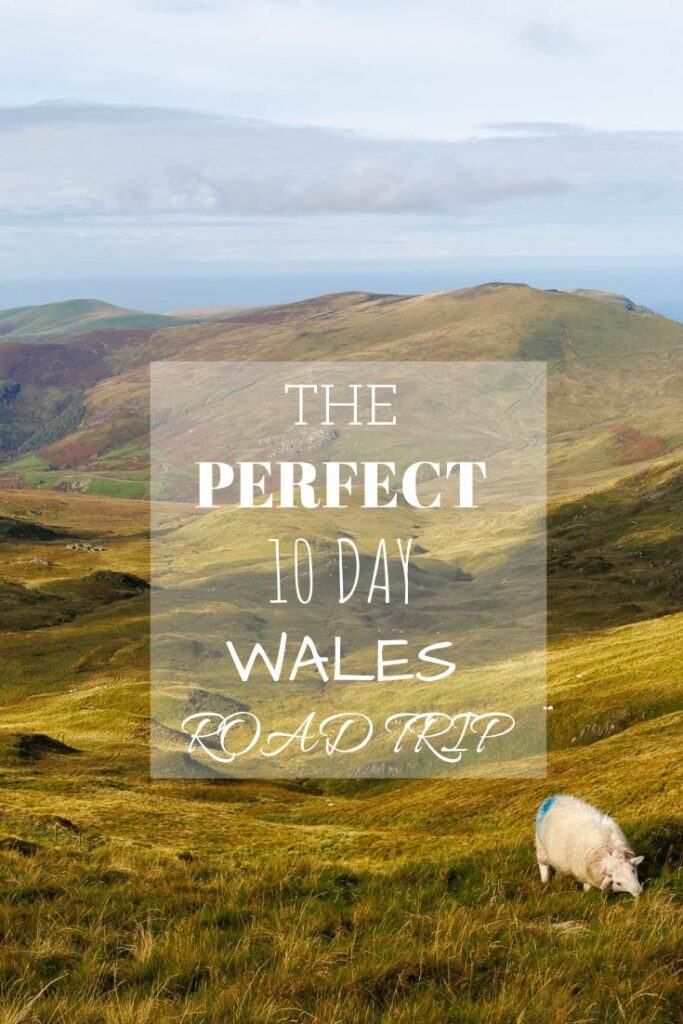Despite being born in Wales and spending many years living in the country, I haven’t as yet shared any content about Wales on this site. Well, that is about to change.
Wales is a spectacular country with a lot to offer and its relatively small size means that you can see a lot in a 1-week road trip. In this guide we’re going to share our idea of the perfect Wales road trip if you have 7 to 10 days.
This itinerary includes a little bit of everything Wales has to offer, which includes stunning coastlines, mountain hikes, beaches, castles, museums, Welsh cultural attractions, and more. The itinerary was designed to give you a taste of the best of Wales and includes everything from tiny rural villages to the capital city of Cardiff.
Wales really does have something to offer everyone, and this road trip is going to take you all around Wales. We’ll share some of our favourite things to see and do, and also offer tips on where to stay, and what to eat. But you can of course adjust it how you want.
Personally, we think Wales has scenery to rival other popular road trips in the UK, like Scotland’s North Coast 500, but we will let you decide if that’s the case as you read the guide.
By the end of this post, you’ll be ready to set off on your very own Welsh road trip! Let’s start by answering some questions you might have.
How Long to Road Trip in Wales?
Wales is not a huge country, but there is a huge amount to see. We would say that the minimum amount of time for a road trip covering a part of the country would be three to five days. If you don’t have a lot of time we’d perhaps suggest focusing either on North Wales or South Wales.
If you want to see more of what is on offer, and explore the country from top to bottom, then we’d recommend at least 7 – 10 days.
The itinerary in this guide is for a 7 to 10-day road trip, but of course you can adjust it based on your interests and time. If you have more time, there is always more to see and we’d recommend spending longer in each area of interest.
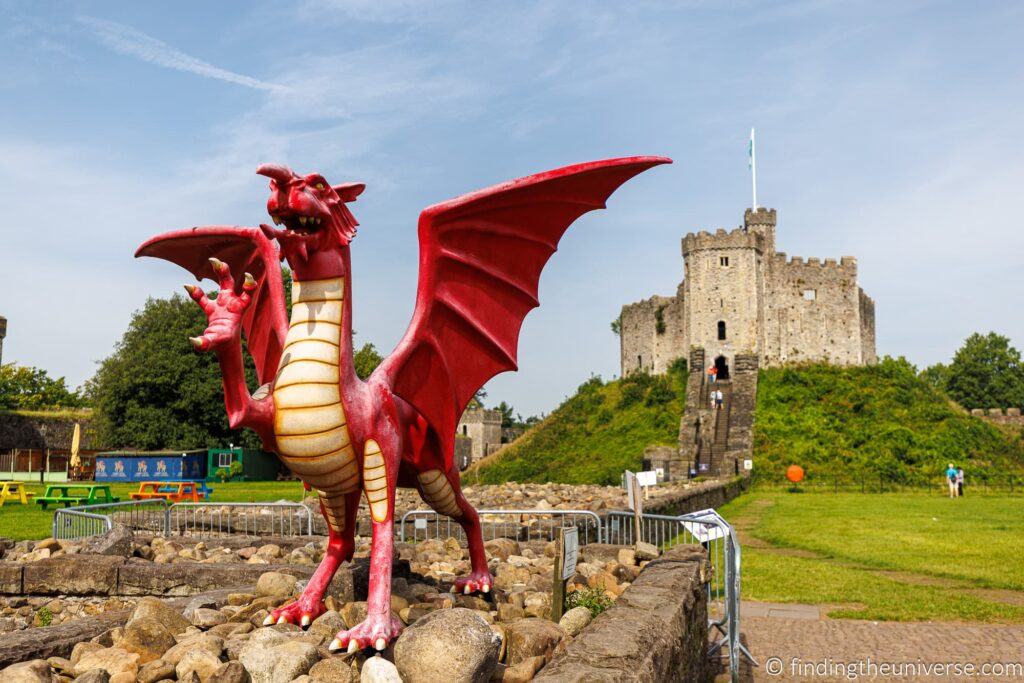
How to Include Wales as Part of a Longer UK trip?
Many people are visiting Wales as part of a longer tour of Great Britain that may also include England, Scotland, Northern Ireland, and/or Ireland. It is easy to include Wales as part of a larger trip.
Again, we’d recommend at least 3 days if you want to visit Wales and if you only have 3 to 5 days we’d just stick to focusing on either North Wales or South Wales.
But ideally you’ll have at least 5 to 7 days to devote to Wales if you want to see a number of its highlights covered in this itinerary.
If you are following our 2 week UK itinerary, you can add time in Wales. Around day 3 or 4 of that itinerary, I’d start this Wales itinerary and follow Days 1 through 8 and then head north to Chester and then up towards Manchster.
See our detailed UK itinerary guide for more information on that.
If you are also wanting to visit other parts of the UK or Ireland as part of a tour, you might consider joining up tours such as with local tour company Rabbie’swhere you can take a series of tours exploring different parts of England, Wales, Scotland, and Ireland.
What’s the Best Way to Get Around in Wales?
There are a few different options for getting around in Wales, including local buses and a regional train network. However, as the title of this post suggests, my recommended way to travel around Wales is by car.
There are a great many sights and attractions in Wales that can really only be visited in a vehicle as there’s no public transport to reach them. Think remote castles, far-flung stretches of coastline, and so on.
The road trip we’ve put together is based on you having a car. If you don’t have your own car, we’d highly recommend picking up a car rental, or consider joining a tour.
As it’s more cost effective to pick up and drop off a car in the same spot, we’ve chosen Cardiff as the best location to start and end this trip. Cardiff can be easily reached by rail and coach from locations around the UK.
On a recent trip to Wales we rented a car from Enterprise as they had a location near Cardiff’s main train station, which made pick up and drop off easy. However, we’d also recommending using a price comparison service like Rental Cars or Discover Cars, to see if there’s a better option for your trip.
If you would prefer not to drive, then we would instead suggest looking into taking a tour of Wales. These can be done as private tours or you can join a group tour and the tours.
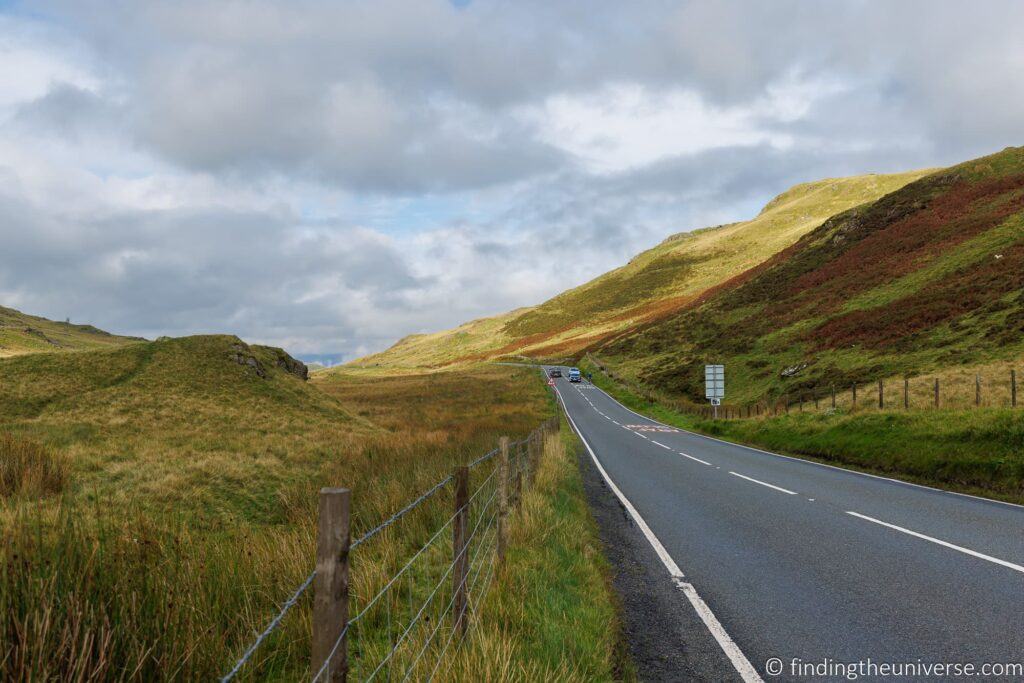
Tours of Wales
If you like the idea of visiting Wales but would rather not drive, then your best option is to take a tour. Whilst there is some public transportation, many of the sights and attractions are a little off the beaten track and aren’t well served by public transport.
There are however some excellent tours we can recommend. Whilst none of them will exactly mirror our suggested Wales road trip itinerary, a lot of them do include at least some of the main attractions we cover.
You can join a guided tour or if you have a bigger budget or a large group, you might also consider a private tour. The longer Wales tours generally depart from London, Bristol, or Cardiff.
Some we suggest are as follows:
- This 5 day road trip with Rabbies would be our first pick of available tours. We’ve taken a great many tours with Rabbie’s and we love their knowledgeable driver guides and small group sizes. This tour departs from London and cover a lot of the same ground as our route, from Snowdonia down to south west Wales.
- This 8 day tour from Cardiff follows a similar route to our suggested Wales itinerary, and includes time in Cardiff, the Brecon Beacons mountains, Snowdonia National Park, Conwy Castle, St. Davids, Tenby, and the Pembrokeshire Coast National Park.
- This 3 day tour with Rabbies departs from Bristol and focuses on the highlights of south Wales, including Carreg Cennen Castle, Hay on Wye, St. Davids, Tenby and the Pembrokeshire Coast National Park. If you have more time, you can also do their North Wales tour.
- This 3 day tour with Rabbies departs from Bristol and covers the highlights of North Wales. It includes Snowdonia National Parks, Conwy Castle, Harlech Castle, the Slate Museum, and Portmeirion.
There are of course more tours to choose from in Wales. See this selection from a range of operators on TourRadar which will let you sort and filter by duration, places visited and price.
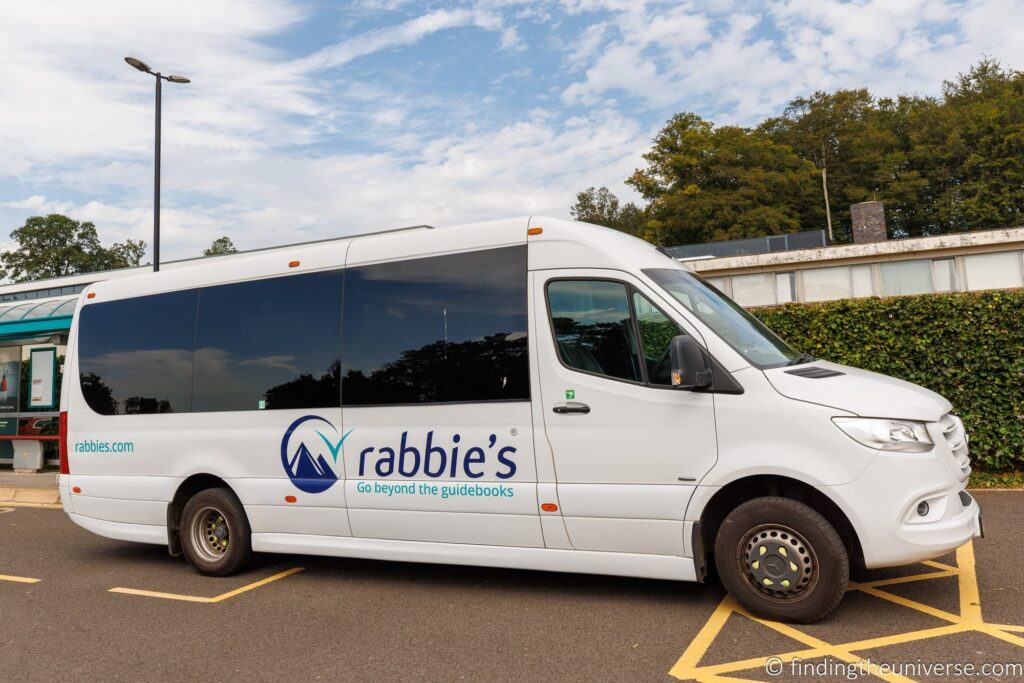
10 Day Wales Road Trip Itinerary
Ok, let’s get on with this road trip around Wales! The reason we say this road trip is 7 – 10 days is because I have added a couple of days in Cardiff at the beginning.
The Welsh capital city has a lot to offer, from excellent museums to castle ruins and sporting attractions.
There’s certainly enough here to fill at least two days. However, if you have less time or would rather just hit the road and not focus on city attractions, you may prefer to focus on the road trip section of this itinerary rather than the time in Cardiff. It’s up to you!
Jess and I did this exact road trip, with two full days in Cardiff and then eight days on the road around Wales. We started and ended in Cardiff. It was a brilliant trip, and one we are delighted to be able to share with you.
Parts of this road trip follow the Wales Way driving tour routes (you can see more about those here), which are promoted by the Visit Wales tourism board to highlight some of the best scenery and attractions that Wales has to offer.
They include The Cambrian Way, The Coastal Way, and The North Wales Way. You’ll be driving sections of all these routes using our itinerary but we have adjusted it to also include many of my other favorite sights and attractions.
Note that this itinerary covers a lot of ground and each day has a number of suggested attractions. Depending on your interests you will want to adjust it to suit what you really want to see and do rather than trying to do absolutely everything.
If you want a more slower paced trip, we’d suggest seeing less each day and spending at least 2 nights at each location. You could easily do this full itinerary in 2 weeks and have more time to relax and see things more slowly.
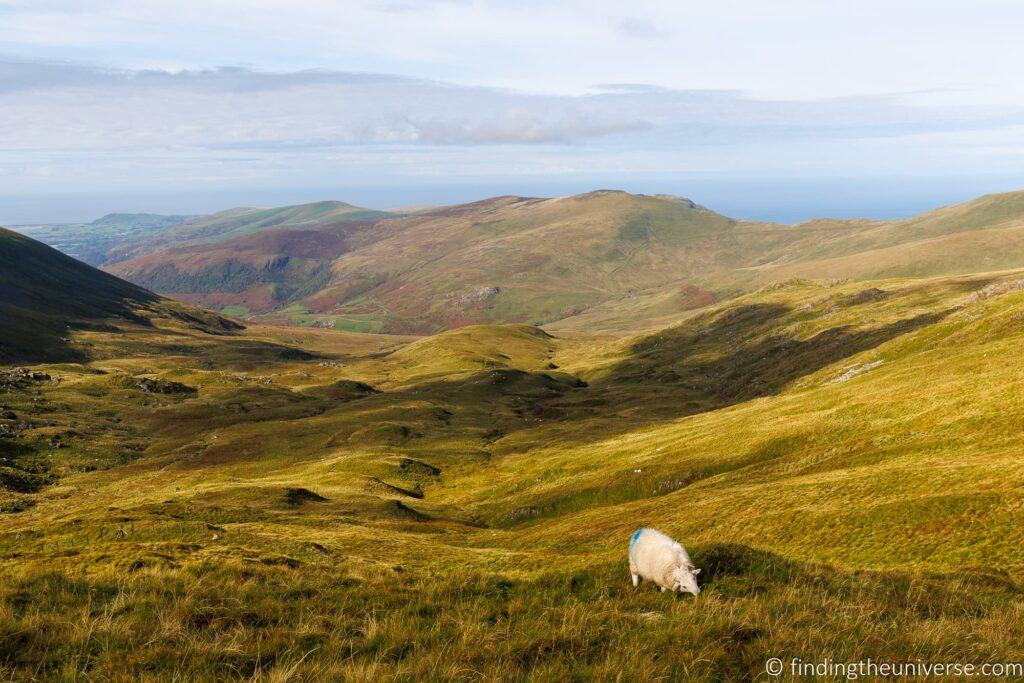
Day 1 – Cardiff
Your first day has you starting in Cardiff, the Welsh capital since 1955. Cardiff is easy to get to from locations around the UK and abroad, with rail, road, and air links that will let you get here in the way that best suits your trip.
We’d suggest that for your time in Cardiff you get around either on foot or by public transport. The majority of attractions in the city centre are easy to walk to, or to visit by bus. I’d advise against driving around the city centre as you’ll have to deal with navigation and finding parking.
On your first day in the city, our recommended first stop would be the Museum of Cardiff.
This excellent free museum tells the story of the city over the centuries, from the Neolithic period to the present day. It’s an excellent way to orient yourself to the city and get up to speed with its history. It is one of our favourite museums in Cardiff.
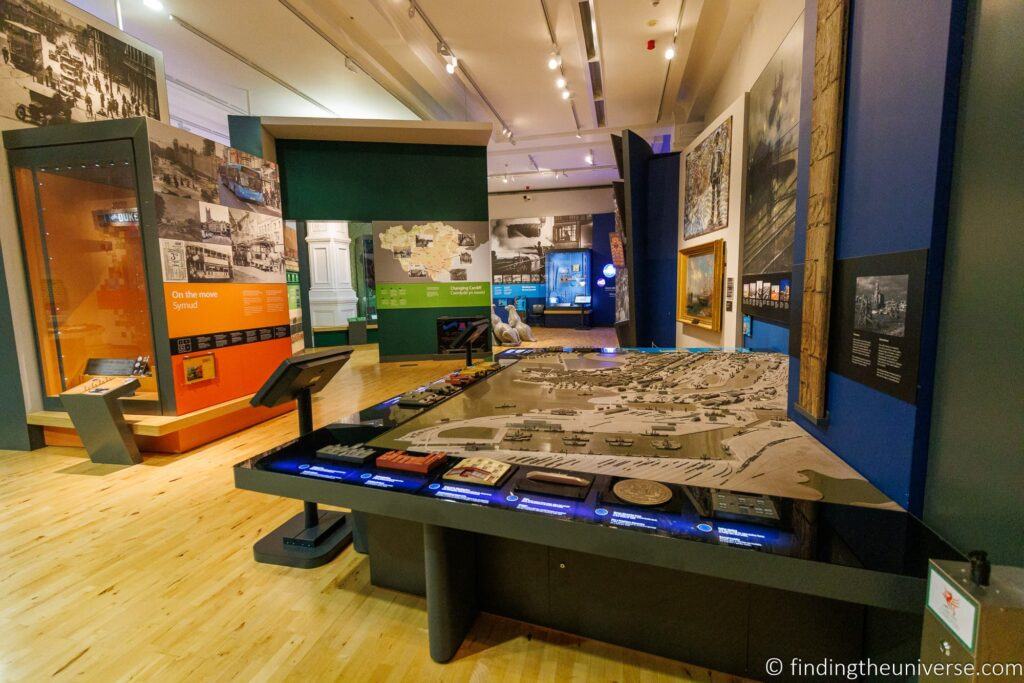
Next, we’d recommend popping across the road to the Cardiff Market. This is a 2 storey Victorian shopping mall, opened in 1891, where you’ll find a variety of shops selling all manner of goods.
There are also food stalls here if you are hungry.
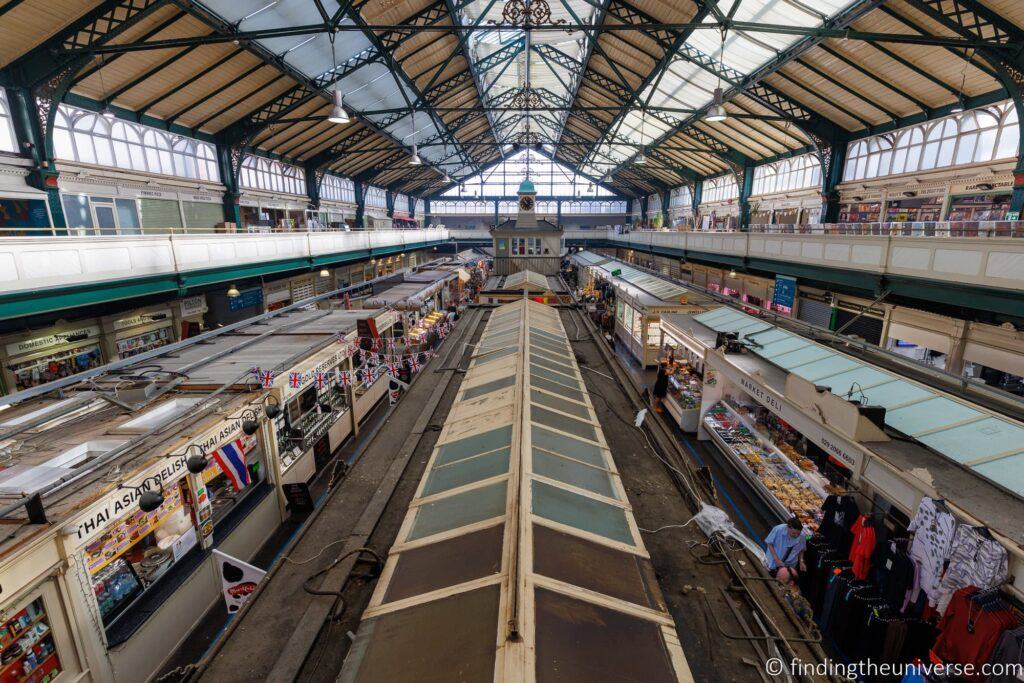
From Cardiff Market, continue north to Cardiff Castle, your next stop for the day.
On this road trip, you are going to see quite a few castles. Wales has a landscape that lends itself to building castles, and a history of princes and wars that required these defensive structures. In fact there are over 400 castles in the country! So you do need to be selective in which castles you choose to visit.
However, we’d argue that you’re not going to see anything quite like Cardiff Castle anywhere else on your Welsh road trip.
Cardiff Castle takes you on a journey of castle building through the ages. There has been some sort of fortified construction here since the Romans built a fort here in the 3rd century. In fact, part of the old Roman wall can still be seen.
However, the large stone keep atop the hill that will catch your eye as you walk in dates from the 12th century.
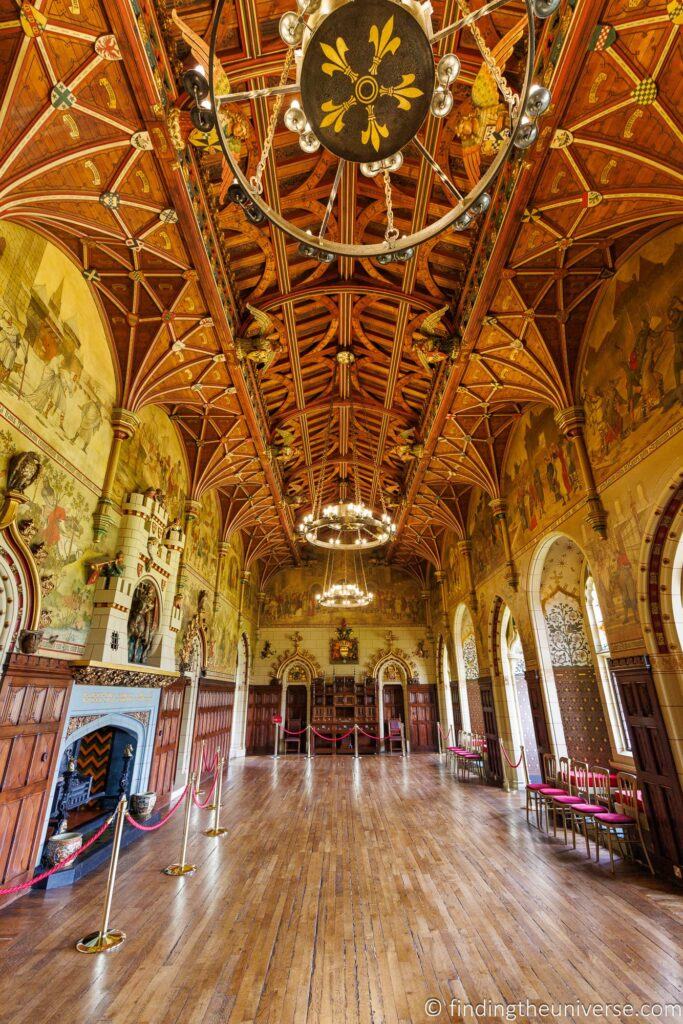
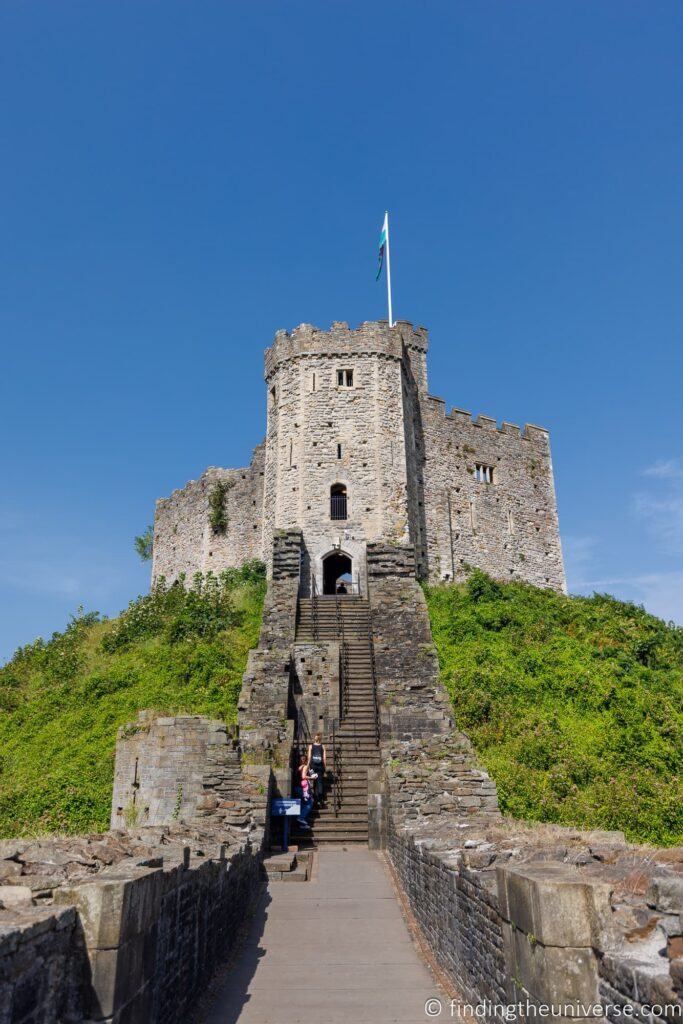
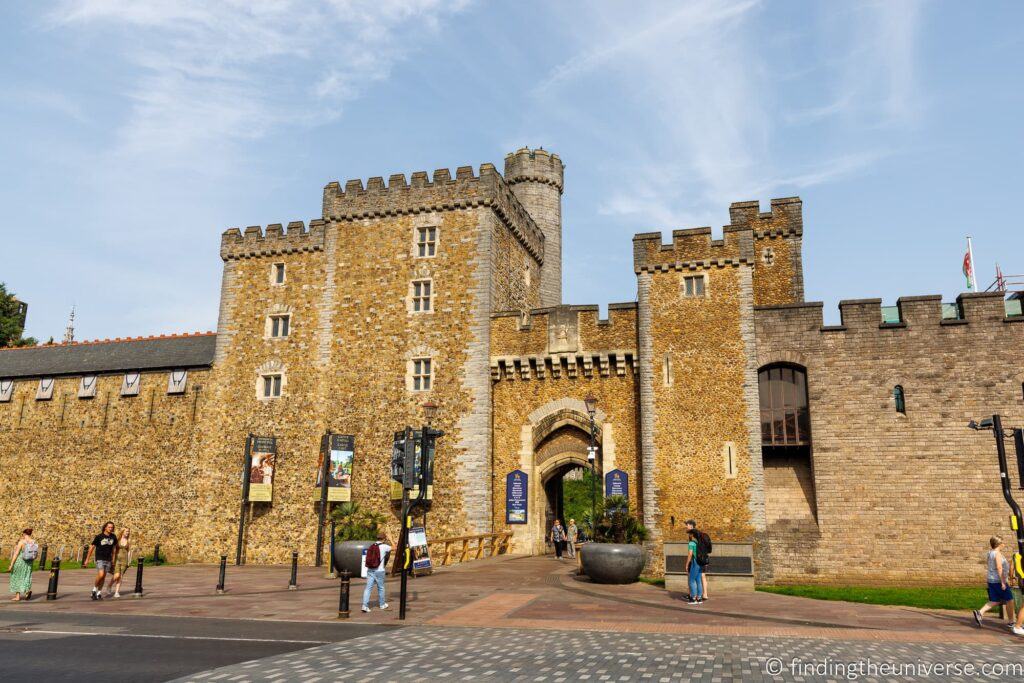
Around the rest of castle grounds you’ll find a range of buildings from various periods in history, including a 19th century gothic revivalist addition that includes a massive clock tower and stunning interiors.
There is a lot to see and do at Cardiff Castle, including various tours and exhibits that range from world war two air raid shelters to a regimental museum. We’d recommend planning on spending at least two or three hours here as there is lots to see here.
You can walk through the grounds of Cardiff Castle for free, but to go inside, walk the walls, or visit the exhibits you will need to pay for a ticket. The ticket price is well worth it in our opinion.
Depending on how your day is going you may still have time for another sight. If so, we’d suggest walking over to the National Museum Cardiff. This large free museum (donations welcome) has exhibits of art, natural history and geology, and is a good way to finish off your first day in Wales.
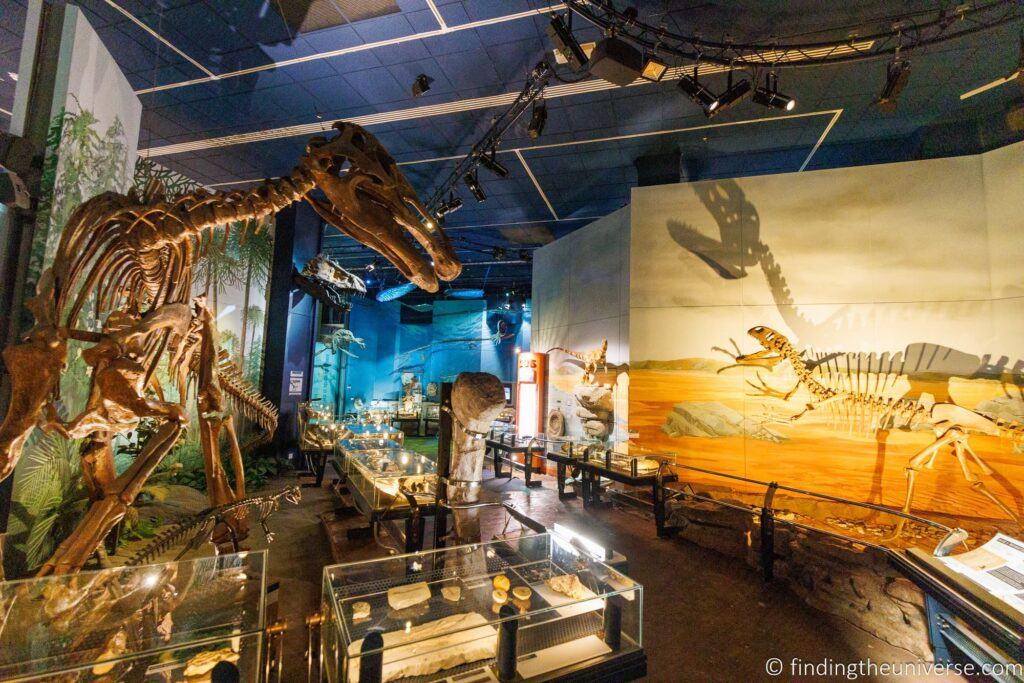
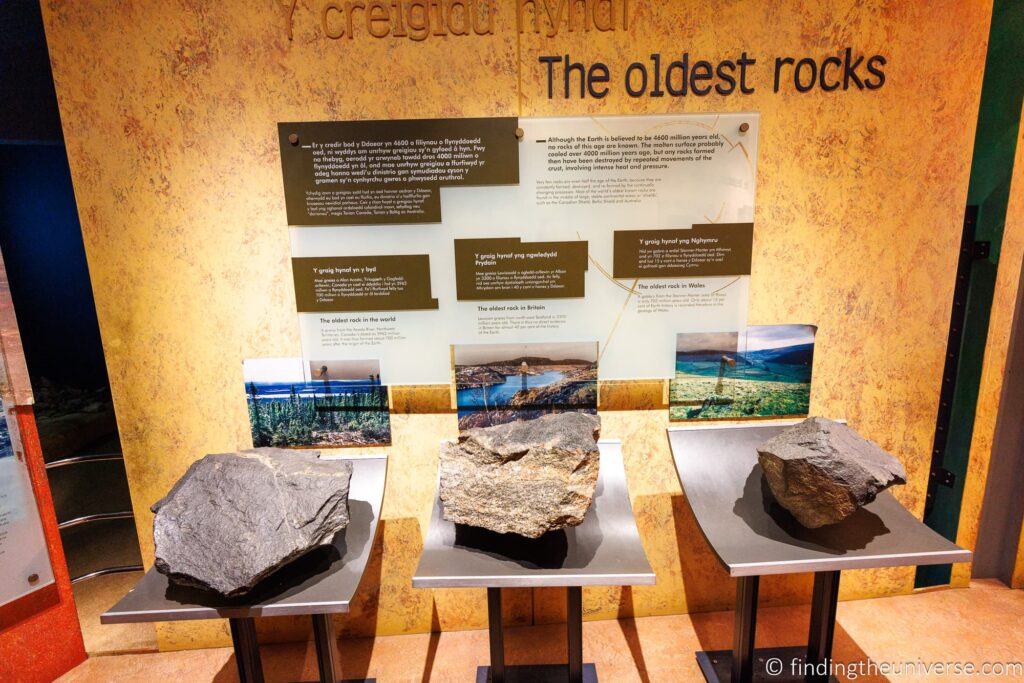
Day 1 Highlights: Museum of Cardiff, Cardiff Market, Cardiff Castle, National Museum of Cardiff
Day 1 Driving Distance: 0 miles
Day 1 Driving Time: 0 hours
Day 1 Accommodation: On your first night we’d recommend staying in central Cardiff. This will be convenient for sightseeing, as well as for eating out. Here are some suggested options to consider:
- City Center apartment – This is a lovely apartment just minutes walk from the city center and train station. We’ve stayed here and can recommend it.
- Sleeperz Hotel Cardiff – a good value centrally located hotel offering air conditioned rooms, restaurant, and bar
- Hotel Indigo Cardiff – a nice hotel in a great location with air conditioned rooms, restaurant and bar. We have stayed at a number of Indigo branded hotels and always had a good experience.
- Clayton Hotel Cardiff – a well reviewed hotel next to the train station with clean and comfortable rooms
- Parador 44 – a beautiful upmarket boutique B&B style hotel with its own garden right in the center of Cardiff
Day 2 – Cardiff
If you’d prefer to head out of town today you can of course do that, and spend more time on the road. However, assuming you would like to do some more sightseeing in Cardiff we’re going to recommend you head to the Cardiff Bay area of town.
Cardiff is located on the Bristol Channel, although you won’t have seen the water yet as the city center area is about a mile away. However, you can easily reach this area in a 20 minute walk or a short bus ride.
The Baycar bus (service 6) runs from central Cardiff to the Cardiff Bay area four or five times an hour and the journey is just a few minutes. Alternatively, you might prefer to take the Cardiff hop on hop off bus which will also bring you here as part of its sightseeing route around Cardiff.

At Cardiff Bay there is plenty to see. First, you will likely see the large Wales Millenium Centre. This national arts centre is a venue for the performing arts and is the place to come to see live performances of everything from music to dance. There are also shops, bars, and cafes on site, and it’s worth popping inside to see if there are any temporary exhibits going on when you visit.
From here you can walk across to the Roald Dahl plaza. Named for the famous children’s books author who was born in Cardiff (books include Charlie and the Chocolate Factory, James and the Giant Peach, and Matilda), this sunken plaza often plays host to various fairs, festivals, and live music performances.
You’ll now be near the waterline. If you head east, you’ll first pass the Pierhead building, a huge red brick building with a clock tower which is hard to miss. This is home to a museum where you can learn about the history of Wales.
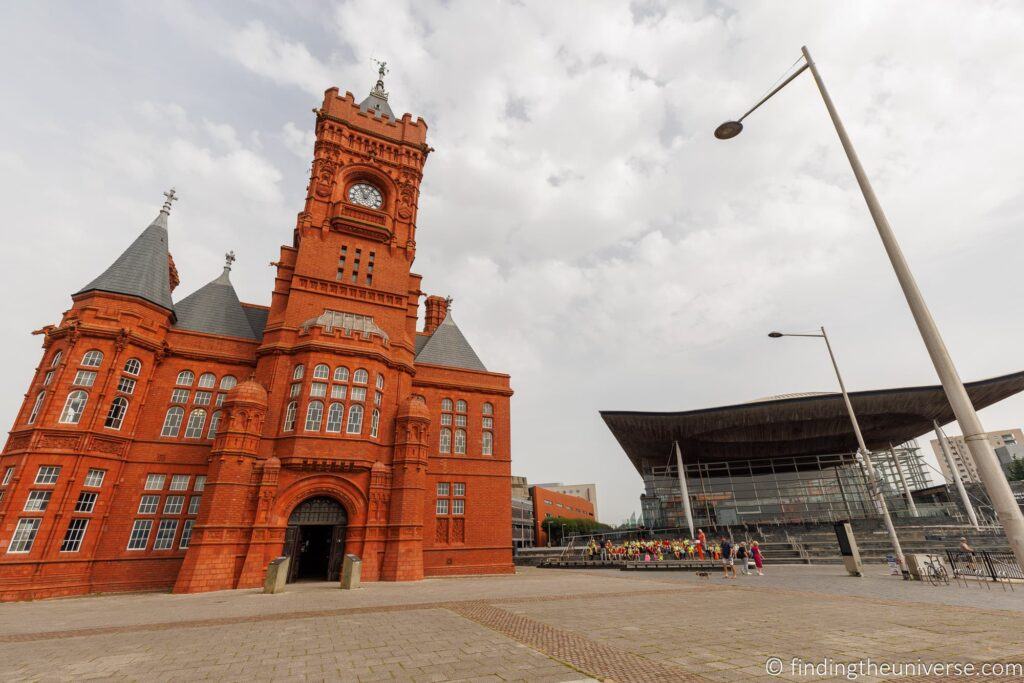
Next door to the Pierhead building is the Senedd building, home of the Welsh parliament. This is a striking modern building which you can visit if you are interested in learning about the process of democracy in Wales. There are also often exhibitions of Welsh art and crafts inside, so it’s well worth taking a stop here.
From the Senedd, you can continue along the coastal path to the east on the Cardiff Bay trail walk. There are various highlights along the route, including the Norwegian Church Arts Centre which offers a cafe, lovely views of the Bay, and an art gallery.
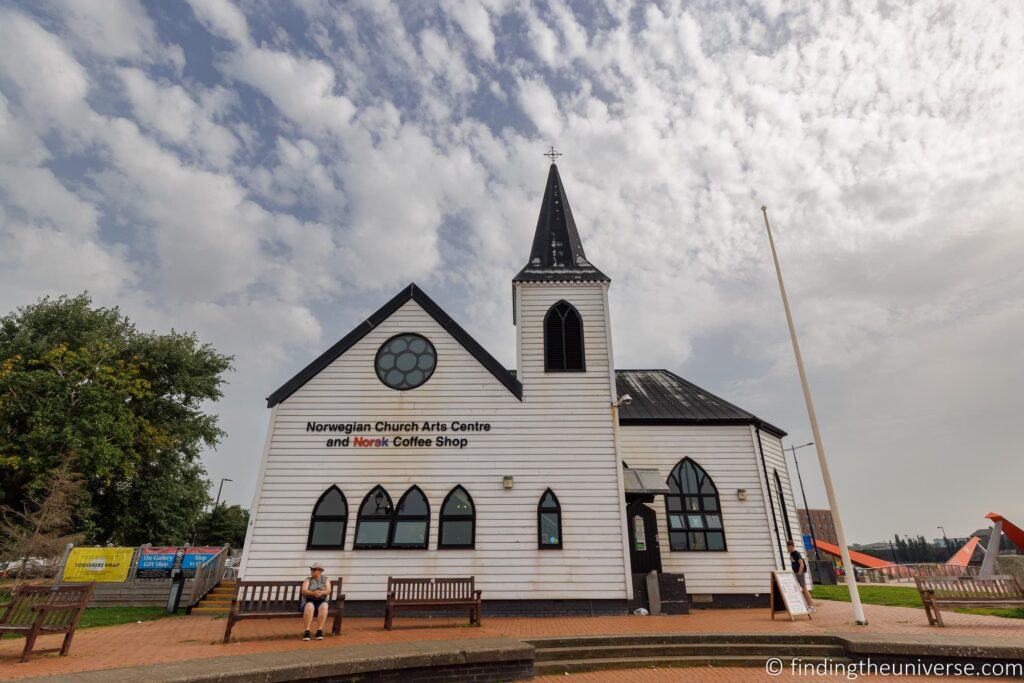
It’s up to you if you want to continue at this point. The trail continues for miles along the bay and if it’s a nice day it’s certainly a lovely walk all the way to the Cardiff Bay Barrage. It was the construction of the barrage in the 1990s which created this lovely harbour area.
From here, rather than walk all the way back, you can instead hop on a boat that will take you back to the Quay area. You’ll definitely want to check the operating timetables in advance, which you can do here. You can book tickets online in advance here.
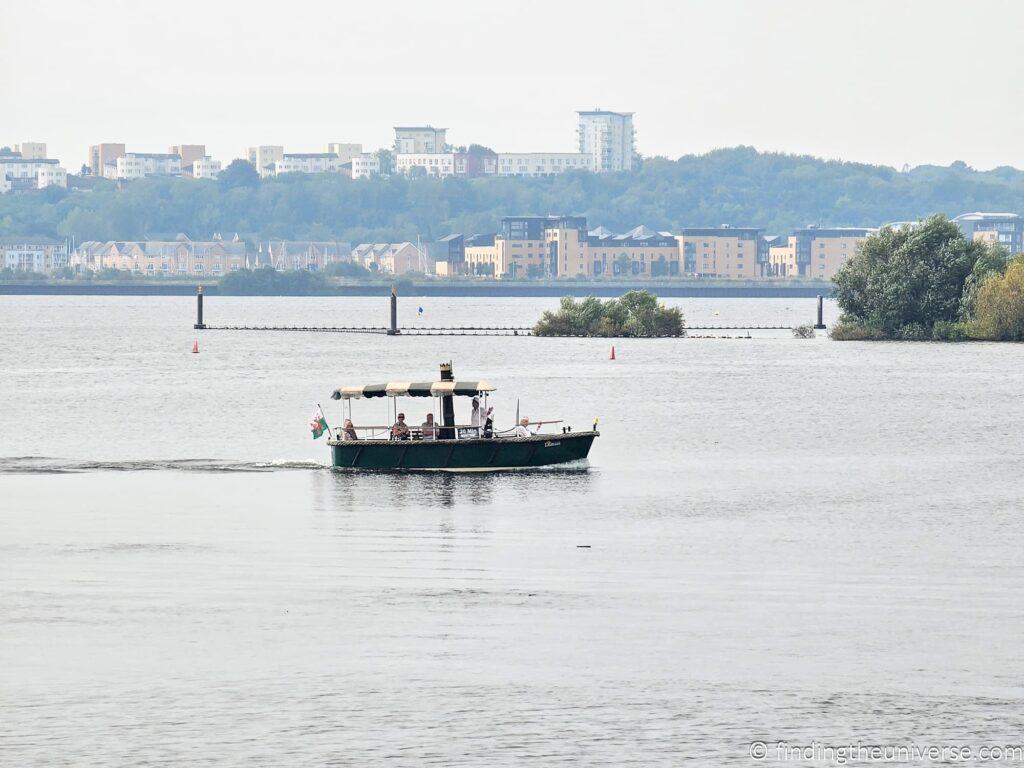
Of course, instead of (or as well as!) walking all the way to the barrage you can explore the area around the Senedd, known as Mermaid’s Quay. Here you’re going to find all manner of shops and restaurants, as well as a boat quay where you can take boat tours of Cardiff Bay.
There are also a couple of other attractions in the area. First is the rather eclectic Ianto’s Shrine. If you are not familiar with the TV show “Torchwood”, which was set in Cardiff, then this will likely be somewhat confusing. The shrine is to Ianto, a character who dies in the show.
It’s actually one of the largest and most well-maintained shrines to a fictional character anywhere in the world, so worth a few moments of your time!
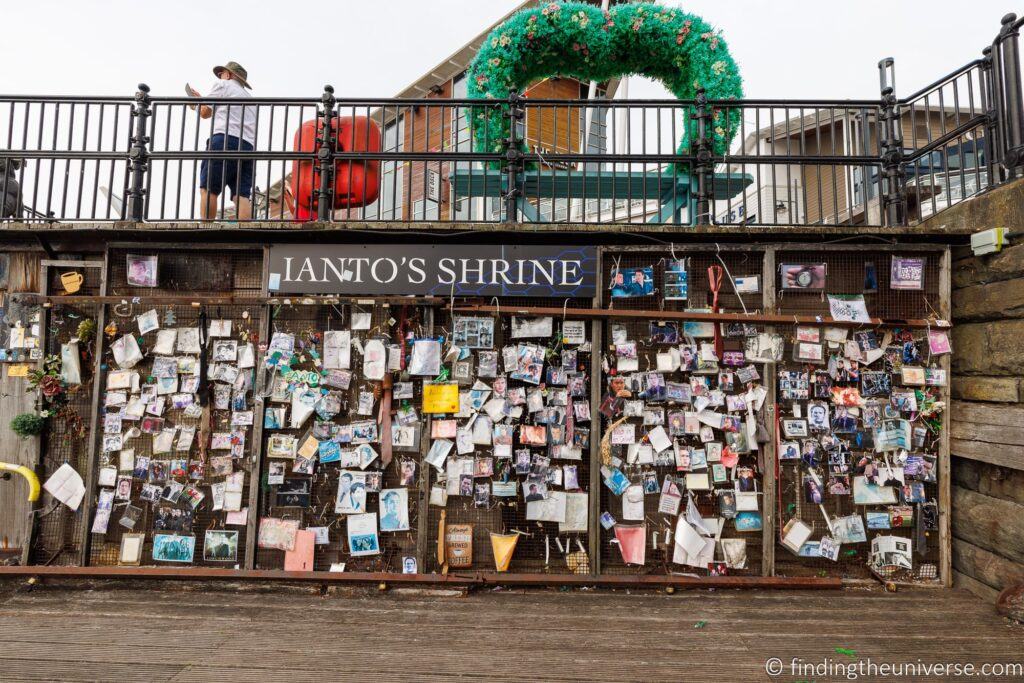
The other attraction in the area is Techniquest, which is a family-friendly science museum. If you are visiting Wales with kids, then this paid attraction will definitely keep them entertained for some time as there are over 100 hand-on exhibits to see, touch, and explore.
That feels like enough for your second day in Cardiff, although there is still plenty to see including more museums and plenty of shops. Cardiff is also home to the Principality Stadium which plays host to major sporting and music events throughout the year.
There are also lots of other venues around the city for live music and entertainment if that is something you are interested in. On a recent visit to Cardiff we enjoyed watching a live performance at Porter’s Cardiff for example.
And of course there are a lot of pubs, clubs, and other nightlife hangouts in Cardiff. If you’re into historic pubs, some of the oldest in Cardiff are The Rummer Tavern, Cardiff Cottage, The Goat Major, and The Great Western. So you will have no shortage of places to go for a drink or a bite to eat!
Day 2 Highlights: Cardiff Bay, Wales Millenium Centre, Norwegian Church Arts Centre, Bay boat tour / walk, Techniquest
Day 2 Driving Distance: 0 miles
Day 2 Driving Time: 0 hours
Day 2 Accommodation: Overnight in Cardiff (same as Day 1)
Day 3 – Cardiff to Tenby
It’s time to hit the road! If you are picking up a rental car, you’ll want to book this for earlier in the morning as you’re going to have a busy day today.
Your first stop for the day is just outside of Cardiff, the St. Fagan’s National Museum of History. It’s about 20 minutes’ drive from central Cardiff.
This is a brilliant free outdoor museum which features over forty original buildings spread out across 100 acres of parkland. These buildings span a wide time period, and will give you a real insight into how Welsh people have lived, worked, learned, and played over the years.
There are farmhouses, schoolhouses, pubs, and union buildings, the majority of which you can go inside and explore. It’s also a living museum, with live workshops and demonstrations of traditional skills and crafts like ironmongery and farming.
It’s a big site with a lot to see, so we’d recommend planning on spending at least 90 minutes to two hours here. There’s also a cafe on-site which serves good food as well as coffee and other hot drinks. There’s a large carpark on site with a modest fee for parking.
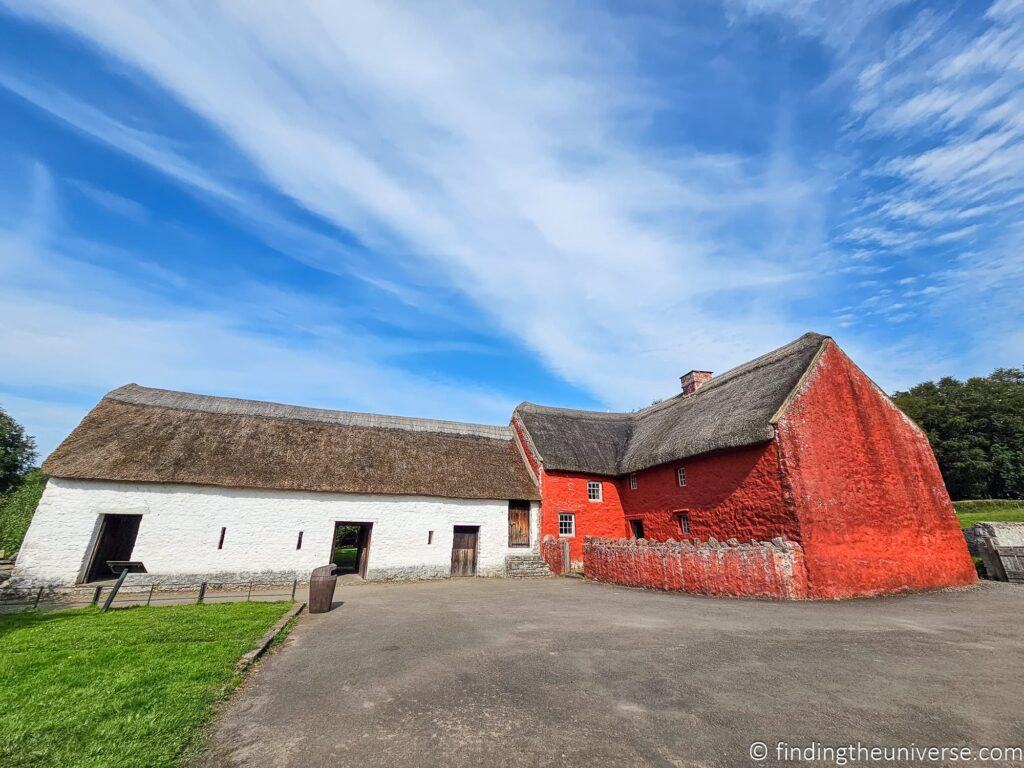
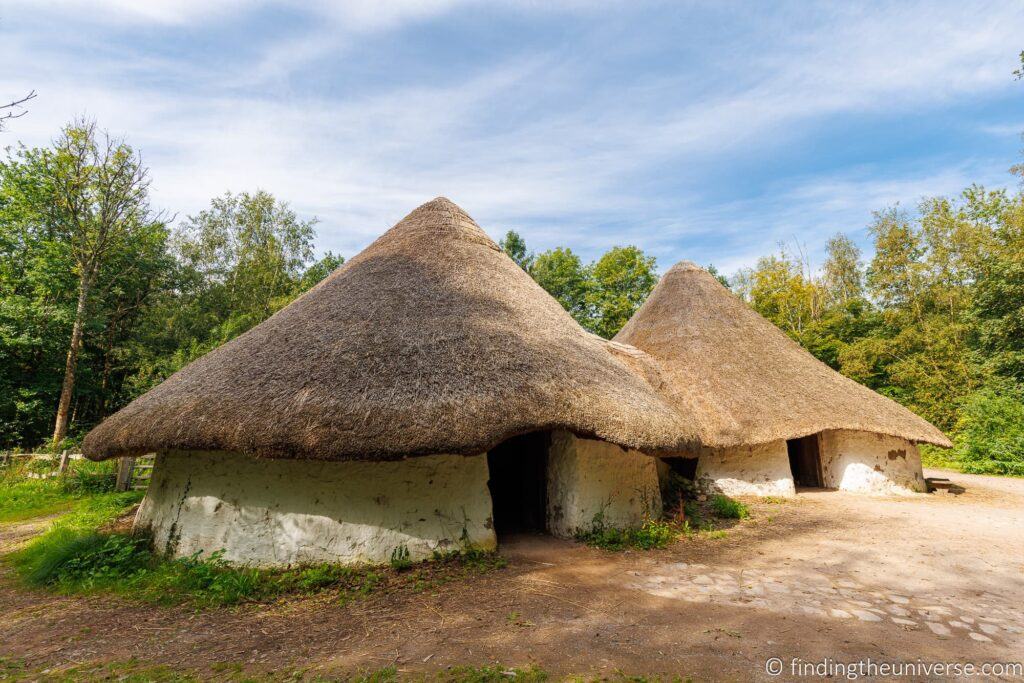
From Cardiff you are going to continue to head west to your next stop, Castell Carreg Cennen.
The fastest option to get to here will normally be to follow the M4 around Swansea, which is what we would recommend you do. Of course, if you would prefer a more scenic route feel free to follow the roads up to Glynneath and across. Just be aware of timing as you have a lot to see today.
Castell Carreg Cennen, or Carreg Cennen Castle, is a dramatically positioned crumbling castle which dates from the early 14th century. There’s a bit of an uphill walk to get to the castle, but we’d say the views of the surrounding landscape and the castle itself are well worth the effort.
Quite a bit of the castle survives, including many of the towers, walls and keep. There are information panels on site and there’s an excellent cafe at the bottom of the hill where you park as well. We’d estimate you’ll need around an hour on site.
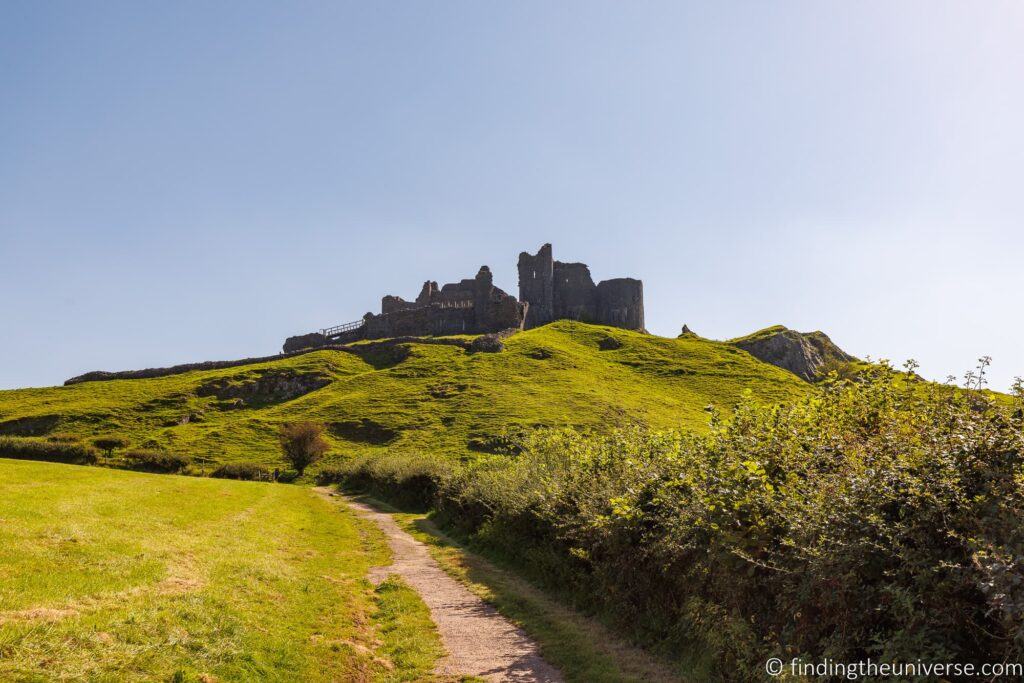
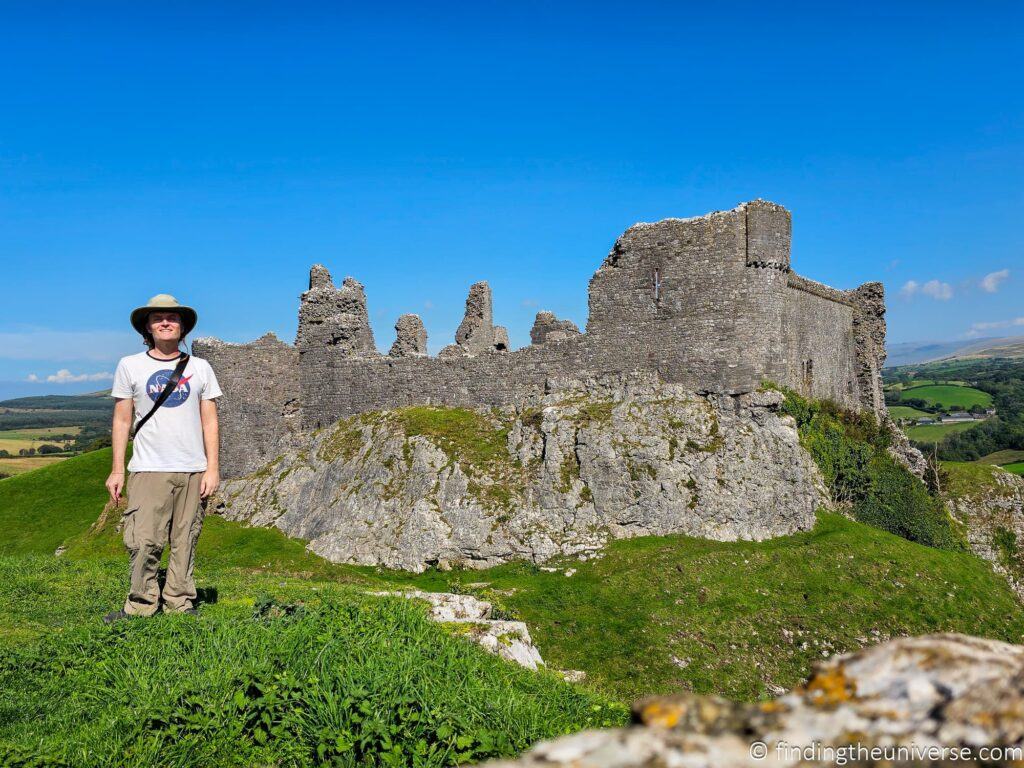
Cadw offers an annual membership, which gives you free entry to all the Cadw locations, amongst other benefits.
A lot of the sights you’re going to be seeing on this trip are going to be covered by the membership and if you visit the majority of them you will definitely save some money. You can buy this online here, or in person at most Cadw sites.
We think this is very much worth it and we always get a CADW membership if we plan on sightseeing in Wales.
From Castell Carreg it’s a 20 minute drive to the next stop for the day, the National Trust Dinefwr site. This is actually two sights, the 17th century Newton House and the 12th century Dinefwr Castle, found around a mile apart.
If the weather is good, we can highly recommend taking some time to explore the grounds here and to walk up to Dinefwr Castle. There are some really lovely walking trails around the grounds, which wend their way through beautiful mature woodlands.
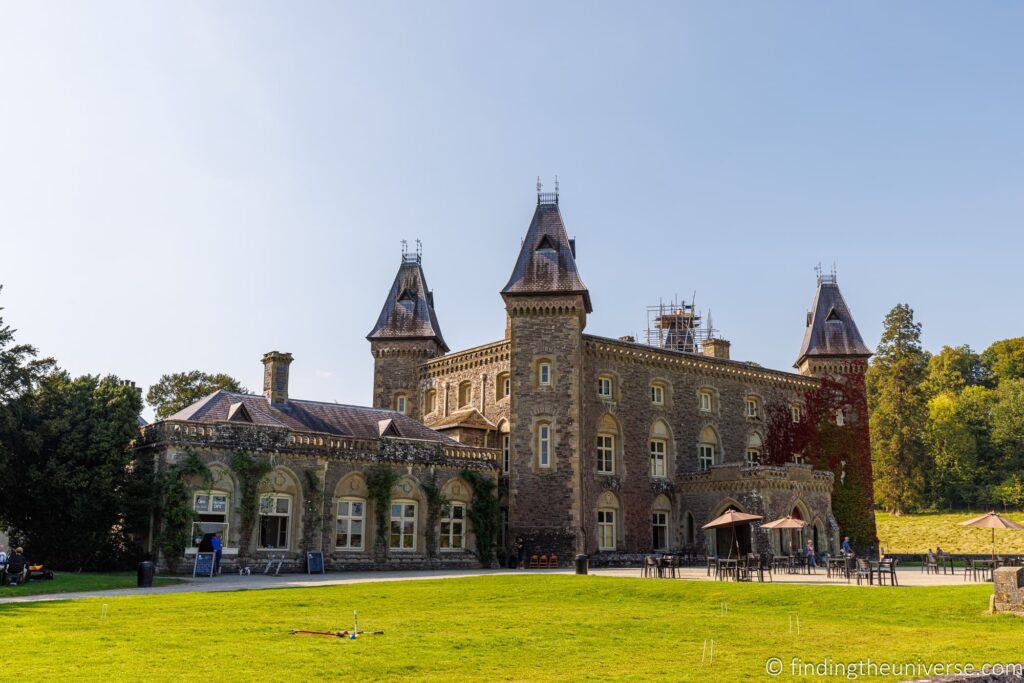
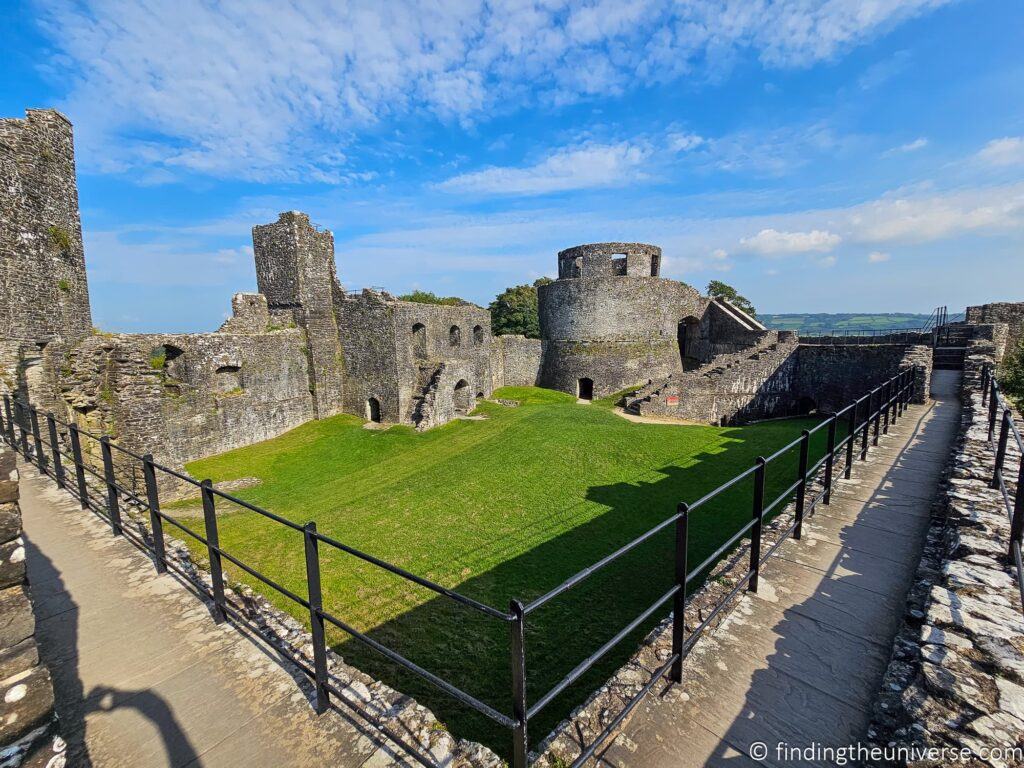
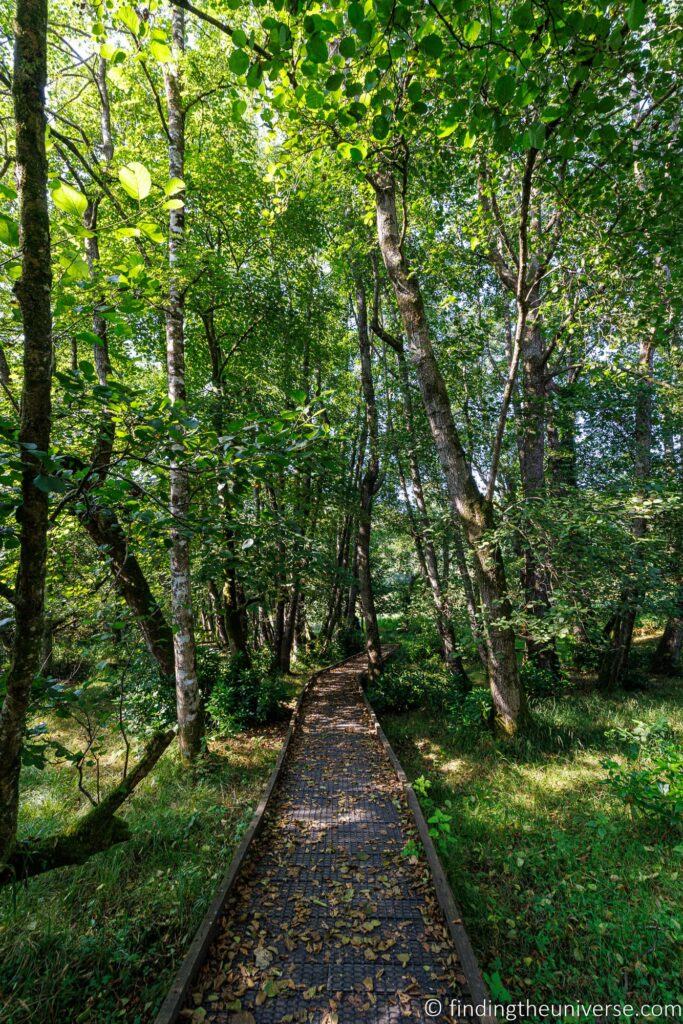
You can also visit Newton House itself of course, which has a separate entry fee (free for National Trust members). There is paid parking on site (also free to National Trust members).
It’s around an hour’s drive to the last stop of the day, the cute seaside town of Tenby. If you want something extra to see on the way, and you really love castles, feel free to detour to Laugharne Castle, although we feel you may have seen enough castles for the day and be ready to relax by this point.
Tenby is a popular and picturesque seaside town with colorful houses forming a line above the large beach and curved harbour. There are lots of places to eat, shop ,and stay. If you are not too tired, we’d recommend a stroll to the headland to see the ruins of Tenby Castle and a walk on the beach.
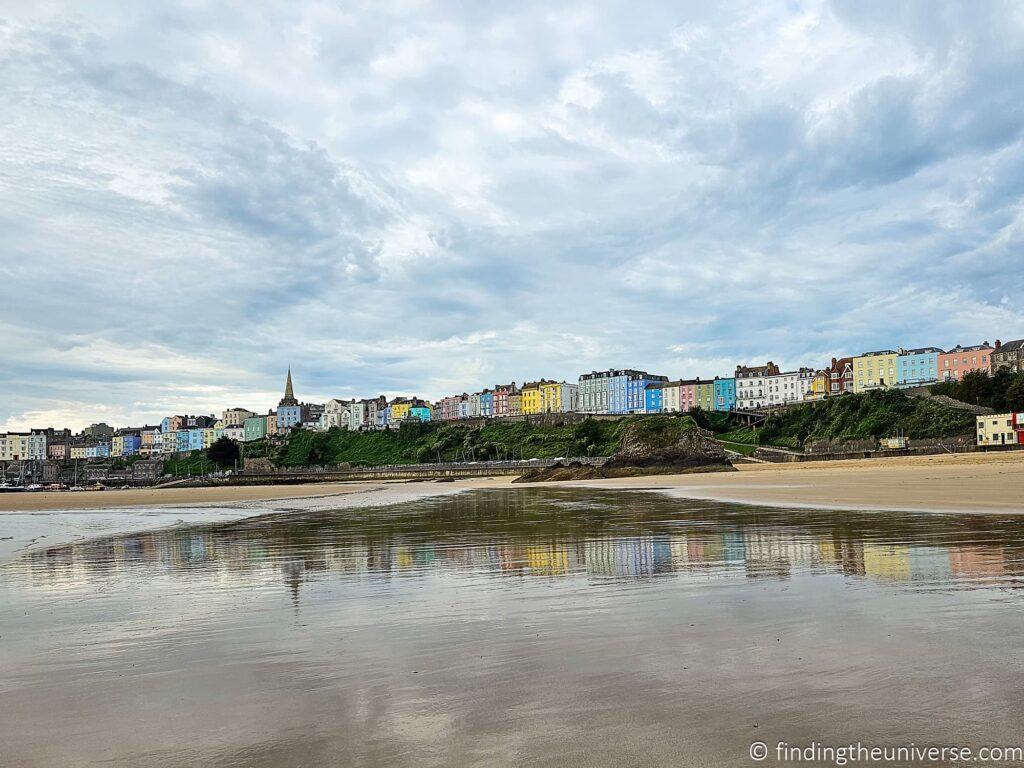
Of course, you can also do these things on the morning of your fourth day as well. And that’s the end of your first day on the road!
Day 3 Highlights: St. Fagan’s National Museum of History, Castell Carreg Cennen, Dinefwr Castle, Tenby
Day 3 Driving Distance: 110 miles
Day 3 Driving Time: 2.5 hours
Day 3 Accommodation: Overnight at (or near) Tenby. There are a lot of excellent options to choose from in Tenby and nearby, and the town also has many good dining options. Accommodation options we recommend are:
- Beachcomber B&B – five minutes walk from the centre of Tenby and the beach, this very well rated family run B&B offers comfortable rooms and an excellent breakfast
- The Strathmore – this well rated family run B&B is close to Tenby’s south beach and five minutes walk from the town centre. Comfortable rooms include a continental breakfast or breakfast bap.
- Coach Guest House – a very well rated modern family fun B&B just minutes walk from Tenby’s beaches and attractions. Breakfast is included.
- Trefloyne Manor – five minutes drive from Tenby, this beautiful old manor house offers 12 gorgeous rooms with en-suite facilities. There’s an on-site restaurant, breakfast is included and there’s even an on-site 18 hole golf course
Day 4 – Tenby to St. David’s
Today you’re going to be exploring the far southwestern corner of Wales, home to the smallest city in the UK and a stunning coastal National Park.
Let’s get going.
From Tenby, take a 15 minute drive west to Carew Castle & Tidal Mill. As the name suggests, here you’re going to find two attractions in one place.
The first is Carew Castle, a castle which dates from the Norman conquest of Britain in the 11th century. Over the years it has had many updates and improvements, with the final addition being an Elizabethan manor house in the 16th century! That makes this quite the unique location to visit in Wales.
The second attraction on the site is the Carew Tidal Mill, which is the only restored tidal mill in Wales. This dates from the 19th century, and when in operation it used the power of the tide to power the mill wheel. It’s no longer operating but it is open for tours.
As you can see there is plenty to see and do here, so I’d suggest allocating at least 90 minutes – 2 hours for your visit. There is free parking on site and a fee for admission. It’s not part of Cadw or any other membership program that we are aware of.
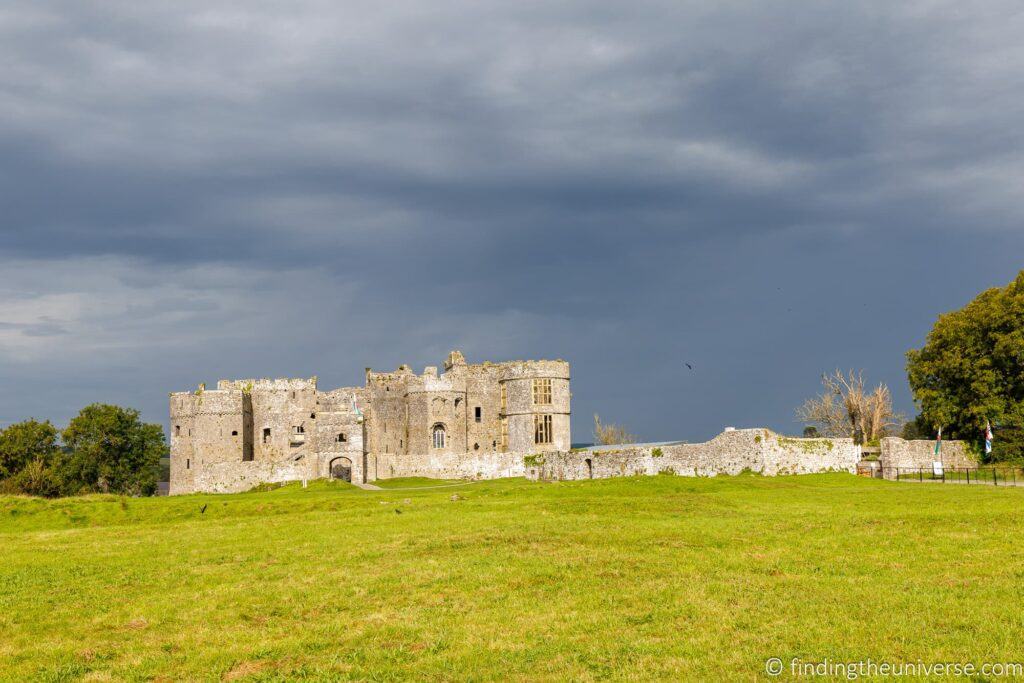
From Carew Castle you have a few options, all of which involve visiting the Pembrokeshire National Park. This National Park stretches all around the Pembrokeshire coast and offers dramatic clifftop walking, splendid sea vistas, and wildlife spotting opportunities.
One good walk opportunity, around a 25 minute drive from Carew Castle, is the Stack Rock walk (carpark here on Google Maps). The car park (free) is just a couple of hundred metres from the cliff top walk, and there are great views of some rock stacks as well as a rock arch here.
This is also a good place to see seals and seal pups in the breeding season (usually August through January).
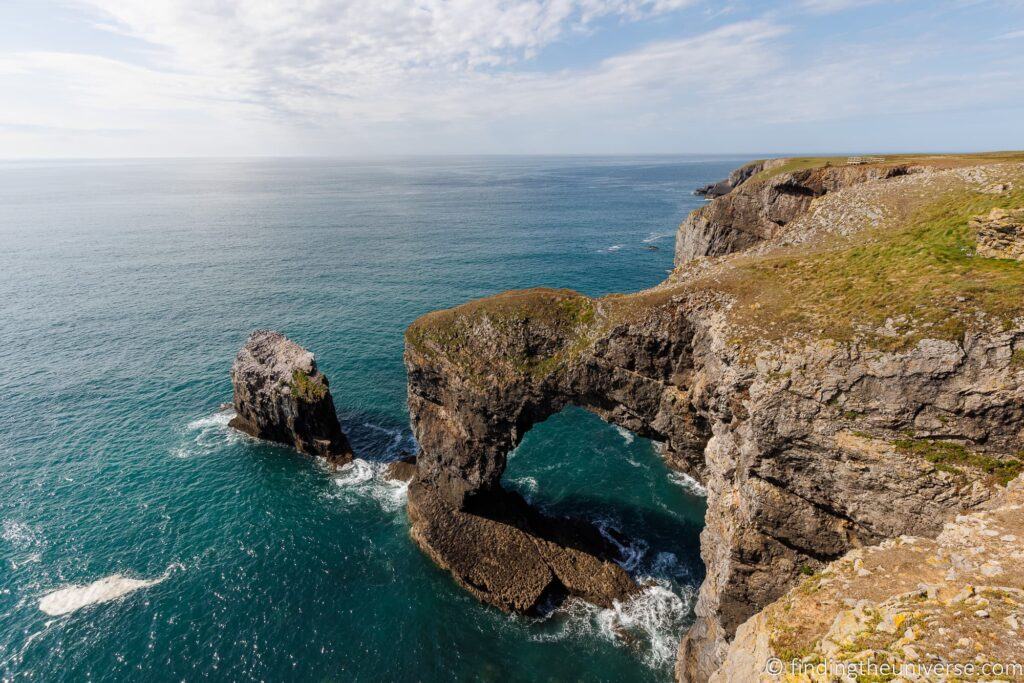
If you’d like to take a hike here, there’s a lovely walk along the coast to St. Govan’s Chapel. It’s a 6.3 mile walk, and you can see directions here.
Another option if you’d prefer to spend more time on the beach would be to drive further west to Freshwater West beach. This is a popular surfing spot where you’ll find a long stretch of golden sand backed by dunes.
It’s also a Harry Potter filming location – fans of the movies will definitely want to visit the site of Dobby’s Grave. There is a mound of rocks here which fans have written tributes on, which makes for a nice picture. There’s a small car park here as well as parking along the road.
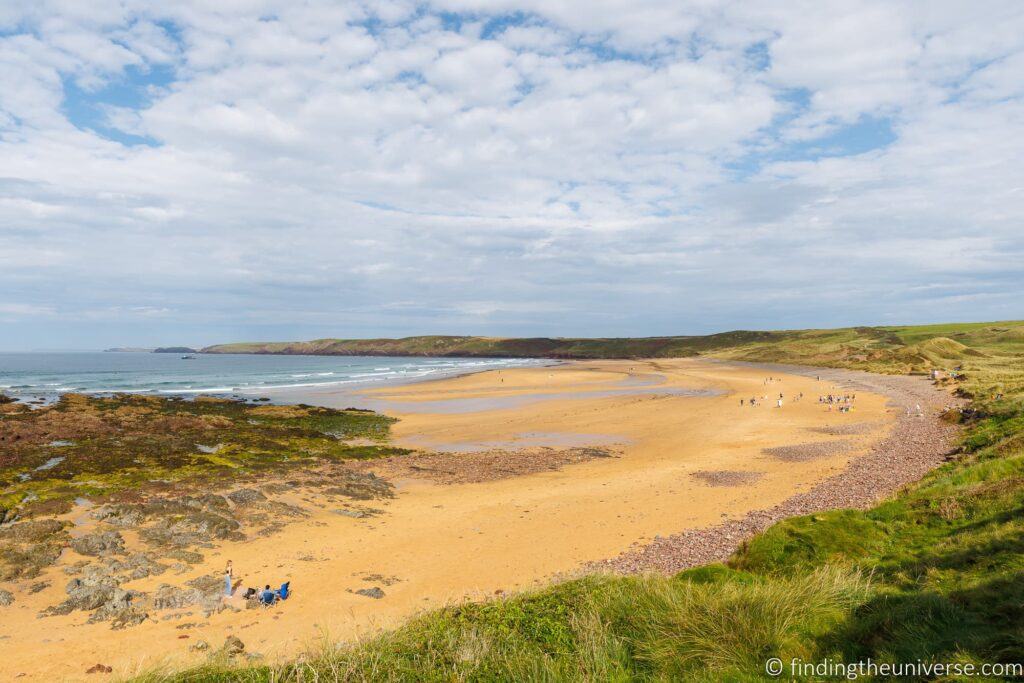
There are of course many other walks that you could do today as you head towards St. David’s, and you can see a full selection here.
My personal favourite, and the one I would recommend, is the Marloes Peninsula walk. This is about an hour’s drive from the Stack Rocks carpark, or 25 minutes from Carew Castle, depending on what you choose to visit today.
The Marloes Peninsula walk is a 4.4 mile (7.1km) loop walk which loops around the gorgeous Marloes peninsula. The walk is largely flat with just a few gradients to tackle. There’s a car-park at Marloes Sands (paid).
This walk was my favourite of all the walks we did in this area because it offered such spectacular views, as well as some excellent wildlife spotting opportunities. We saw countless seals and seal pups as well as a great many sea birds.
There were also gorgeous coastal views and even an iron age hill fort. It took us around 3 hours in total with lots of photo stops and was well worth the effort.
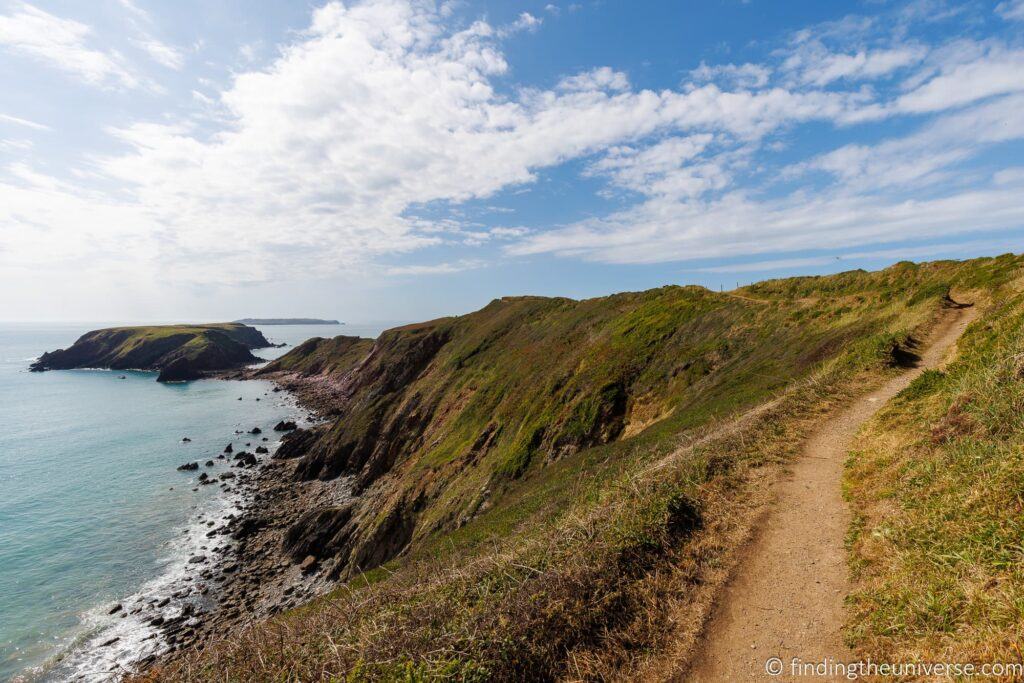
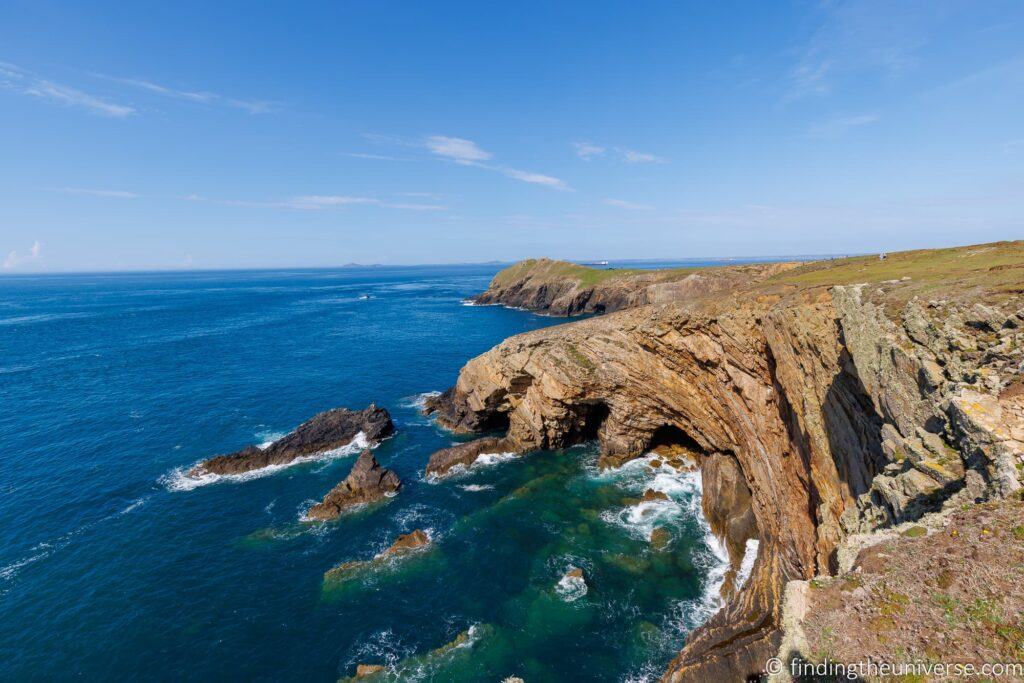
From Marloes, another hour’s drive will bring you to the tiny city of St. David’s where you’ll spend the night. Definitely spend some time exploring the town, either this evening or on the morning of Day 5.
You’ll find a lovely old cathedral, as well as various galleries and shops. The city is tiny, and it doesn’t take long to walk around and explore.
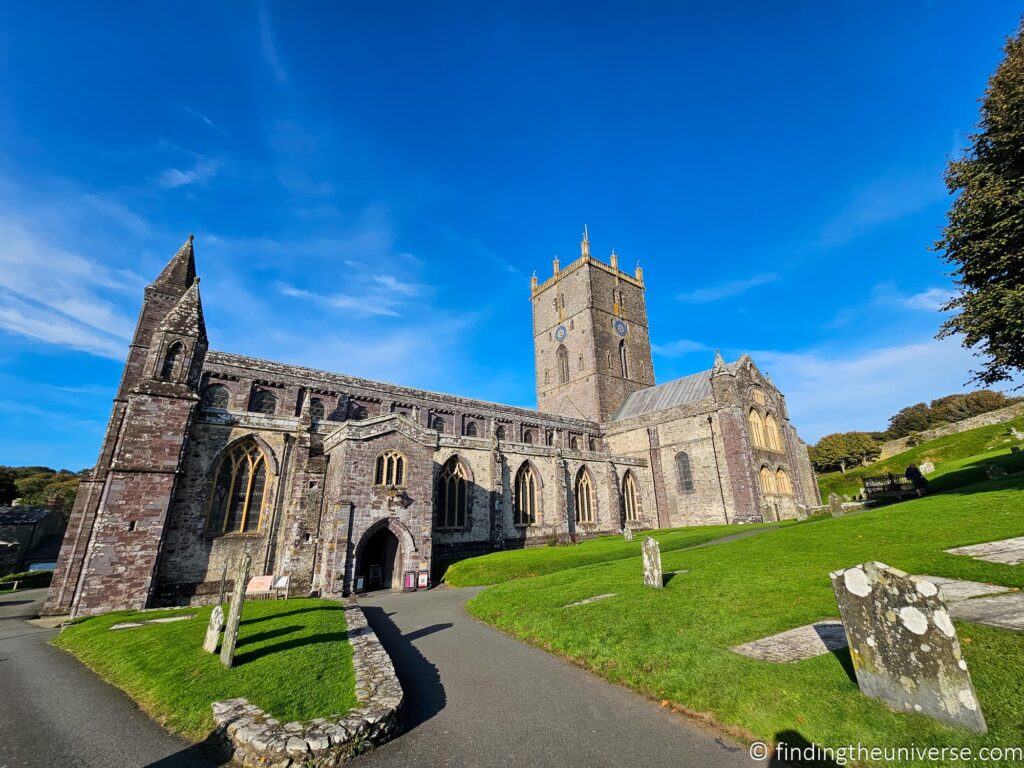
If you still want to explore, then we’d suggest walking the 20 minutes or so out of town to St. Non’s Chapel and Well, reputed to be the birthplace of Wales’s patron saint, Saint David, for whom the city is named.
Another nearby attraction is the stunning beach of Whitesands, which makes for a good place to watch the sunset.
For food, there are plenty of good dining options in town, from restaurants to pubs. We’ve had a great pub meal at The Bishops, but the Farmer’s Arms is also a popular option for pub food.
We’d recommend asking your local accommodation provider for tips as they’ll know the best local options open during your visit.
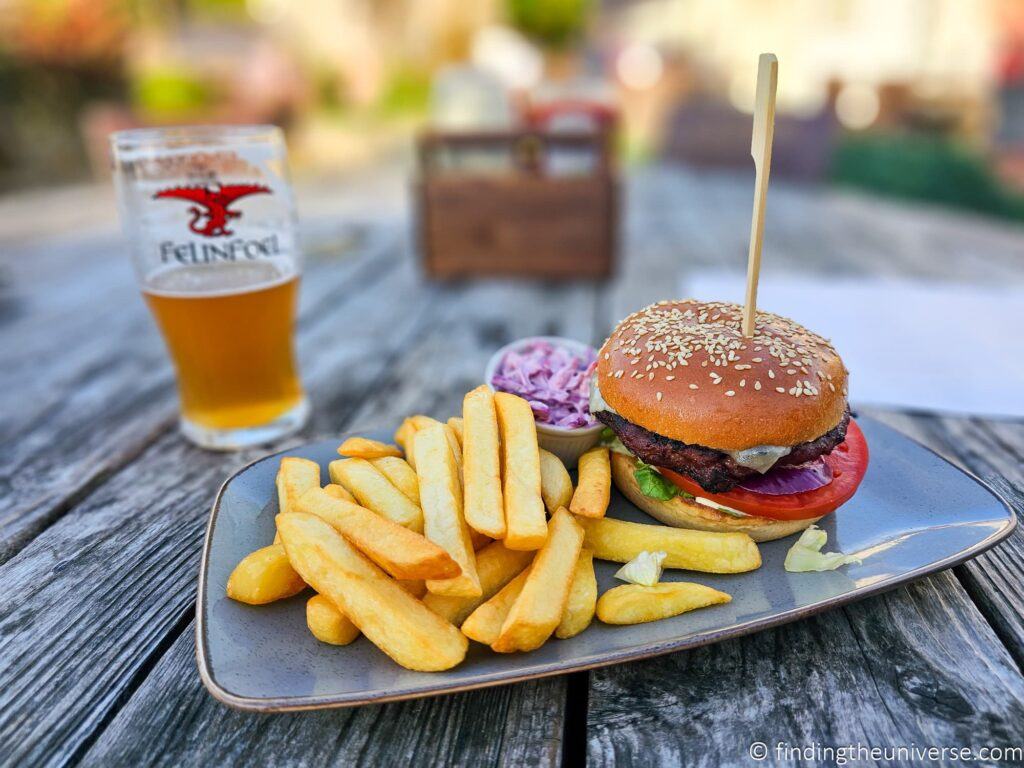
Day 4 Highlights: Carew Castle & Tidal Mill, Pembrokeshire Coastal Walks, St. David’s sights
Day 4 Driving Distance: ~ 70 miles
Day 4 Driving Time: ~ 2 hours
Day 4 Accommodation: Overnight at (or near) St. David’s. This beautiful little city has a range of accommodation options as well as a number of pubs and restaurants for food. We recommend the following options:
- Four Winds B&B – this is a lovely B&B just five minutes walk from the centre of St. David’s. Owner Nikki is very friendly, breakfast is excellent and there are lovely views. We’ve stayed here and had a lovely night’s sleep.
- Glendower B&B – a well reviewed B&B just a few minutes walk from the city center. Breakfast is included.
- St. David’s Cross Hotel – a popular traditional hotel right in the city center featuring a restaurant and bar. Breakfast is included.
- Twr y Felin Hotel – a very well reviewed centrally located 4* hotel with a restaurant, room service, and breakfast.
- Crug Glass Country House – a beautiful country house hotel found in a 12th century farmhouse on a 600 acre working farm. 8 minutes drive from St. David’s. There’s an on-site restaurant and bar, and breakfast is also available.
Day 5 – St. David’s to Aberystwyth
Today you’re going to drive up the sweeping curve of Wales’s west coast. There’s plenty to see along the way, including ancient burial chambers, iron age villages, ruined castles, a wildlife center, beautiful beaches, and more.
We’d suggest picking some sights that sound the most interesting to you from our suggestions as there is definitely more to see than you can do in a day! Or consider doing this over 2 days if you want to do and see everything. If you opt to do that, we’d suggest overnighting around Cardigan.
After finishing up any sightseeing or souvenir shopping in St. David’s, follow the A487 for about 45 minutes, just past Fishguard. The first stop for the day is the Pentre Ifan burial chamber.
This 5,000 year old tomb has a 16.5ft capstone carefully balanced atop three uprights. It’s a couple of minutes walk from the free parking place on the road and entry is free. Just be aware that there the parking spot is quite small and the road here is quite narrow.
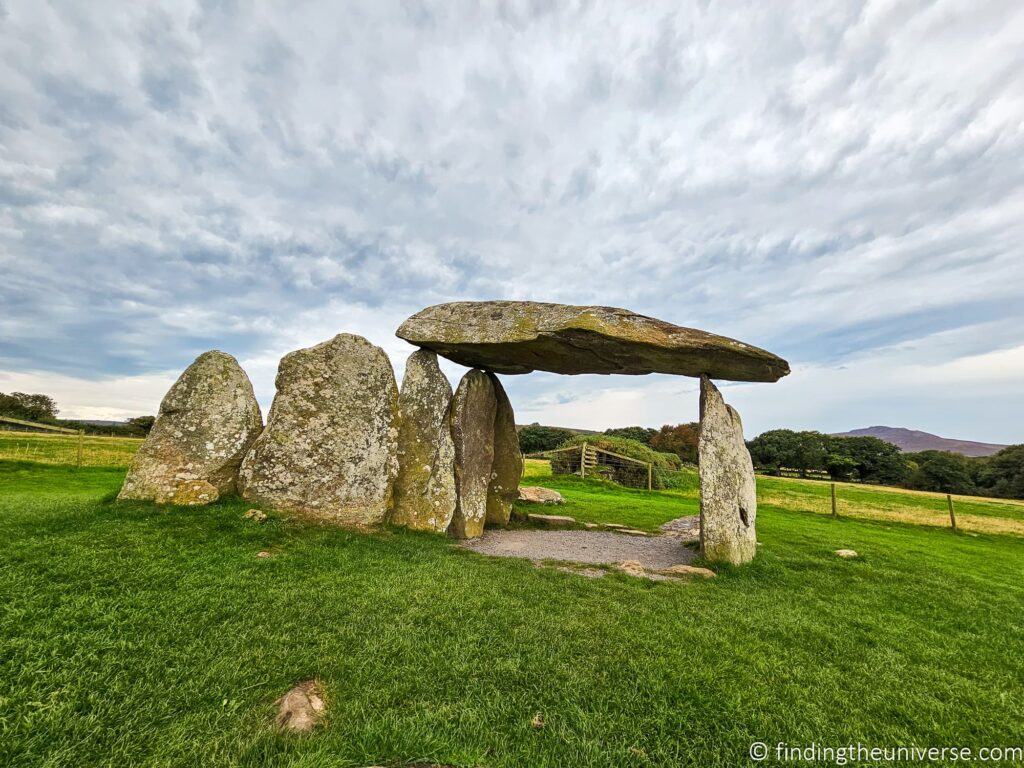
From Pentre Ifan, return to the main road. If you are interested in learning about life in the Stone Age, then definitely consider a visit to Castell Henllys Iron Age Village.
This attraction features a series of Iron Age roundhouses, constructed where they originally stood 2,000 years ago. On site you will find a number of costumed interpreters who will share details of how people lived here during the Iron Age.
Now, continue on towards Cardigan. There are a few sights you might consider stopping at, depending on your interests.
Nature lovers will likely want to visit the Welsh Wildlife Centre, where there’s an interpretive center, various trails, and bird watching hides. It’s free to visit but there’s a small fee for parking. A good location for birdwatching on the Tefi Marshes.
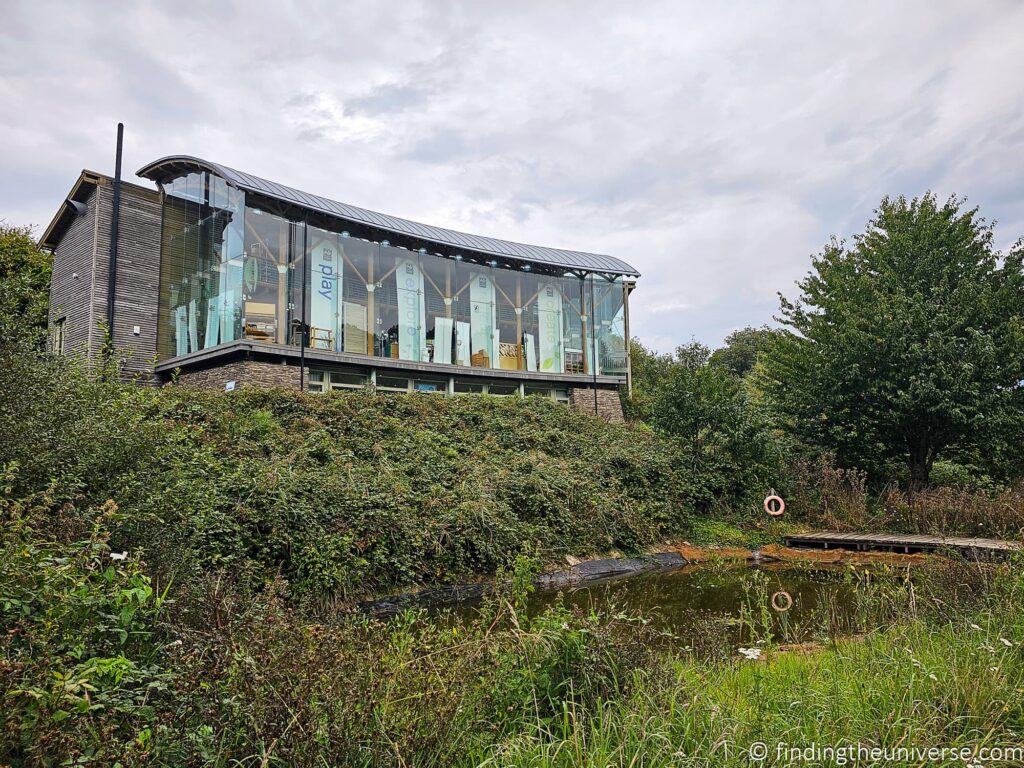
A five minute drive from the Welsh Wildlife Center is Cilgerran Castle. This Norman age castle originally dates from 1108, although the structure today largely dates from the 13th century. It occupies a commanding location above the gorge of the River Tefi and is well worth a visit.
Free for CADW and National Trust members, small fee otherwise. There’s no parking on site, follow signs to the car park. We parked in Cilgerran Lower car park from where there’s a lovely walk along the river and up the hill to the castle.
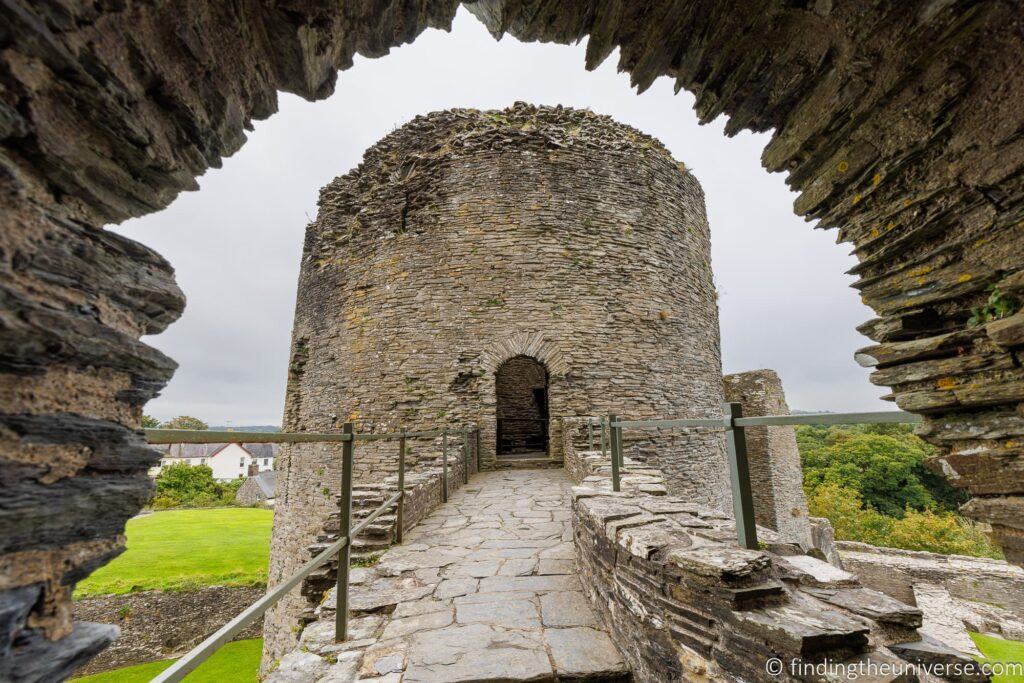
We’d also recommend stopping in Cardigan itself. The community-run Cardigan Castle here is well worth a visit for a small fee.
You can actually stay overnight here, which we have done, and it has a good cafe on site as well. If you have more time, or simply want to adjust your schedule, it makes for a good overnight stay option.
From Cardigan, continue along the A487. If you would like to take a stroll today, we’d suggest heading up to Mwnt. There’s a small car park at Mwnt head beach (fee) and you can visit pretty Holy Cross Church. There’s also a short trail up the hill here which offers nice views of the coast.
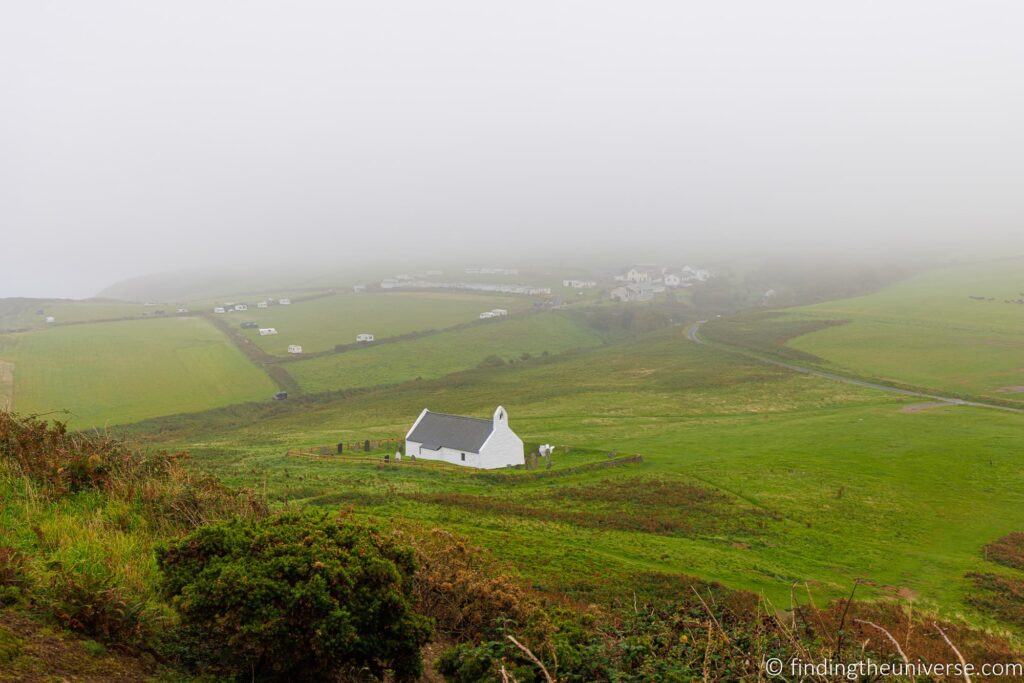
Other nice spots along the coast to stop as you continue north include Penbryn Beach and the pretty seaside fishing village of New Quay.
New Quay is a good location for taking seal-watching boat trips, as well as to pick up a hot plate of fish and chips.
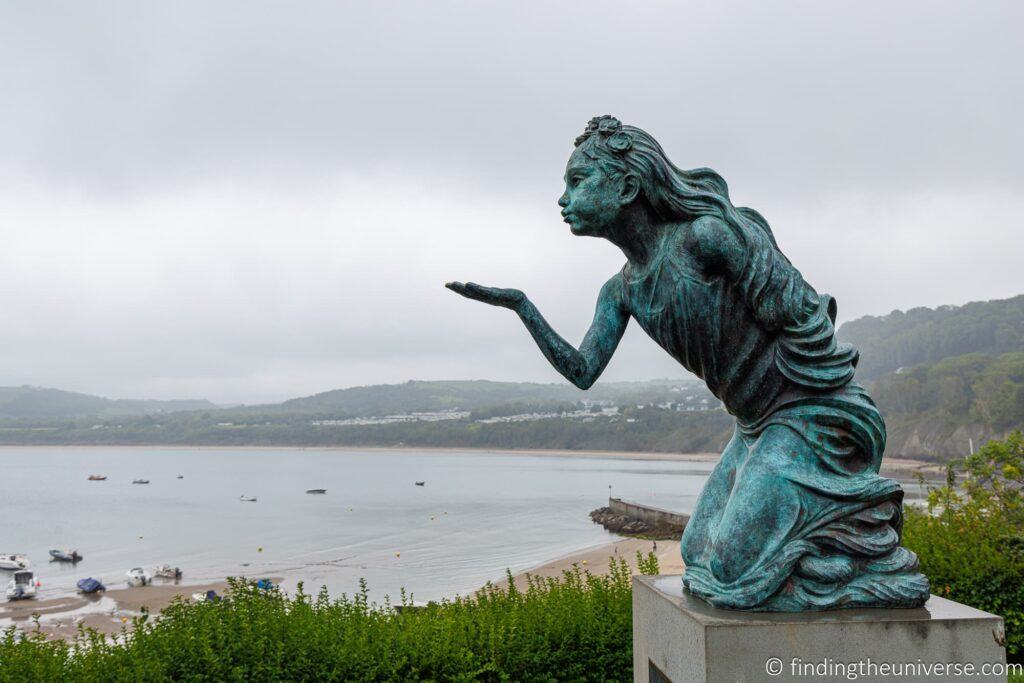
Just beyond New Quay you will find the National Trust property of Llanerchaeron. This is a lovely Georgian villa which also offers walking trails, a walled garden, and a farmyard home to various Welsh breeds of farm animals. There’s a fee to visit, and it’s free for National trust members.
Finally, continue on up the coast to Aberystwyth, where you will spend the night. This is a mid-size coastal town which is known for its university. There are also a number of excellent attractions in the town itself which you can either visit today or on the morning of day 6, depending on how your time is going.
We’d definitely recommend visiting the Amgueddfa Ceredigion Museum. This is located in a preserved Edwardian era theatre, which makes for quite a unique museum location!
The museum has displays on all sorts of things, covering local life, art, geography, and culture across the ages. It’s also free (donations recommended).
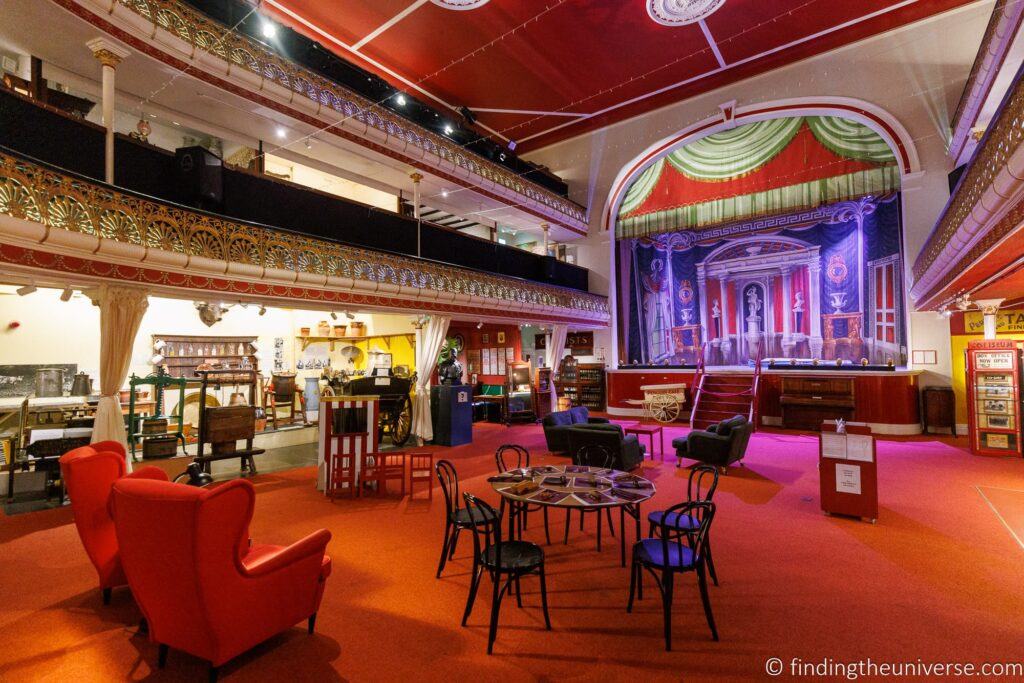
We can also recommend the Aberystwyth Cliff Railway at the north end of the promenade. This steep funicular railway has been ferrying people up and down to the clifftop viewpoint since 1896.
There’s a fee to use it, we’d suggest taking the railway up and then walking down for lovely views of the bay and town below.
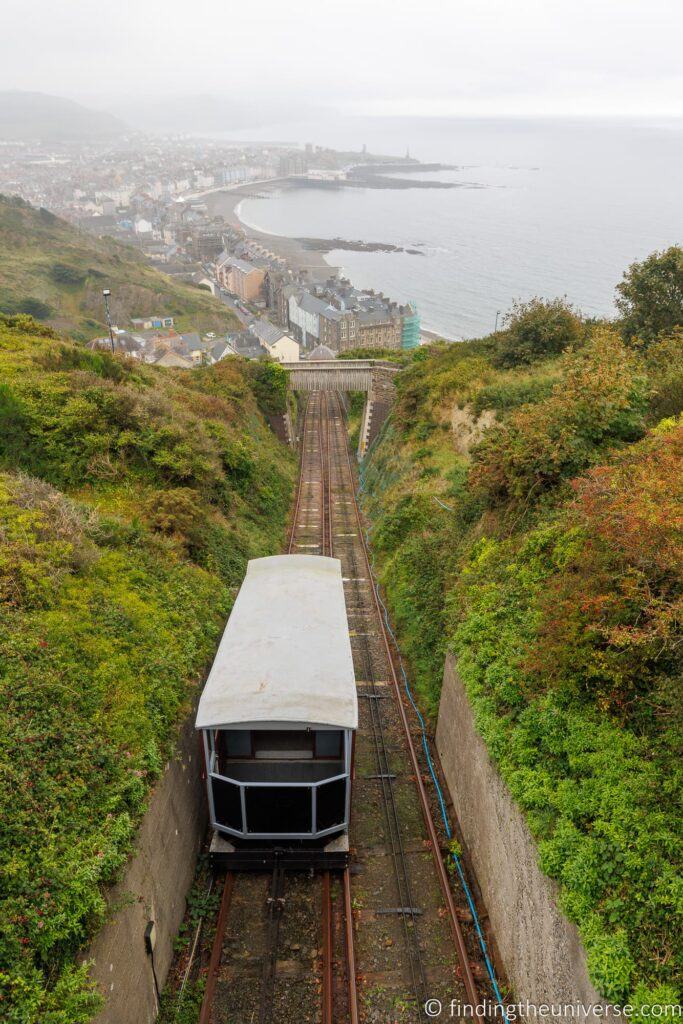
A stroll around the very ruined Aberystwyth Castle in the middle of town is also well worth a few minutes of your time. It’s free to visit.
Day 5 Highlights: Pentre Ifan burial chamber, Castell Henllys Iron Age Village, Welsh Wildlife Centre, Cilgerran Castle, Cardigan Castle, Holy Cross Church, New Quay, Aberystwyth sites
Day 5 Driving Distance: ~80 miles
Day 5 Driving Time: ~ 2 hours
Day 5 Accommodation: Overnight at (or near) Aberystwyth. The town has a lot of accommodation options, many along the beach front. Some options we recommend include:
- Llwynygog Guest House – a great value centrally located family-run guesthouses offering rooms with shared or private bathrooms. Note breakfast is not available.
- Bodalwyn Guest House – a centrally located 4* guesthouse a short walk from the beach. All rooms are en-suite. Note breakfast is not available.
- Richmond Hotel – this seafront hotel offers gorgeous views across Cardigan Bay from some rooms. An excellent breakfast is included. We have stayed here and had a lovely night’s stay.
- The Glengower – found right on the beach, this is a traditional pub with en-suite rooms, some of which offer spectacular sea views. Breakfast is included.
- Townhouse No.1 – a stylish boutique hotel in a refurbished Edwardian property with lovely en-suite rooms as well as two apartments. There is a kitchen with snacks and drinks available, but no breakfast option.
Day 6 – Aberystwyth to Porthmadog
Today you’re going to continue traveling up the Welsh coastline, and you’re going to have options today for things to do which will depend on whether you want to do a mountain hike or not. Or if you’d prefer wildlife watching and coastal towns instead.
You can start the day by finishing any exploration that you didn’t get round to in Aberystwyth. On your way out of town we can highly recommend dropping in at the National Library of Wales.
This huge building has some excellent exhibits including an interactive archive of TV and audio footage, displays of rare books, and more. Free to visit with parking on site.
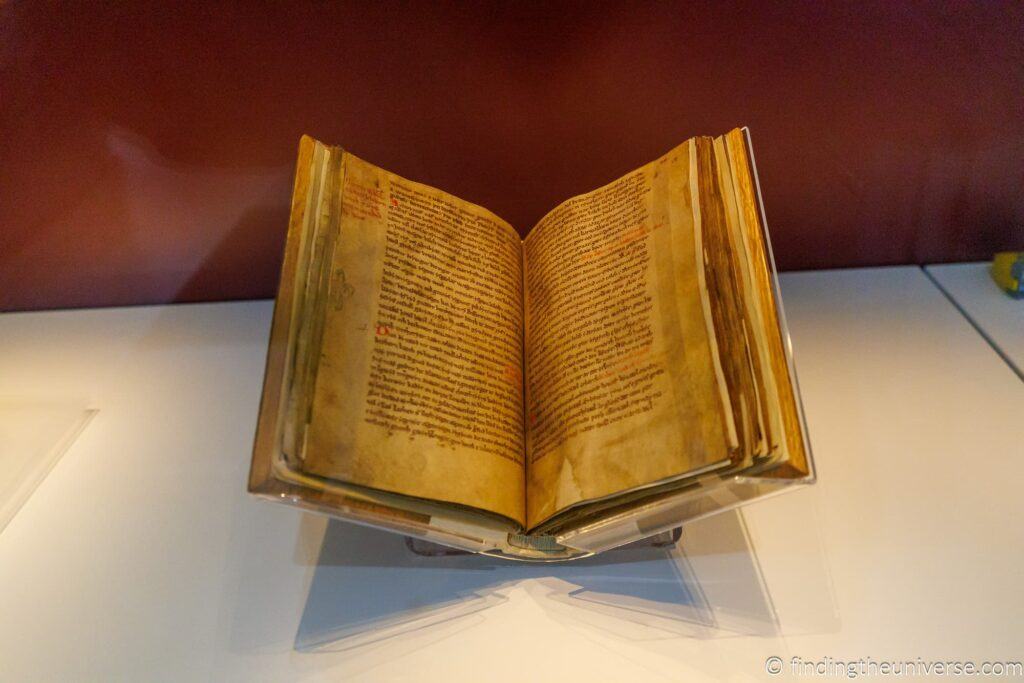
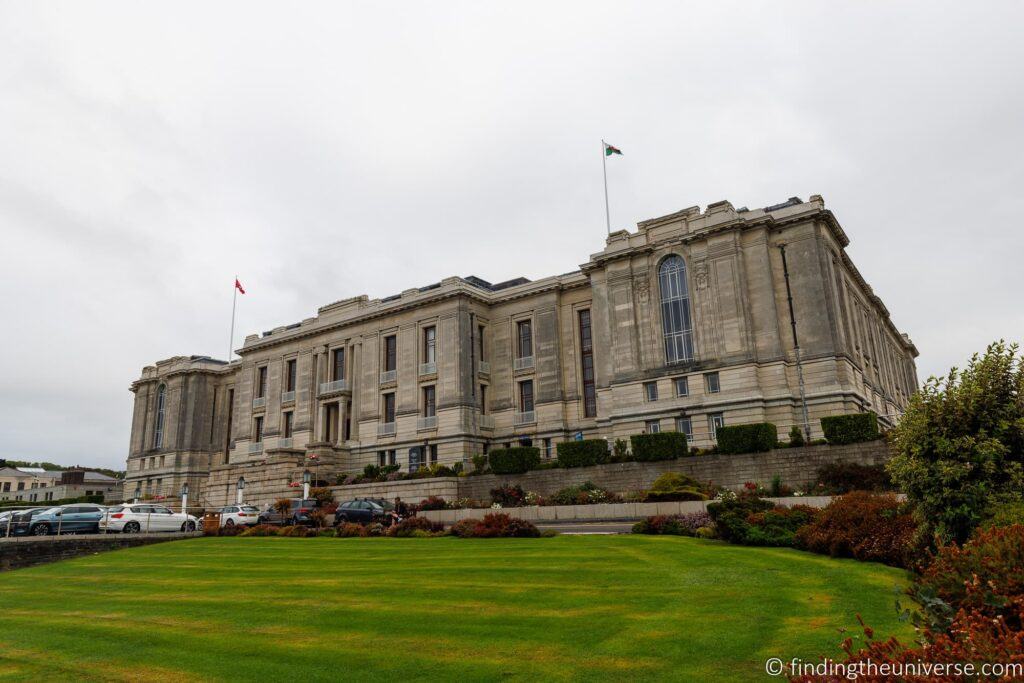
Now, you need to decide between coastal exploration and wildlife viewing, or a hike up a mountain.
If you want to hike up a mountain today, our recommendation is to drive an hour or so north to the Dôl Idris carpark next to Minffordd. From here there is a spectacular walk up Cadair Idris.
This is one of my favourite hikes in Wales, with views from the top across the whole of the Snowdonia National Park, including the coastline, Snowdon itself, the Mawddach Valley and more.
I would say that this is a fairly demanding hike, especially if tackled from the Minffordd side as I recommend. However, it is really worth it if you have the time and physical capacity to do so.
It’s possible to do this largely as a loop walk, ascending up one side of the lake and then back down the other. The trails are well marked but we would recommend bringing a map and dressing appropriately for mountain hiking conditions. You’ll also want to be aware of the weather and forecast as you’ll want to skip this in bad weather conditions.
You can see an overview of the Minffordd trail here. It is about 9km (5.59 miles) long. Expect the total hike to take 4 – 6 hours, depending on your fitness level and how often you stop.
Of course there are loads of other hikes in this area that you could do instead. If you are looking for a much easier and shorter hike here, consider the Dôl Idris path which is an all-abilities path that is about a 1.25 km (0.77 miles) long and is paved so that it can be accessed by wheelchair users and those with pushchairs.
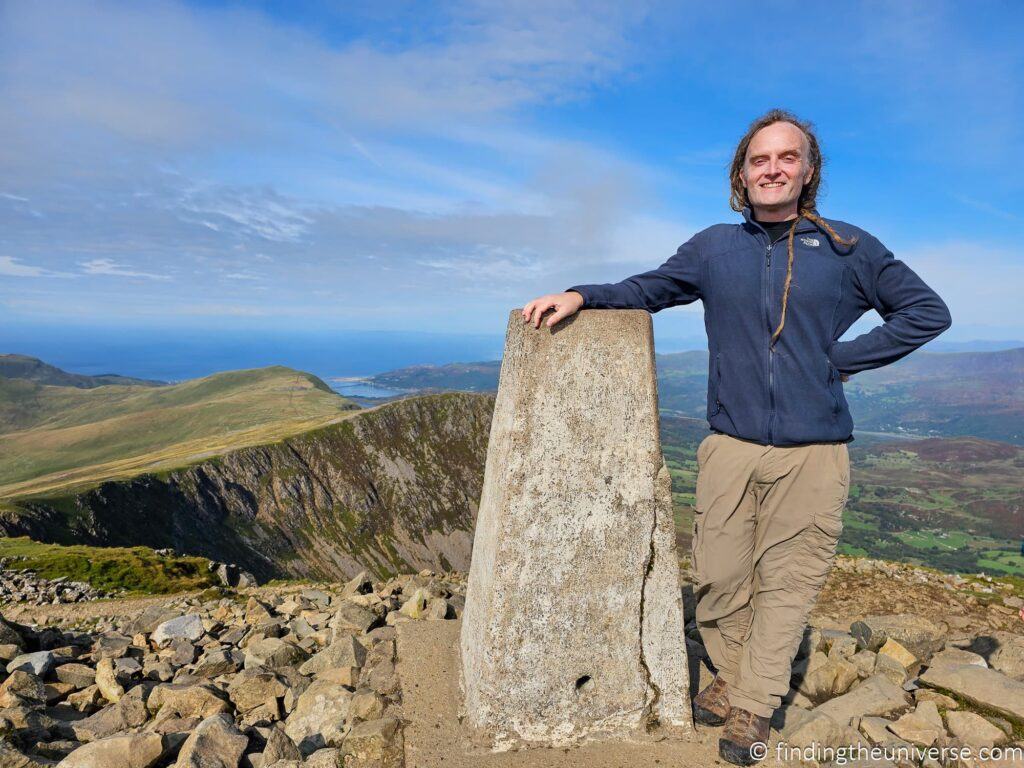
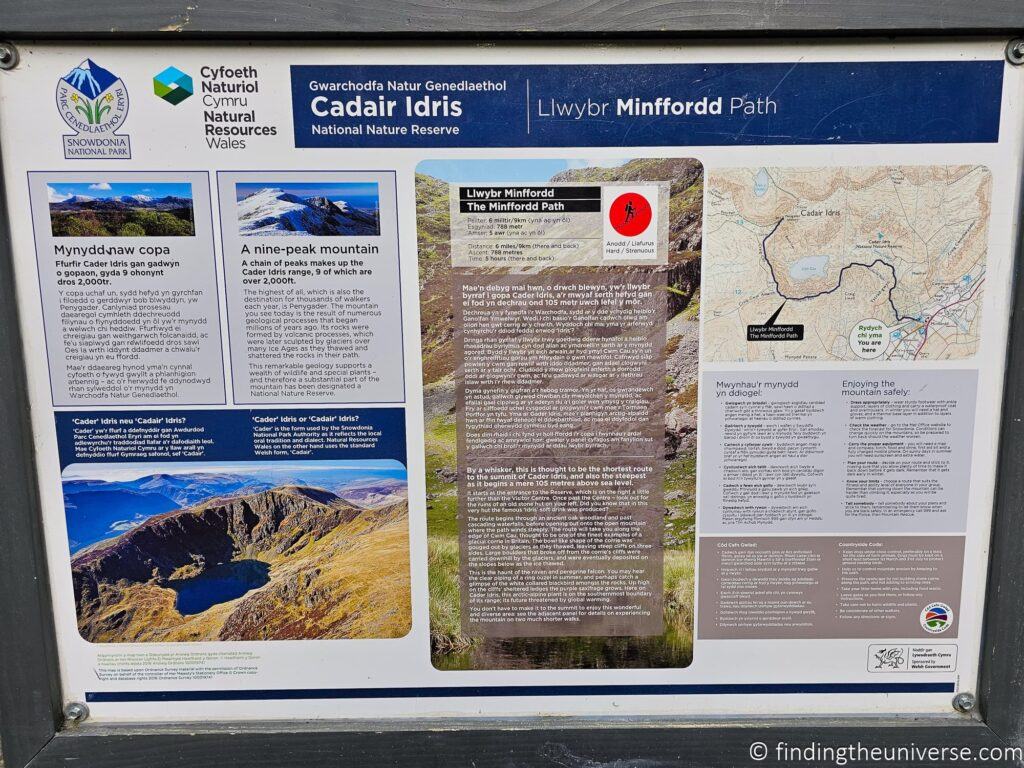
If you would rather not tackle a big hike today (there will be more opportunities later on in the itinerary!), then there are a lot of options to consider as you head up to Porthmadog.
We’d suggest picking those options which appeal most to you from the options available as you won’t be able to fit everything in.
First, head up the coast to the coastal town of Borth, where there’s a long promenade you can walk along. If you are lucky, you might be in town on one of the days the Borth Station Musuem is open.
This is a lovely tiny museum dedicated to the history of the railway, recreating the station as it was in the early 1900s. It’s free to visit.
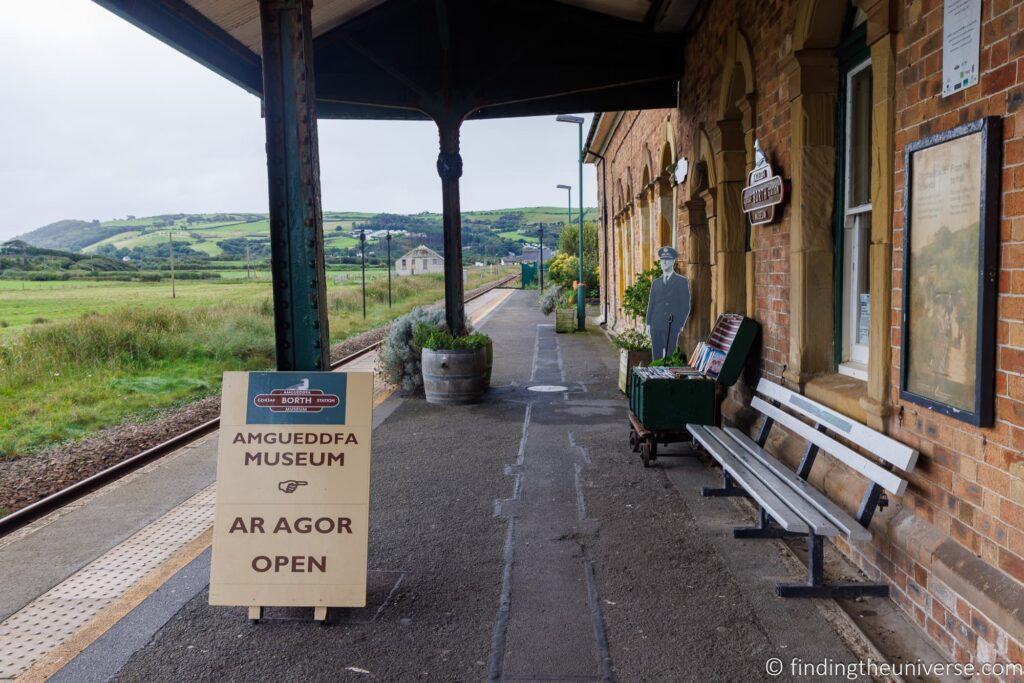
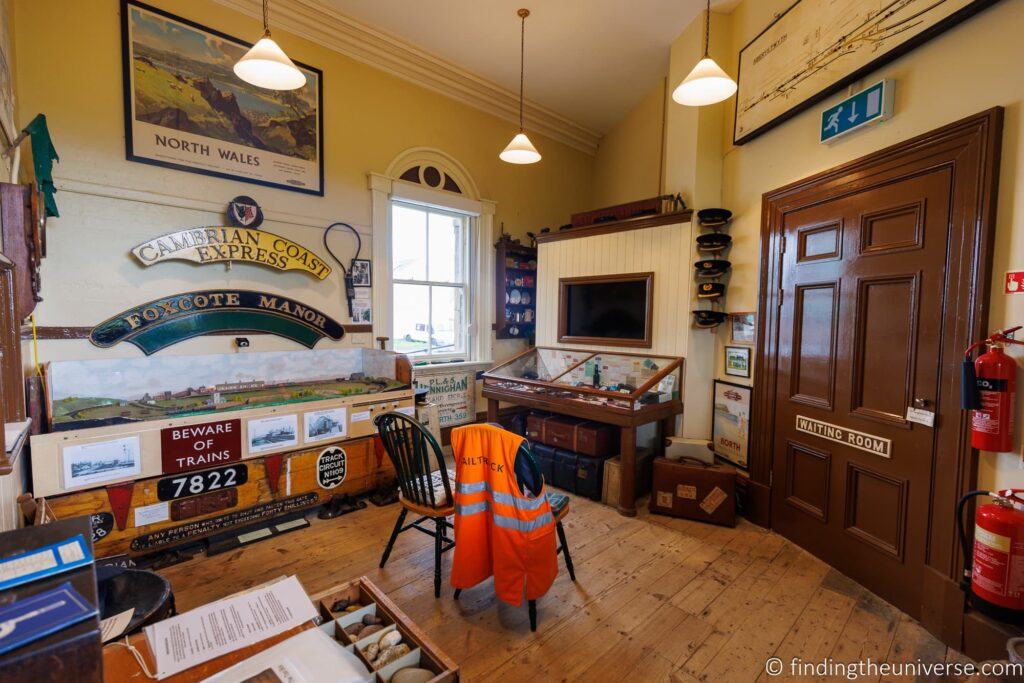
From Borth, drive a couple of miles further up the B4353 along the coast, and take the turning for Ynyslas Visitor Centre, which is part of the Dyfi National Nature Reserve.
Here there are some lovely walks through the dunes, which are some of the largest in the area.
There’s also a nice visitor center here where you can learn about what you are likely to see, as well as a shop and cafe selling snacks and drinks. Expect to spend around an hour here if you do the circular dune walk.
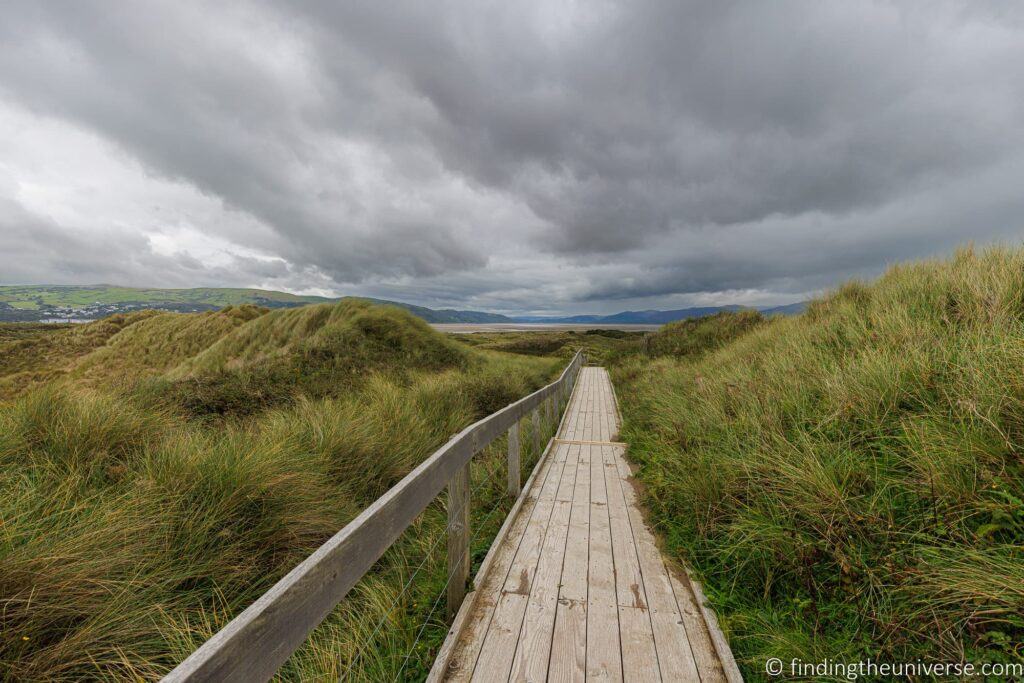
From Ynyslas head back to the A487 and continue north. We’d suggest a quick stop at the Dyfi Furnace (here on Google Maps), an old charcoal fired blast furnace which dates from 1755.
It’s free to visit and there are a number of information panels to explain what you are seeing. It’s only a ten minute stop but well worth it. There’s also a nice waterfall here.
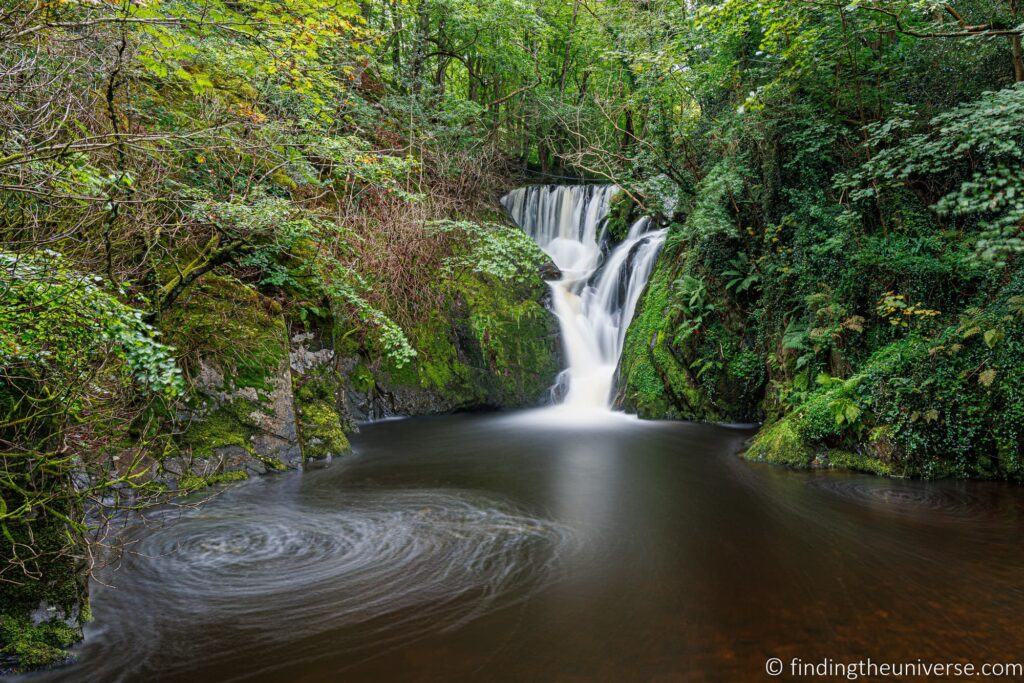
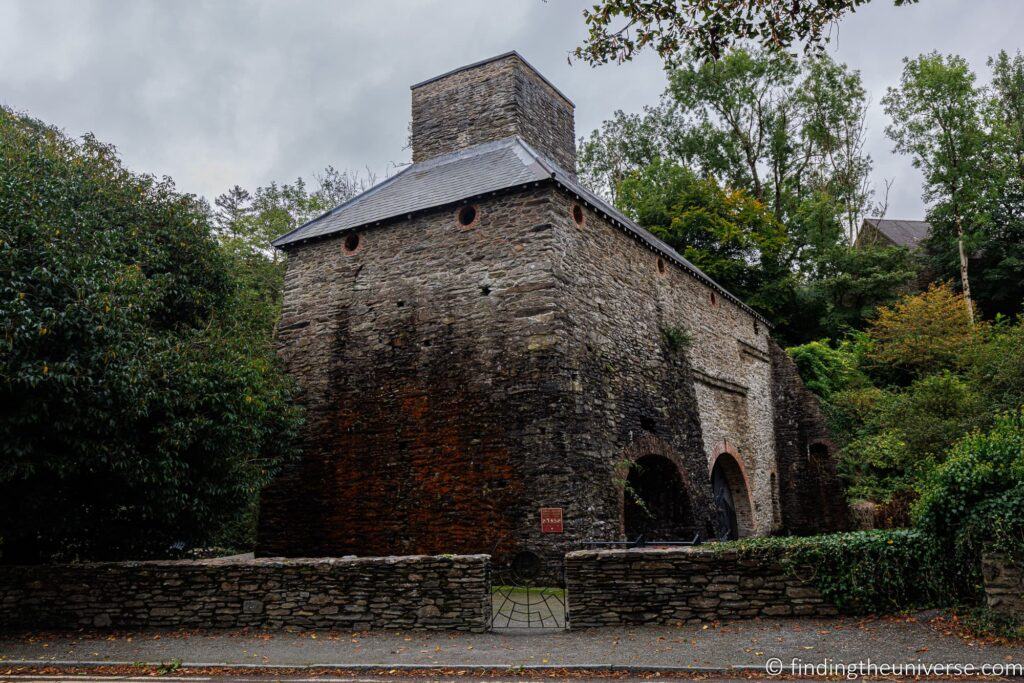
The keen birdwatchers amongst you will also want to make a stop at nearby RSPB Ynys-hir. This reserve has a wide range of habitats, from woodland to saltmarsh to grassland.
That means there’s a hugely diverse range of wildlife that calls the reserve home. There’s a small fee to visit, with entry free for RSPB members.
Another wildlife center you may consider visiting is Cors Dyfi, just a little further along the road. This is a nature reserve and wildlife center which is also home to the Dyfi Osprey Project. There’s a small fee to visit.
Continuing up the A487 you will come to the town of Machynlleth. There are a number of cafes and restaurants here as well as a pretty town clock and town center. There’s also a free museum of modern art here.
North of Machynlleth are two popular attractions. The first is the Centre for Alternative Technology, where you can learn all about alternative energy options, sustainability, and more.
Another popular option, especially with families, is King Arthur’s Labyrinth. Found in a former slate mine, this is a guided story telling tour which takes you through the tale of King Arthur. It’s a lot of fun but be sure to dress warmly as the mine is a chilly place! There’s also a really nice art and craft center on site here, as well as a cafe with good local foods.
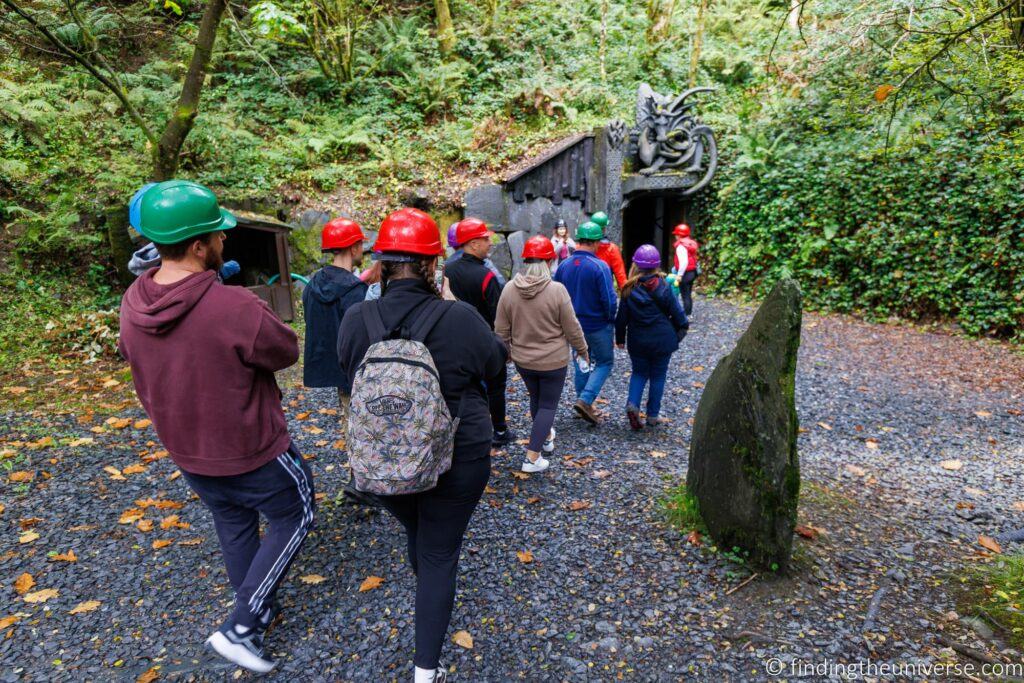
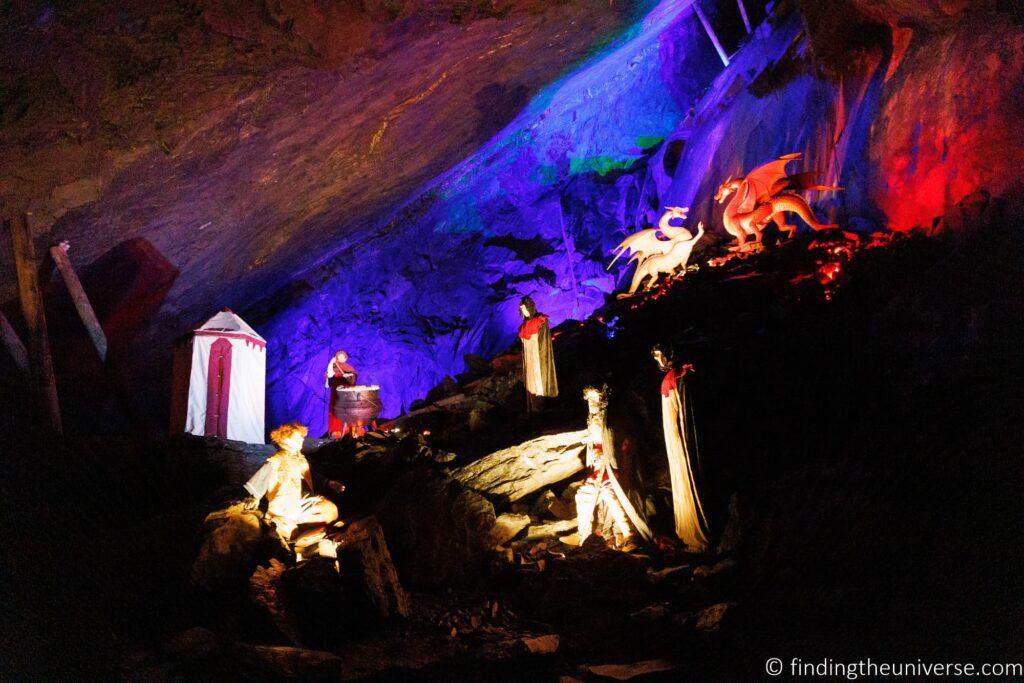
Continuing on to Porthmadog you will pass through the town of Dolgellau, where we recommend driving the coastal route down the Mawddach estuary to the seaside town of Barmouth.
This has a lovely sandy beach and is a great spot to stop for an ice cream or fish and chips.
Continue up the coast and you’ll come to the town of Harlech. This is home to the impressive Harlech Castle, a mighty 13th century fortress built by Edward I during his invasion of Wales.
This castle, along with Beaumaris, Conwy and Caernarfon castles, is rated by UNESCO to be one of the finest examples of late 13th century military architecture in Europe. So we can highly recommend a visit to this, or one (or all!) of the other three. There’s a fee to visit Harlech, and it’s free for CADW members.
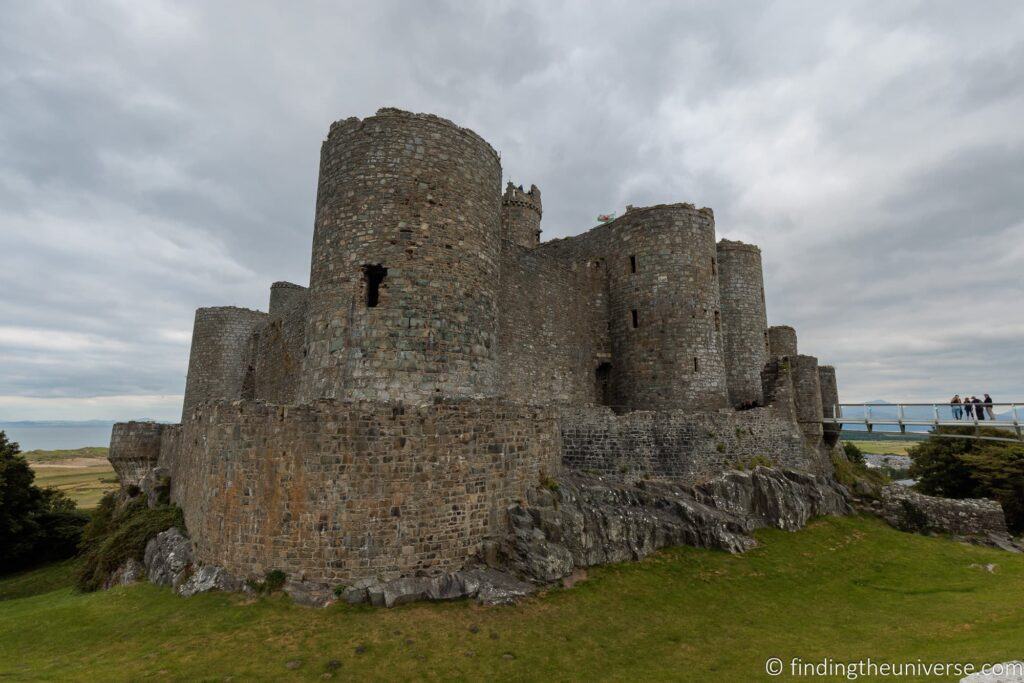
From Harlech it’s a short drive to your destination for the night, the town of Porthmadog.
Day 6 Highlights: Cadair Idris hike, Borth Station Museum, Dyfi National Nature Reserve, Dyfi Furnace, RSPB Ynys-hir, Centre for Alternative Technology, King Arthur’s Labyrinth, Harlech Castle
Day 6 Driving Distance: ~ 65 miles
Day 6 Driving Time: ~ 2 hours
Day 6 Accommodation: Overnight at (or near) Porthmadog. You have many options in the Porthmadog area, some in town and then more in the surrounding area. Some options we recommend include the following:
- The Golden Fleece Inn – this four star inn is in the village of Tremadog, about a 5 minute drive from Porthmadog itself. It has an excellent on-site restaurant and good value rooms. We’ve stayed here and can definitely recommend both the restaurant and the accommodation. Breakfast is available.
- Royal Sportsman Hotel – found in the center of Porthmadog just a few moments from the Ffestiniog Railway, this well rated hotel offers en-suite rooms and a good on-site restaurant. Breakfast is included.
- Tudor Lodge – minutes walk from the Ffestiniog Railway this well rated family-run guesthouse offer en-sute accommdation with breakfast included.
- Portmeirion Village & Castell Deudraeth – if you want to spoil yourself, then you might consider staying in Portmeirion Village itself. A number of rooms are available across the site, including in a castle, and there are also various restaurants to choose from. A great way to experience Portmeririon.
- Sygun Fawr Country House – Found around 20 minutes from Porthmadog in the peaceful village of Beddgelert, this country house hotel makes a great base for hiking Snowdon. There’s a bar and on-site restaurant, and the meal we had when we stayed here was excellent.
Day 7 – Porthmadog to Caernarfon
My main recommendation today is to take one of the scenic narrow gauge rail journeys that depart from Porthmadog. These offer spectacular views of the Snowdonia National Park, and you can just relax and let the scenery roll on by.
There are two railway routes to choose from, both of which operate from Porthmadog. There’s the Ffestiniog Railway, a 13.5 mile long route which runs from Porthmadog to the town of Blaenau Ffestiniog. This is the oldest surviving railway company in the world.
Then there’s the Welsh Highland Railway. This is actually operated by the Ffestiniog Railway Company, so the experience is very similar. The main difference is the route.
This 25 mile stretch of track goes from Porthmadog all the way to Caernarfon, and you can also do a trip to and from the pretty village of Beddgelert on this train.
There’s no “best” option honestly, both trains offer great views and sightseeing opportunities. We enjoyed taking the half-day trip on the Welsh Highland Railway to Beddgelert and back again, however the trip to Blaenau Ffestiniog is also well worth it.
Whichever journey you choose, we recommend booking in advance on the official website here, as the route is very popular and can sell out.
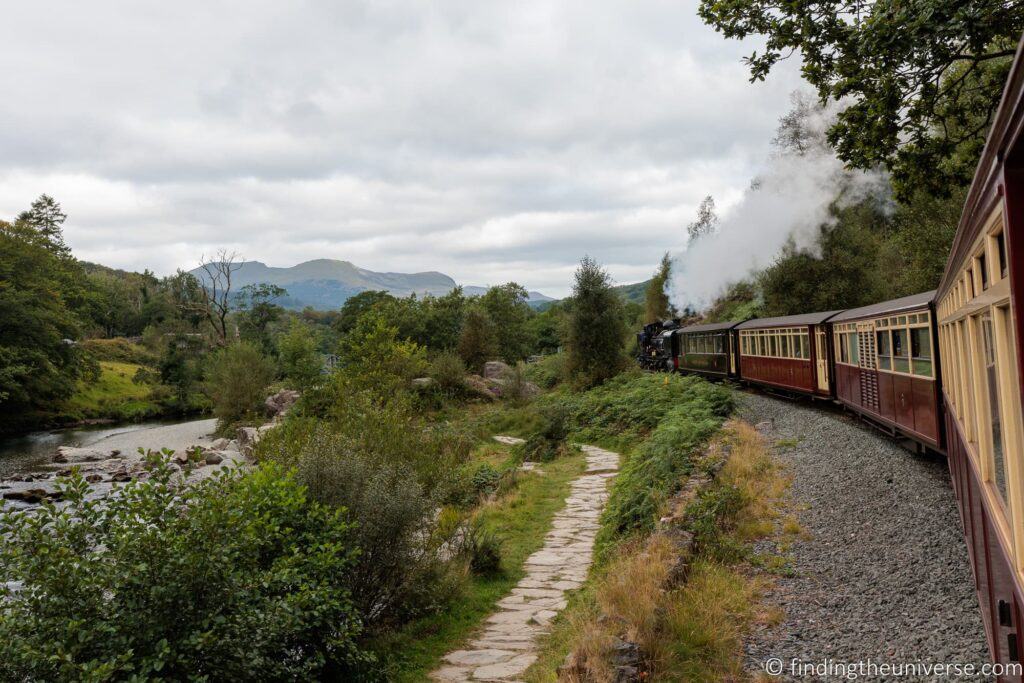
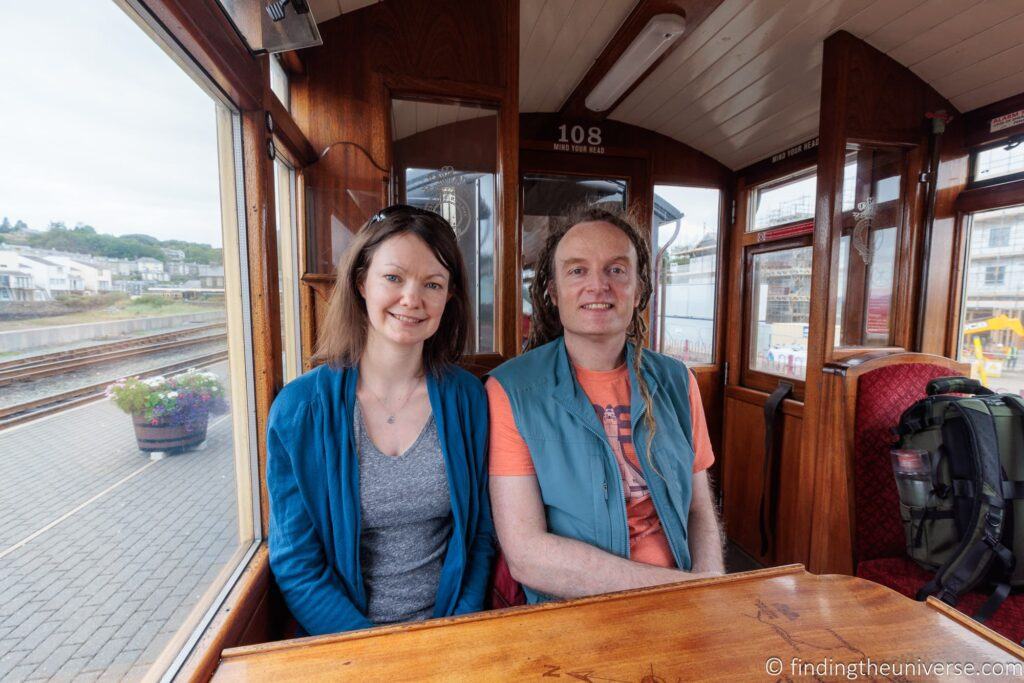
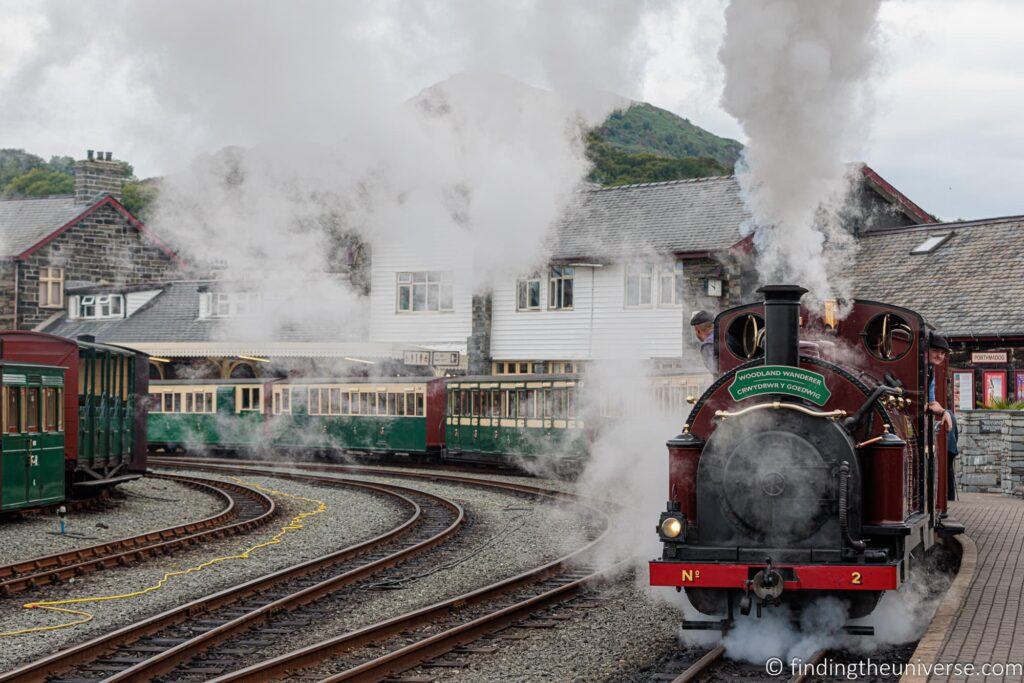
Another popular attraction near Porthmadog that you may consider is Portmeirion Village. This is a purpose-built tourist village, constructed between 1925 and 1975 to emulate a Mediterranean seaside town, and particularly the town of Portofino in Italy.
It is certainly an unusual attraction, as you wander past colorful houses with ornate designs. If not for the Welsh mountains in the background and the higher probability of rain, you might even think you have left Wales entirely.
Whilst this is a popular attraction, I will admit that Jess and I didn’t entirely fall for it. It was a fairly pricey place to visit, and other than looking at the buildings, enjoying the views, and dropping into the shops, there wasn’t a huge amount to do.
Of course, everyone will have a different experience, so it’s up to you. Now there are about 20 miles of paths you can walk which are nice, but some of these were closed when we visited and it rained much of our visit. So I think the weather really put a damper on our visit.
I think the experience at Portmerion Village is best on a nice sunny day and if you spend the night. There are several types of accommodation here and nearby if you decide to stay the night.
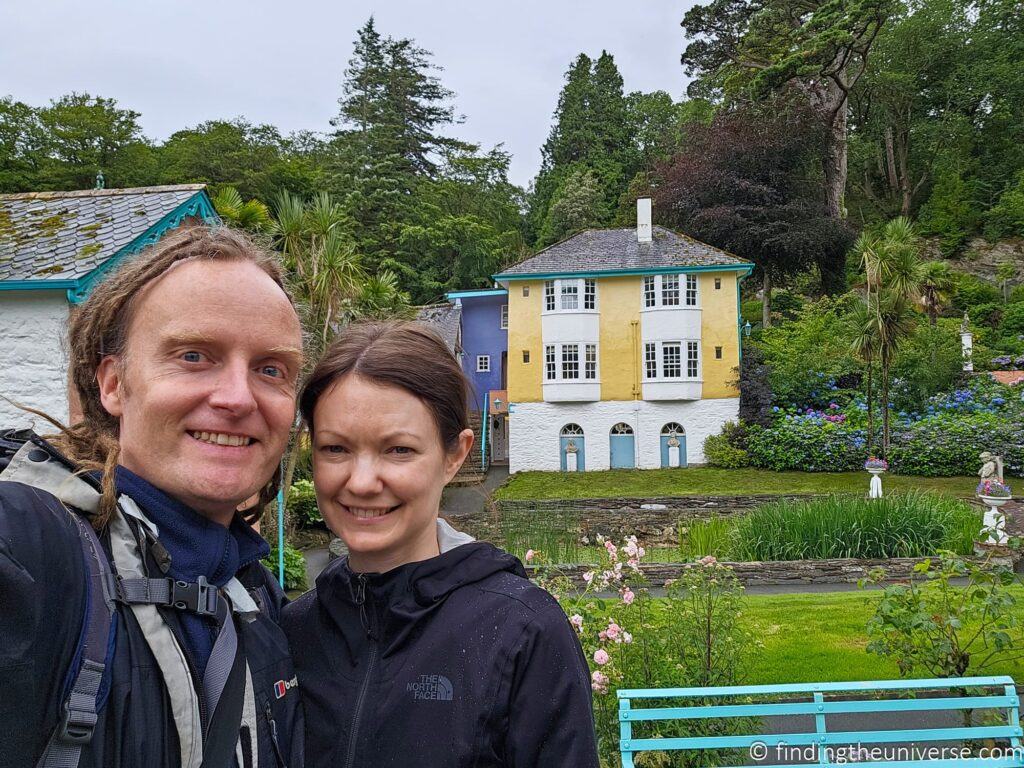
Depending on what you have chosen to do today, you may or may not have more time to spare. If you are looking for more to do, then I’d suggest taking a road trip around the Llŷn Peninsula.
This offers gorgeous coastline views, cute seaside villages, and more castles to explore. For instance, you can go get ice cream at Cadwaladers in Criccieth, visit Criccieth Castle, and do some coastal walks at Aberdaron. There’s also a lovely free art gallery with cafe in Llanbedrgo.
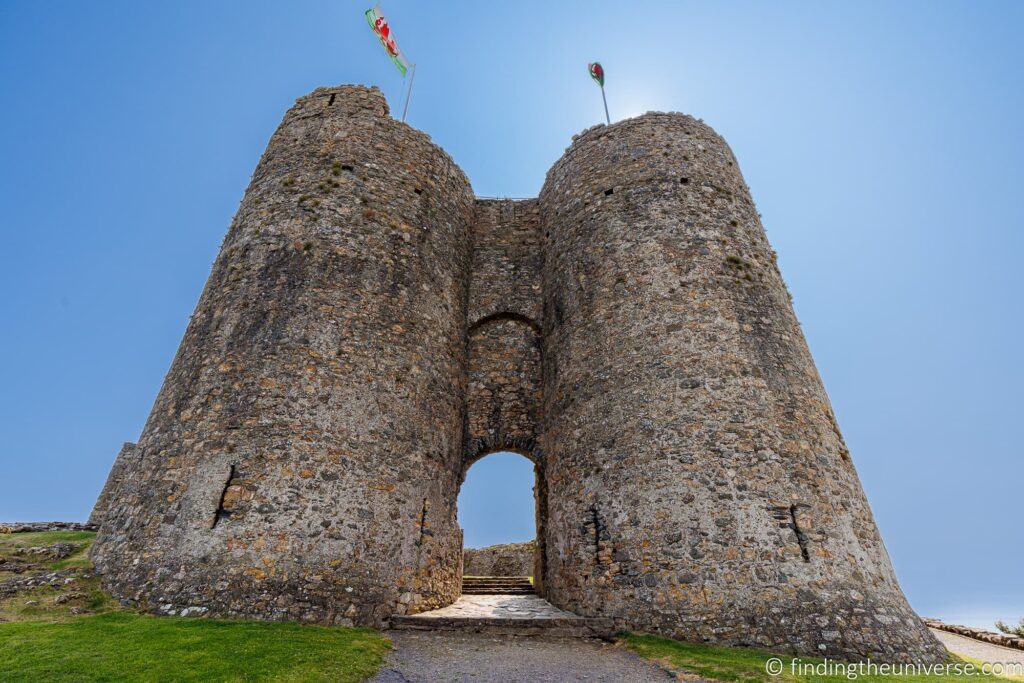
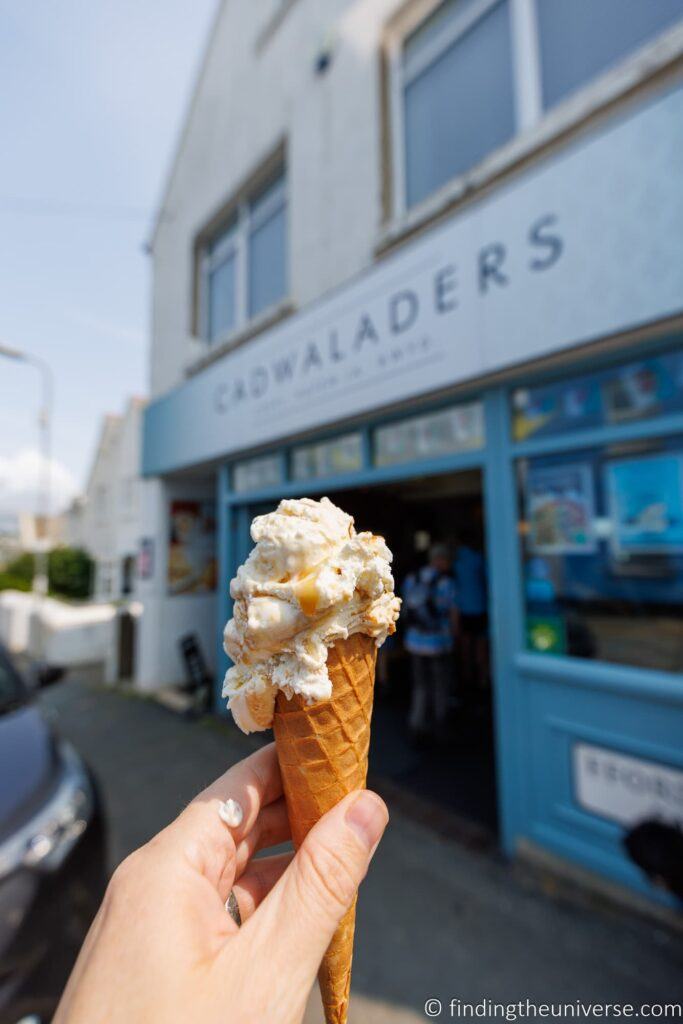
Finally, head to Caernarfon where you will overnight. The main attraction here is the stunning Caernarfon Castle which you should definitely visit if you have time and still have an appetite for Welsh castles!
This is a quite spectacular late 11th century motte and bailey style castle. Free to CADW members, otherwise there’s an entry fee.
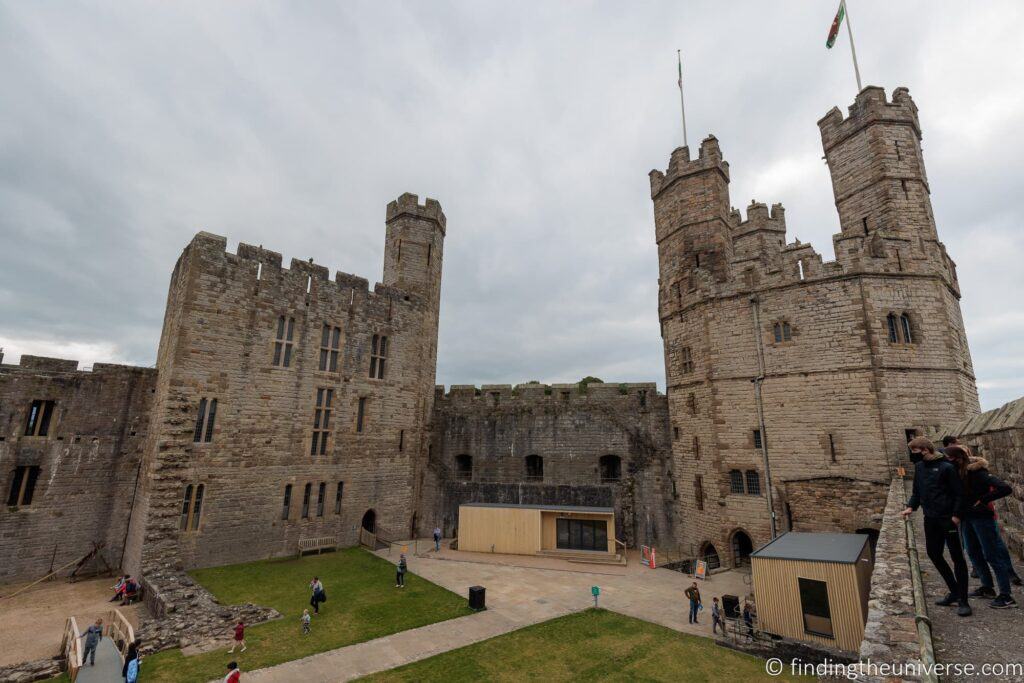
Depending on your schedule you may have to do this on the following day.
Day 7 Highlights: Narrow gauge railway ride, Llŷn Peninsula, Criccieth Castle
Day 7 Driving Distance: ~ 60 miles
Day 7 Driving Time: ~ 2 hours
Day 7 Accommodation: Overnight at (or near) Caernarfon. Of course, you could also base yourself in Porthmadog or another location for nights 6 and 7 if you’d prefer not to keep packing and unpacking. However, if you choose to stay in Caernarfon, we suggest the following options:
- Totters Hostel – this centrally located hostel offers rooms with shared or private bathrooms and breakfast is included.
- Ty Glyndwr Bunkhouse – this well reviewed centrally located hotel has a bar and cafe, and a mix of shared or private bathrooms. Breakfast is included.
- Ty Castell – a centrally located 4* hotel offering en-suite rooms. There’s an on-site restaurant and bar, and breakfast is available.
- The Black Boy Inn – a gorgeous 16th century coaching inn found inside the city walls, this is one of the oldest inns still operating in North Wales. There’s a good restaurant and bar on site, and a range of en-suite rooms to choose from. Breakfast is available.
- Plas Dinas Country House – just 10 minutes drive from Caernarfon, this gorgeous country house hotel was once the home of Lord Snowdon. Today it has an award-winning restaurant and gorgeously furnished en-suite rooms. Breakfast included.
Day 8 – Caernarfon to Conwy
For your eighth day you again have lots of options, as the northern part of Wales has a huge amount to offer.
One very popular option is of course to tackle the highest mountain in Wales, Snowdon (Yr Wyddfa in Welsh). You have a couple of options for going to the summit.
First, and most obviously perhaps, you can walk. There are no less than six routes to choose from, and you can see them all outlined here. The Llanberis path tends to be the most popular as it’s regarded as the easiest, although this is still a strenuous hike.
My personal favourite routes are the quieter Snowdon Ranger or Rhyd Ddu paths. I’ve done these paths and only passed a few other walkers, even when the summit is busy.
Whichever route you choose, you will want to allow between 5 to 8 hours for the hike, depending on the route chose and your fitness level. So you’ll want to basically plan your full day around your hike as you won’t have too much time to fit much else in and will likely be exhausted after your hike.
Note that the car parks in the area are all pay and display, and some require advance bookings. Be sure to check ahead.
So do be sure to plan ahead if you are considering a hike up Snowdon as you’ll need to be sure to pack accordingly for a mountain hike, know which route you want to do, and plan head for parking. You also want to start early to ensure you get a parking spot and are back before sundown.
Finally, be sure to check the local weather forecast from the Met Office before your hike as weather conditions can make these paths very dangerous. You’ll want to avoid this hike in bad weather.
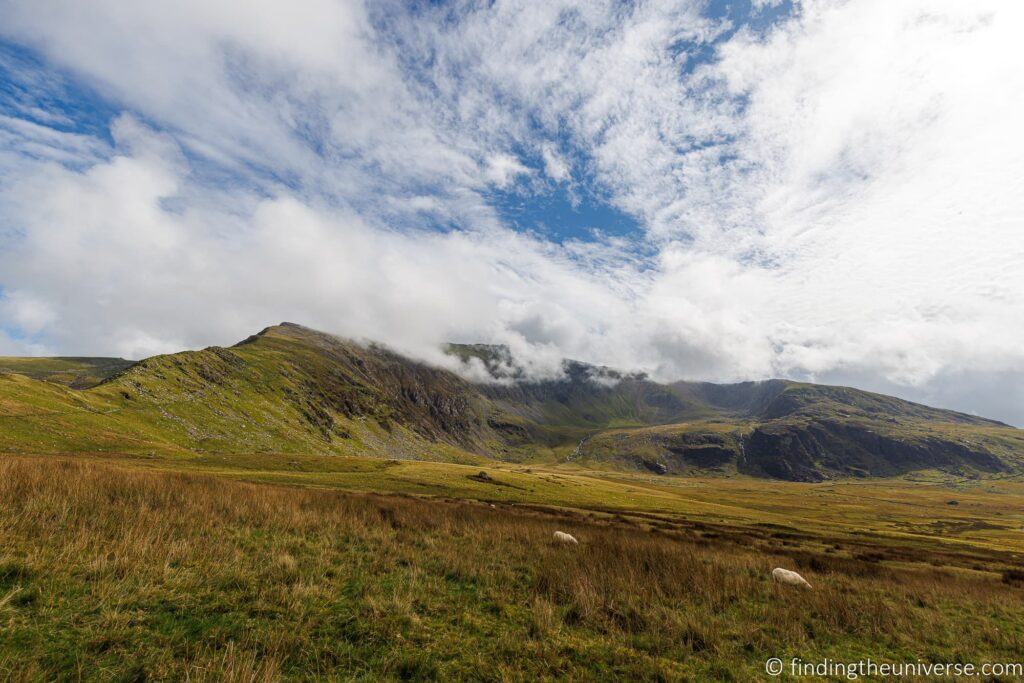
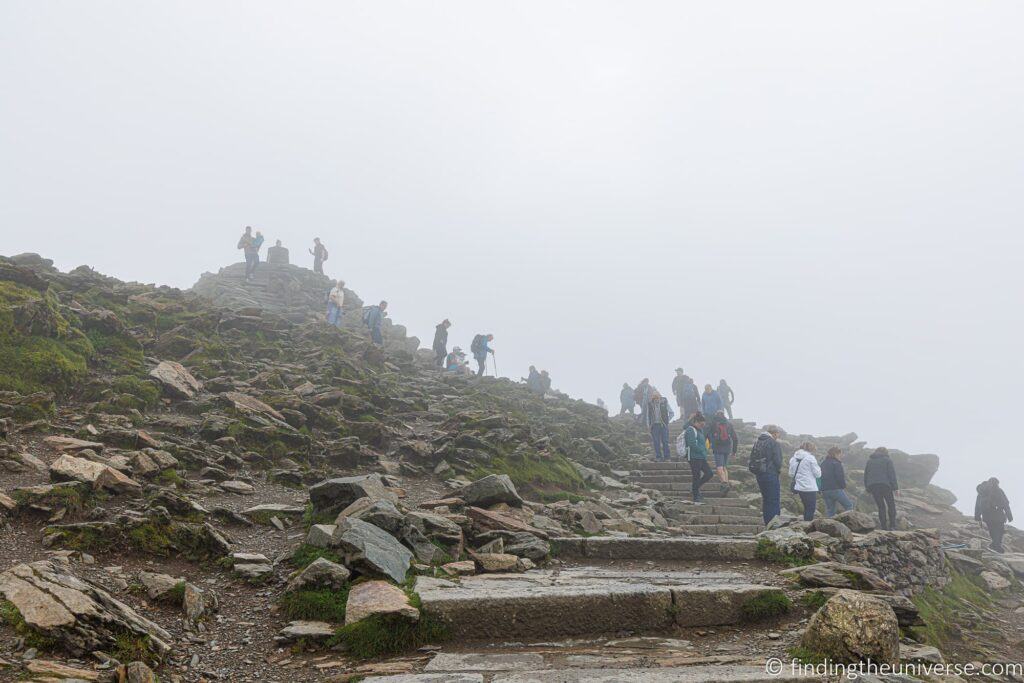
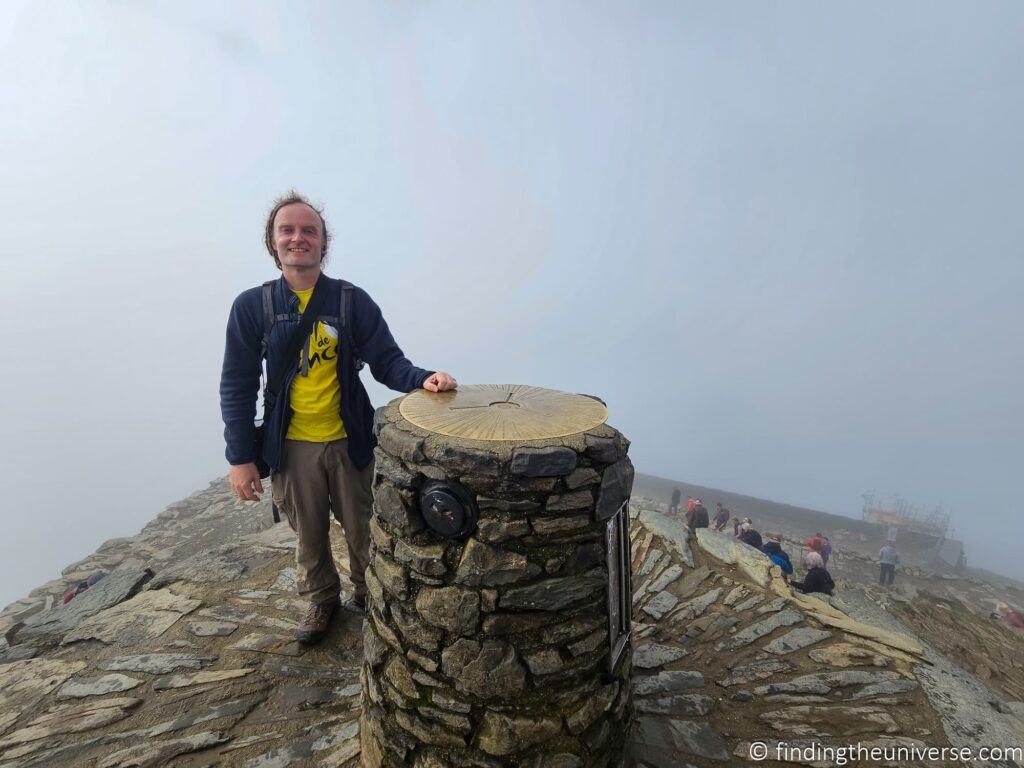
The other way to get to the top of Snowdon is to take the train. Yes, there’s a train that will take you to the top of the mountain.
The Snowdon Mountain railway has been whisking people to the summit of Snowdon since 1896, and its a wonderful way to reach the top, with epic views all the way up.
This is a paid service, and you can choose to go one way or return. If you want to do this we strongly recommend booking tickets in advance as it’s a very popular service. You can do that on the Snowdon Mountain railway website.
For this one you can park either at the Snowdon Mountain railway station on Victoria Terrace (postcode LL55 4TU). If this is full, there are a number of car parks a short walk away in Llanberis.
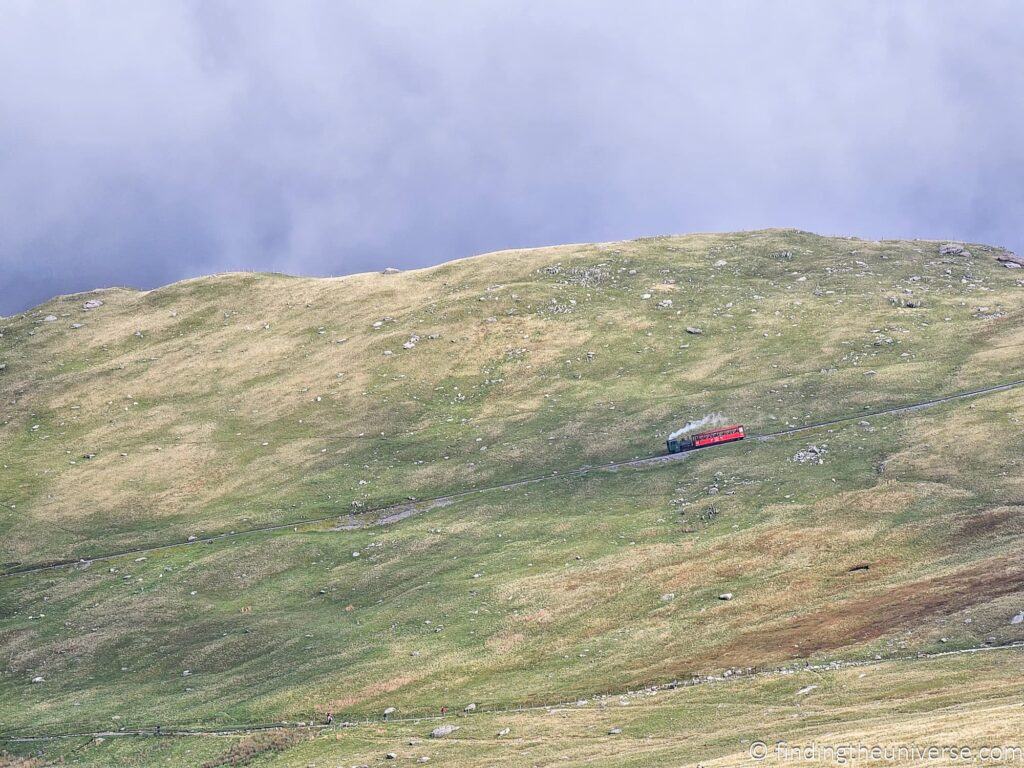
Compared to a Snowden hike which typically takes between 6 and 8 hours, a round trip train ride is around 2.5 hours, which includes 30 minutes at the top. So that’s a good option if you want to fit more in today.
Speaking of which, there is plenty more to see and do in the area, whether or not you choose to ascend Snowdon.
First, in Llanberis we can highly recommend visiting the excellent and free National Slate Museum. This tells the story of slate mining in Wales, which has shaped the landscape and the lifestyle of the people here for hundreds of years.
Found in a former slate quarry, you’ll find exhibits covering all aspects of slate mining as well as live demonstrations of various slate mining processes.
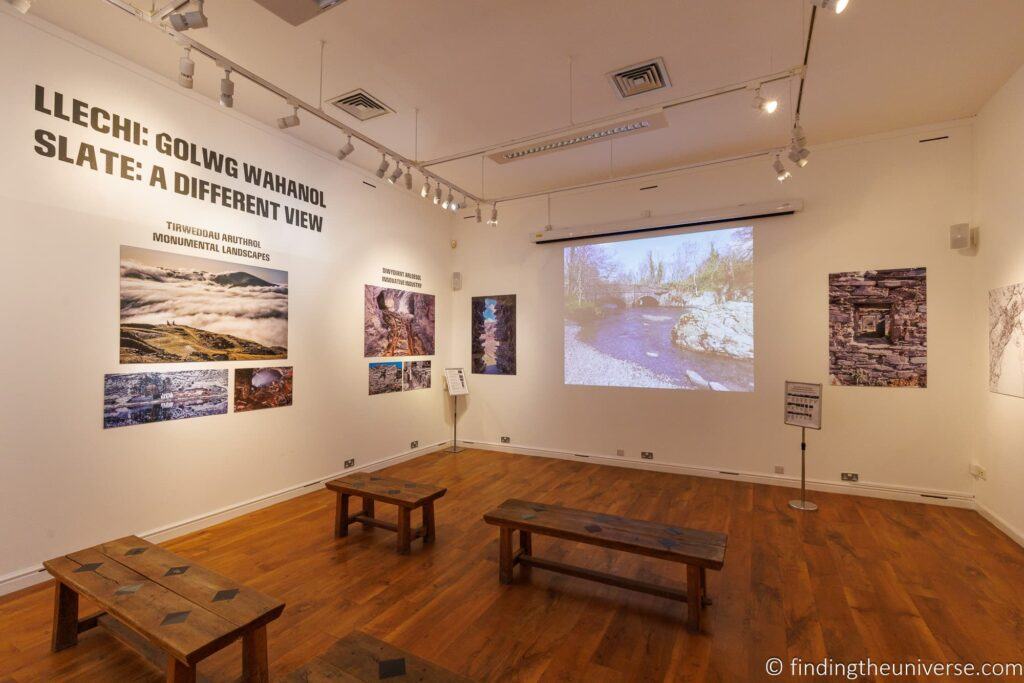
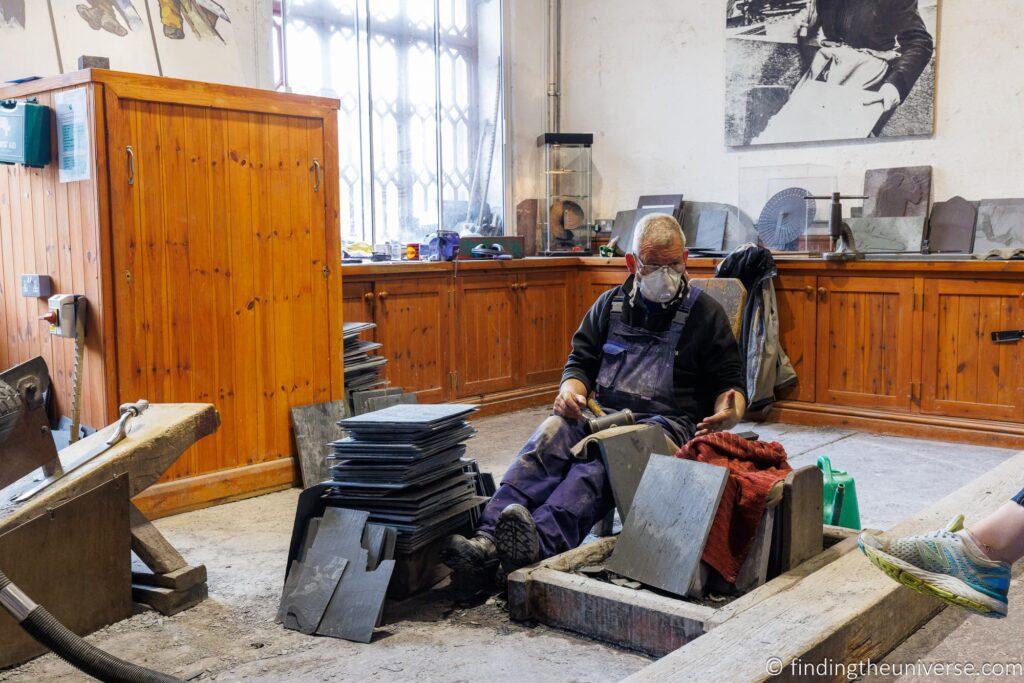
We can also highly recommend heading across the bridge over the Menai Straits to the island of Anglesey. There are two popular attractions here that we recommend. The first is the village of Llanfairpwllgwyngyll, which is home to the longest railway station sign in the world.
The sign, which reads Llanfairpwllgwyngyllgogerychwrndrobwllllantysiliogogogoch, means “The Church of St Mary in a hollow of white hazel, near to a rapid whirlpool, and to St Tysilio’s Church near to a red cave”.
The sign name was entirely invented to attract tourists in the 1860s, and has been a popular visitor attraction ever since. So clearly that was a successful plan!
It’s free to visit, and there’s an excellent and huge souvenir store here where you can buy all manner of things.
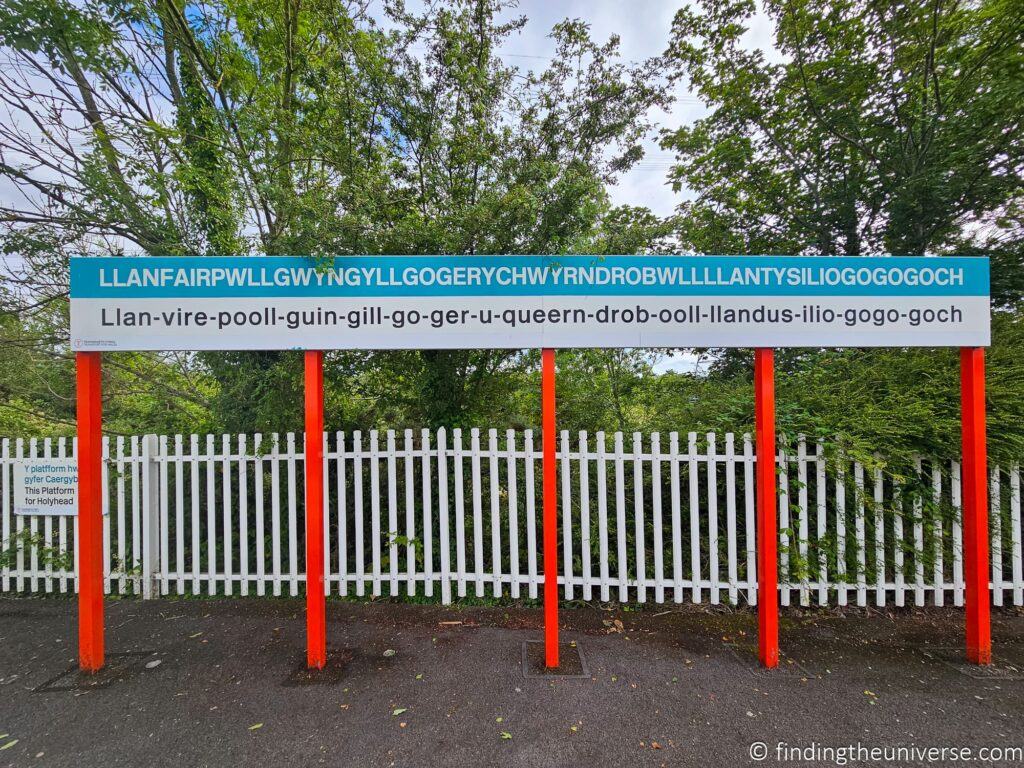
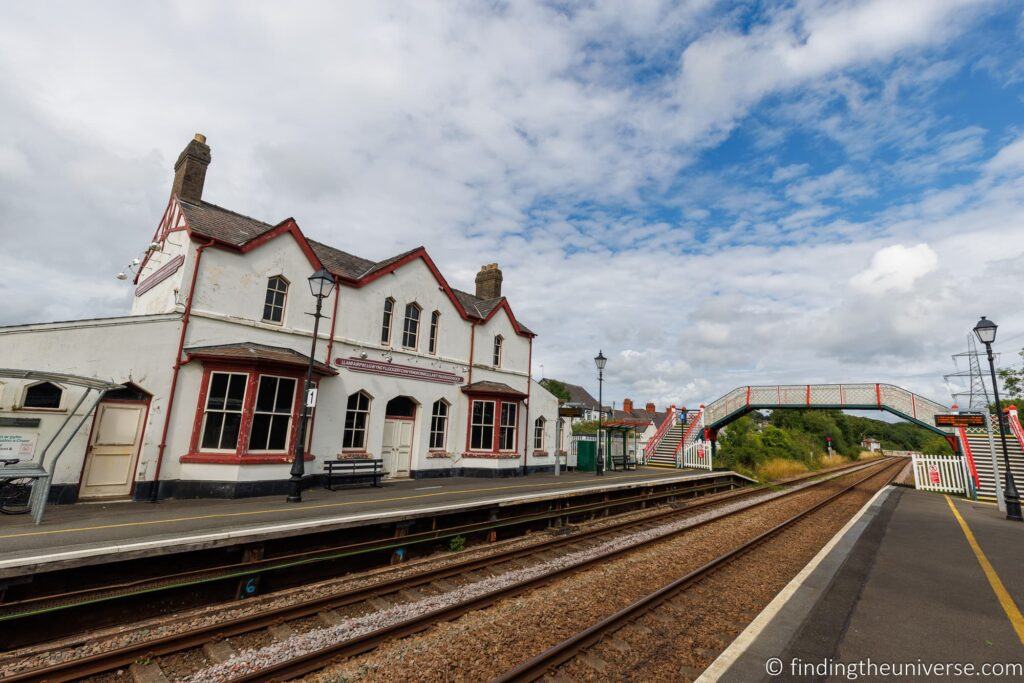
The other attraction we recommend visiting on Anglesey is the spectacular 13th century Beaumaris Castle.
This wonderfully symmetrical castle is surrounded on most sides by a water filled moat. Interestingly, the castle was never actually completed, but there is still plenty to see and do. Free for CADW members, otherwise there’s a fee.
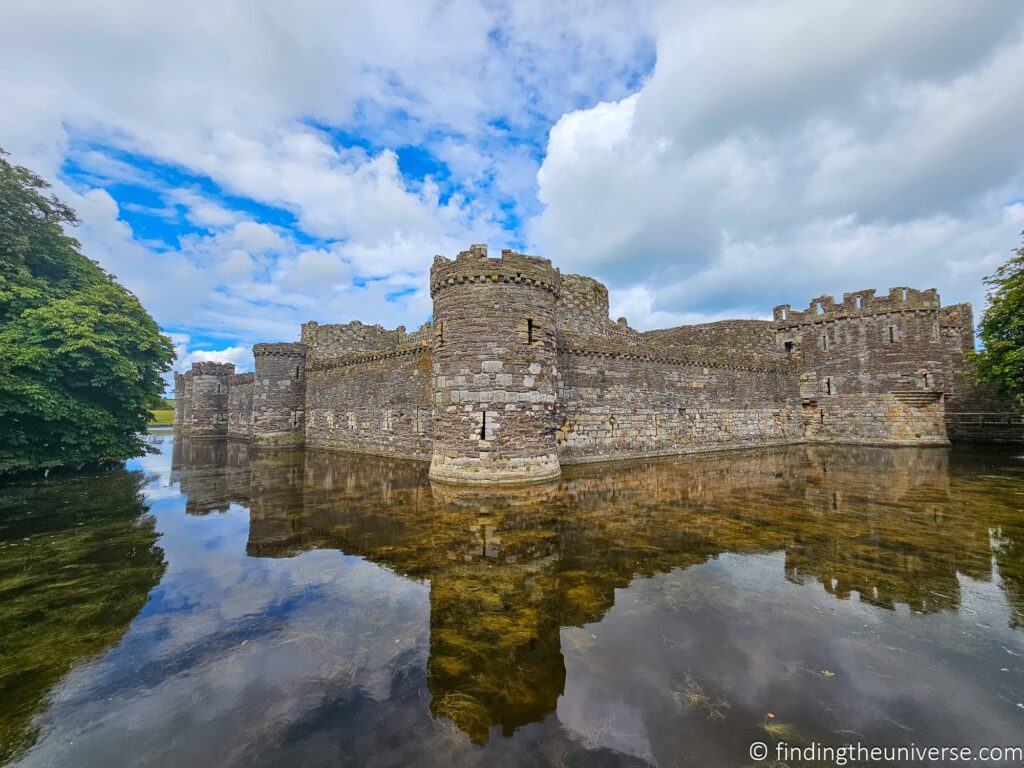
Finally, if you would like to do a walk but would prefer something a little shorter and flatter than the Snowdon ascent, then we would recommend the hike to Aber Falls. This is approximately a four mile round trip hike on fairly level terrain that takes most people 90 minutes to 2 hours.
Your reward for the effort is the stunning 120 foot high Aber Falls. There’s paid parking at the walk start point.
Another good waterfall which is just off the road and requires only a very brief walk are the Swallow Falls, as seen on the photo below. So it’s up to you what you choose to do.
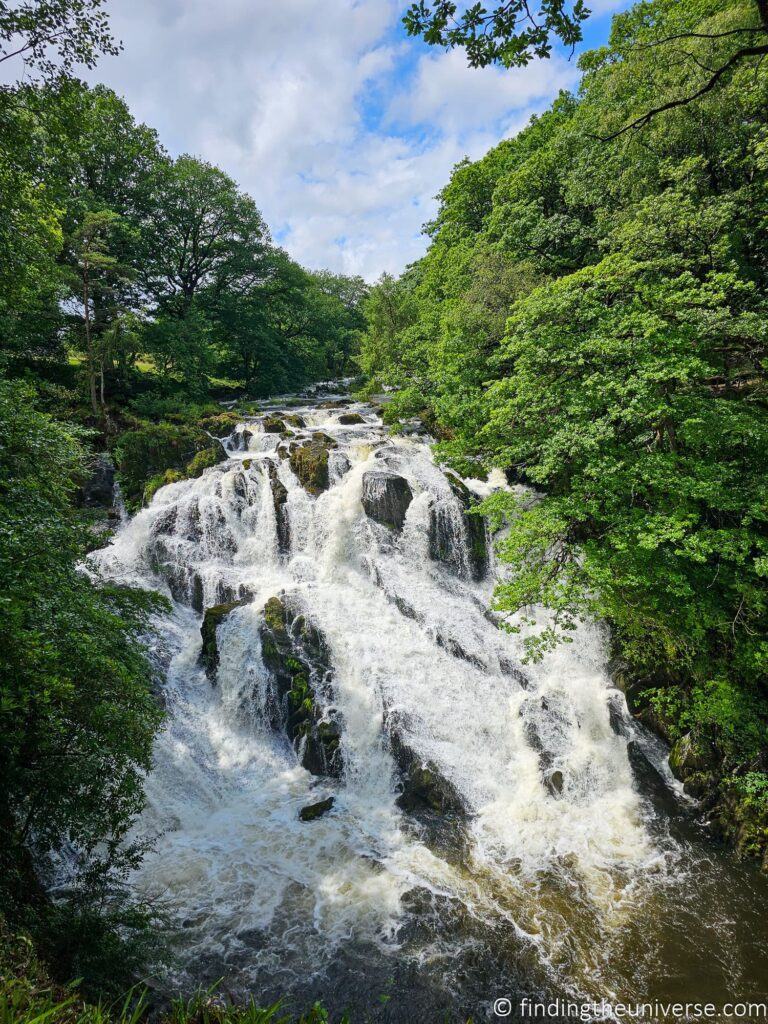
You’re going to finish your day with an overnight in the seaside town of Conwy. This is also home to a stunning castle, which is also worth visiting although we’d suggest probably shortlisting a few castles from this itinerary, so you don’t get castled out!
Conwy Castle is free to CADW members and there’s a fee for visiting otherwise. It’s right in the middle of Conwy and there’s no on-site parking, but you can easily walk here from most of the town car parks.
This is another of Edward I constructions, and it dates from the 13th century. If you visit, we highly recommend climbing to the top of the tower staircases for the best views.
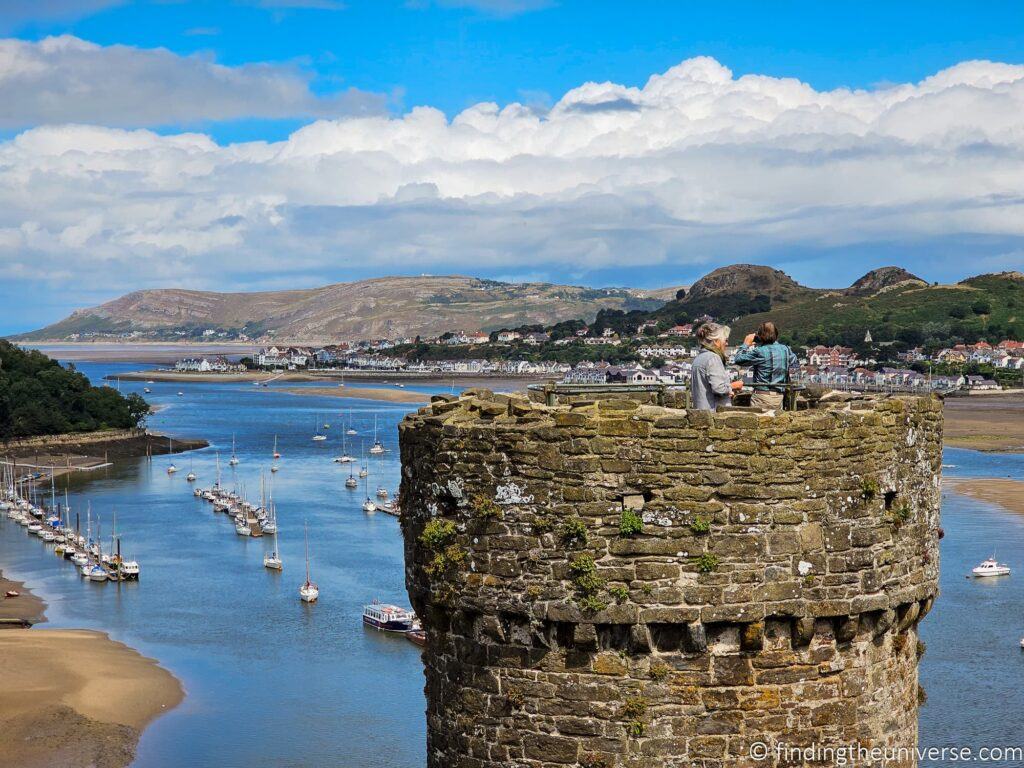
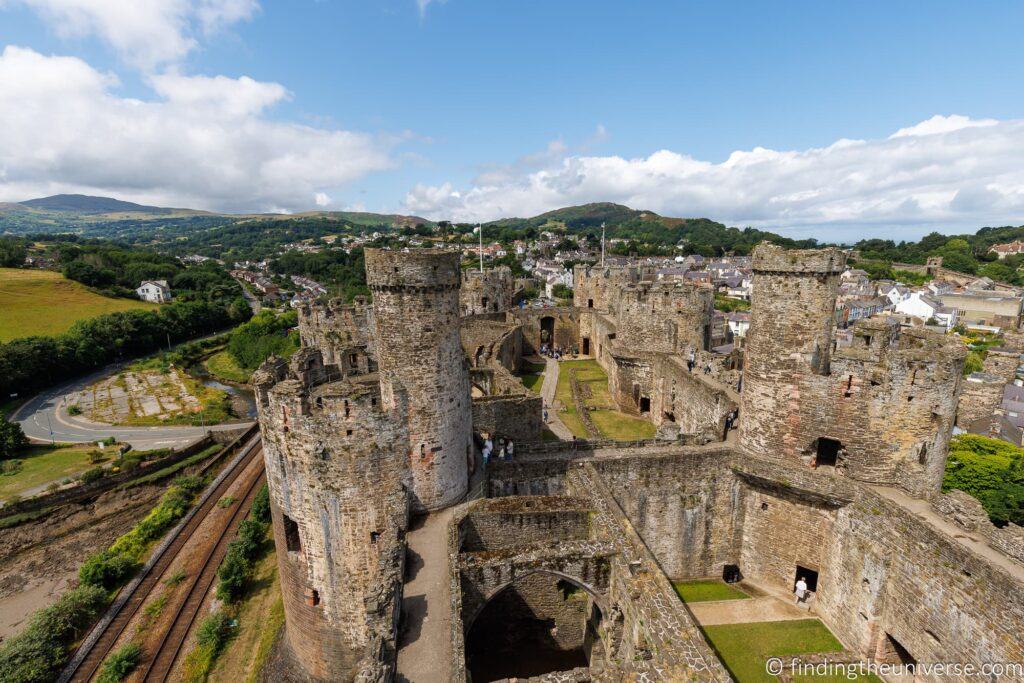
Finally, overnight in Conwy. Again, you might need to move some sightseeing to Day 9 depending on your schedule.
Day 8 Highlights: Snowdon, National Slate Museum, Llanfairpwllgwyngyll sign, Beaumaris Castle, Aber Falls, Conwy Castle
Day 8 Driving Distance: ~ 30 miles
Day 8 Driving Time: ~ 1 hour
Day 8 Accommodation: Overnight at (or near) Conwy. Again, this part of the trip still has you exploring the northwestern area of Wales, so you could choose one location for nights 6 through 8. If you choose to base yourself in Conwy, we recommend the following:
- YHA Conwy – just 10 minutes walk from the centre of Conwy, this well rated hostel offers great value rooms, some with private bathrooms. A large buffet breakfast is available, and there’s also a kitchen for guest use as well as a laundry, bar and cafe.
- Number 18 – a very highly rated family run bed and breakfast just five minutes walk from the castle. Rooms are all en-suite and breakfast is included.
- Bryn Derwen Guest House – a well rated centrally located family run guesthouse with en-suite rooms and breakfast included.
- Gwynfryn – this unusual hotel is found in a converted chapel just 300 metres from Conwy Castle. All rooms are en-suite and breakfast is available.
- The Erskine Arms – five minutes walk from Conwy centre, this Georgian coaching inn offers 10 en-suite rooms with breakfast included. There’s also a bar on-site serving good food and drinks.
- The Quay Hotel and Spa – found in the marina on the opposite side of the river to the town centre, this hotel offers en-suite rooms, some with gorgeous sea views. There’s an on-site restaurant and breakfast is included.
Day 9 – Conwy to Hay-on-Wye
Today it’s time to start heading back down south to complete our loop of Wales. Heading back to Cardiff via Hay-on-Wye.
Before you set off, make sure you visit any attractions you haven’t yet seen in Conwy and surrounds. National Trust members will likely want to check out Penrhyn Castle and Garden for example.
Now you have two different route options today, the first is heading along the northern coastline and the second is following an inland route south.
Both routes have you spend the night in Hay-on-Wye. Both routes are great and I’d check out the highlights along both to see which sounds better to you.
If you decide to follow the northern coastline, then your first stop will be Rhuddlan Castle. This is another of Edward I’s castles, which dates from 1277.
From Rhuddlan it’s a short drive to Rhaeadr Dyserth Waterfall, where a minute’s walk from the car park will reward you with a pretty view of a lovely little waterfall.
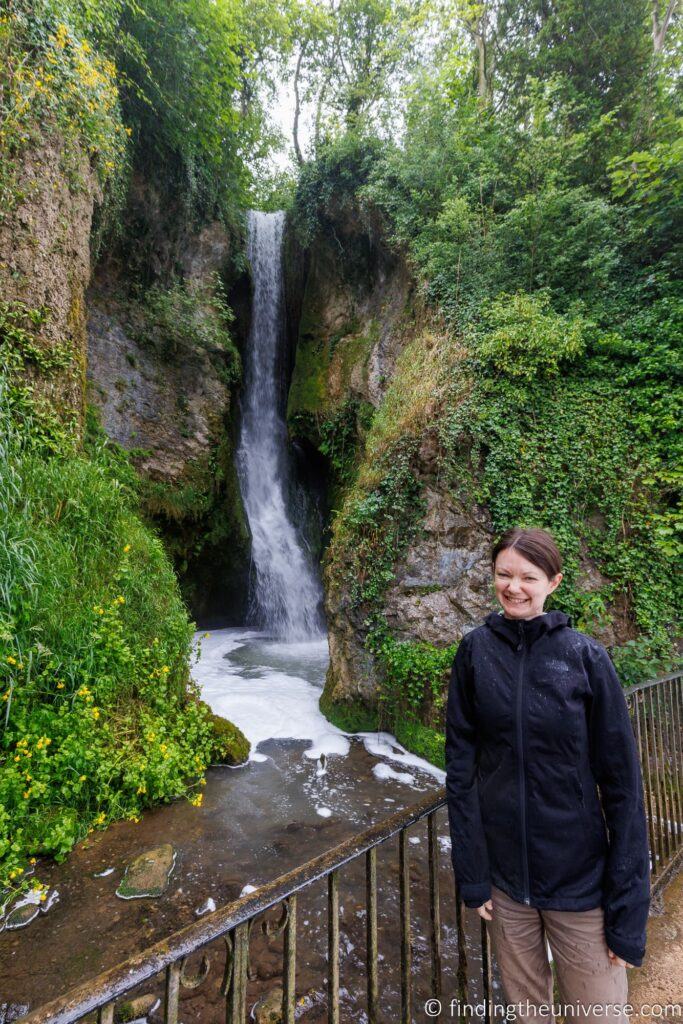
The next stop along the northern coastline that we recommend is St Winefride’s Well & Shrine, a site which has been welcoming pilgrims for over 1300 years. It’s also unique in that it’s the only pilgrimage site in the UK that was able to continue operating even during the Reformation.
The well itself is found at the location where St. Winefride was said to have been decapitated and then brought back to life. There is a pool here which is open at specific times of the day for people to bathe in.
It is said to have healing properties. There’s a small museum on site as well where you can learn about St. Winefride. A small fee applies for visiting.
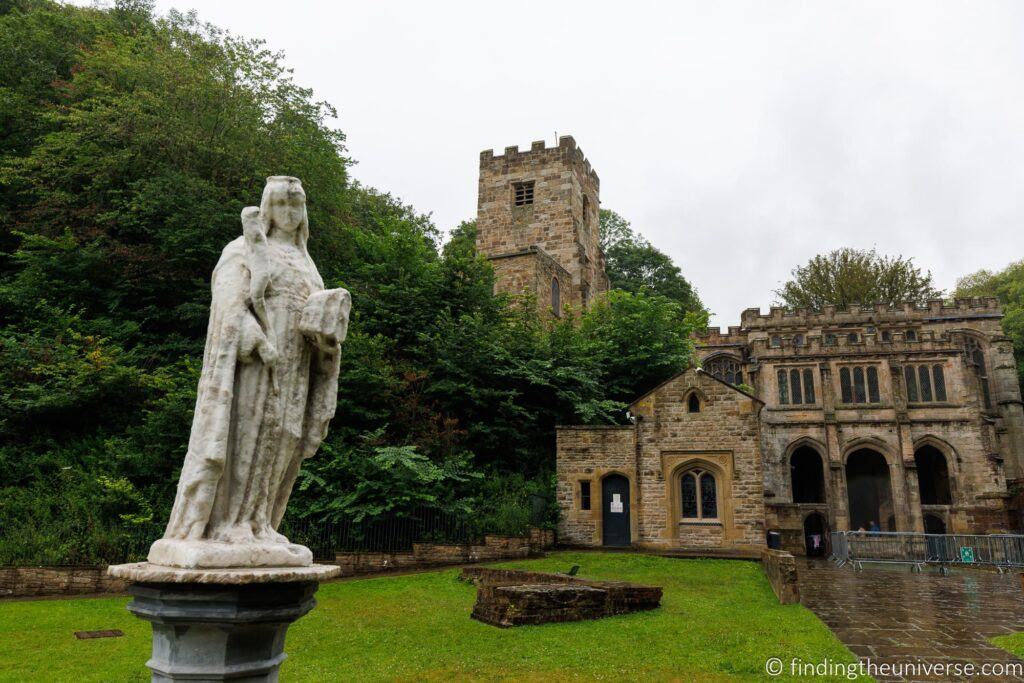
Finally, the last attraction on the northern coastline we recommend before you turn south is the ruinous Flint Castle. This is noteworthy as being the closest castle to the English border, and therefore the first to be built during Edward I’s campaign against the Welsh. Free to visit.
From Flint, you would head south passing through through Wrexham, Oswestry and Newtown until you reach Hay on Wye.
This northern coastline route takes about 3 hours without stops. This will definitely be quicker than the route below, even if parts of the journey have you leaving Wales.
A second option is to head south directly, skipping the northern coastline and instead visiting more of eastern Wales. Highlights along this route include Merion Mill, Pont Minllyn, Bryntail Lead Mining buildings, and the Elan Valley. This route takes about 3.5 hours to drive without stops.
For the inland route, head from Conwy down to Dolgellau, then out to Minllyn on the A470.
At Minllyn, take a break at Merion Mill, a wool crafting mill where you can peruse all manner of original products that would make for an excellent souvenir or gift. There’s free parking and a cafe on site as well.
We’d also highly recommend talking a one-minute walk to the entrance of the car park where you can see what remains of the beautiful old stone bridge which crosses the river here, Pont Minllyn.
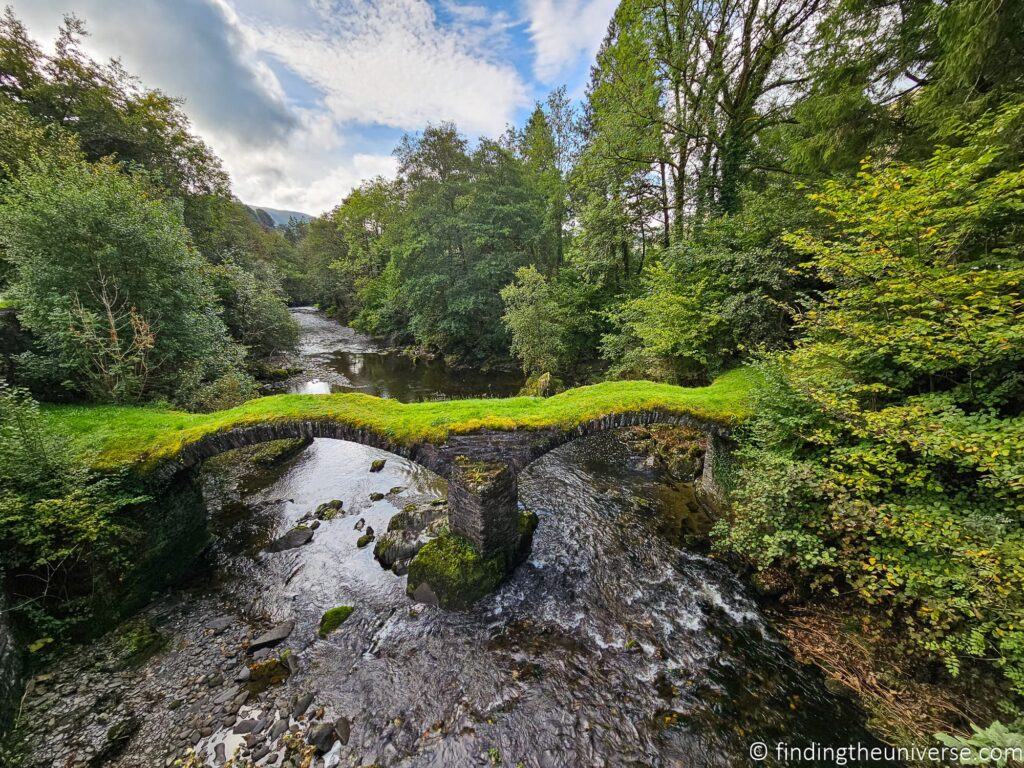
Now continue south towards Llandiloes. A brief detour will take you to the Bryntail Lead Mining buildings. Here you can see the remains of this former lead mining community.
There are also walking trails in the area if you want to stretch your legs. Free parking, and it’s just a couple of minutes’ walk from the car park to the site. More information on the official CADW site here. It’s free to visit.
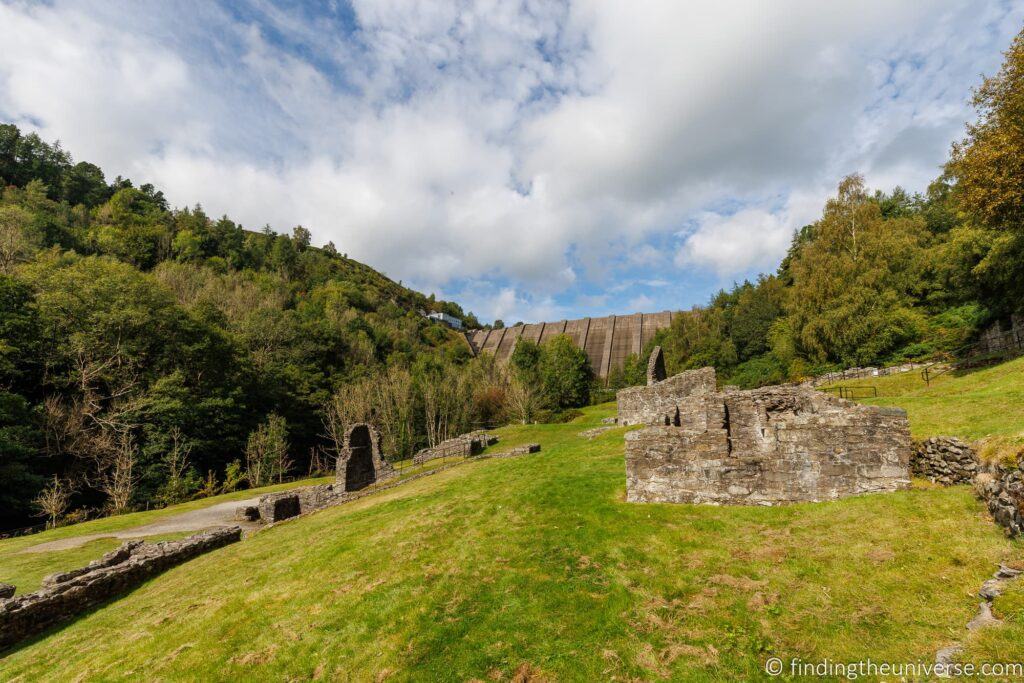
Continuing on, another good stop today is the Elan Valley. This seventy square mile area covers a range of hills, valleys and man-made reservoirs which form five lakes. These lakes provide drinking water for the city of Birmingham.
There’s a visitor center here where you can learn all about the area. The most popular activitiy here is to cycle around the reseviors on the Elan Valley Trail. Bikes are available for hire at the visitor center.
However, you can also walk or drive to a number of viewpoints if you prefer. Note the visitor center is free to visit but there’s a charge for parking.
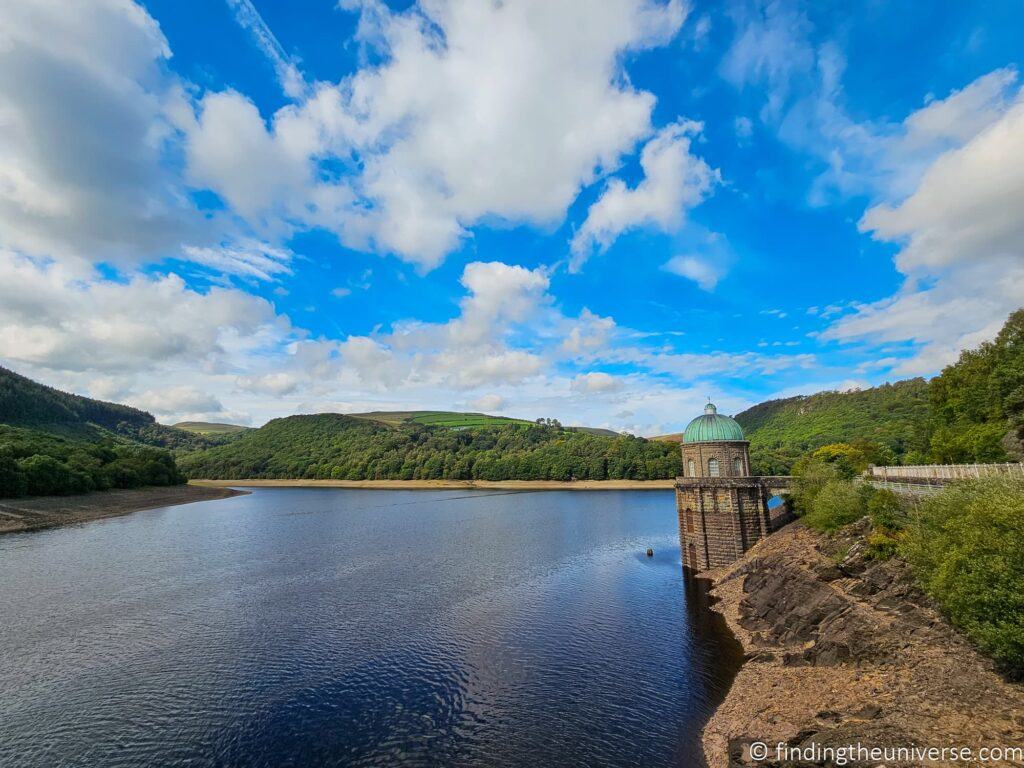
Finally, continue on to the beautiful town of Hay-on-Wye where you will be spending the night. This is right on the border of England and Wales, and the town is famous for its bookshops.
There are over twenty bookshops in the town covering pretty much every genre and style of literature, and both new and used books are available.
We highly recommend taking some time to wander the town and visit some of these bookshops before finding a nice spot for dinner and turning in for the night.
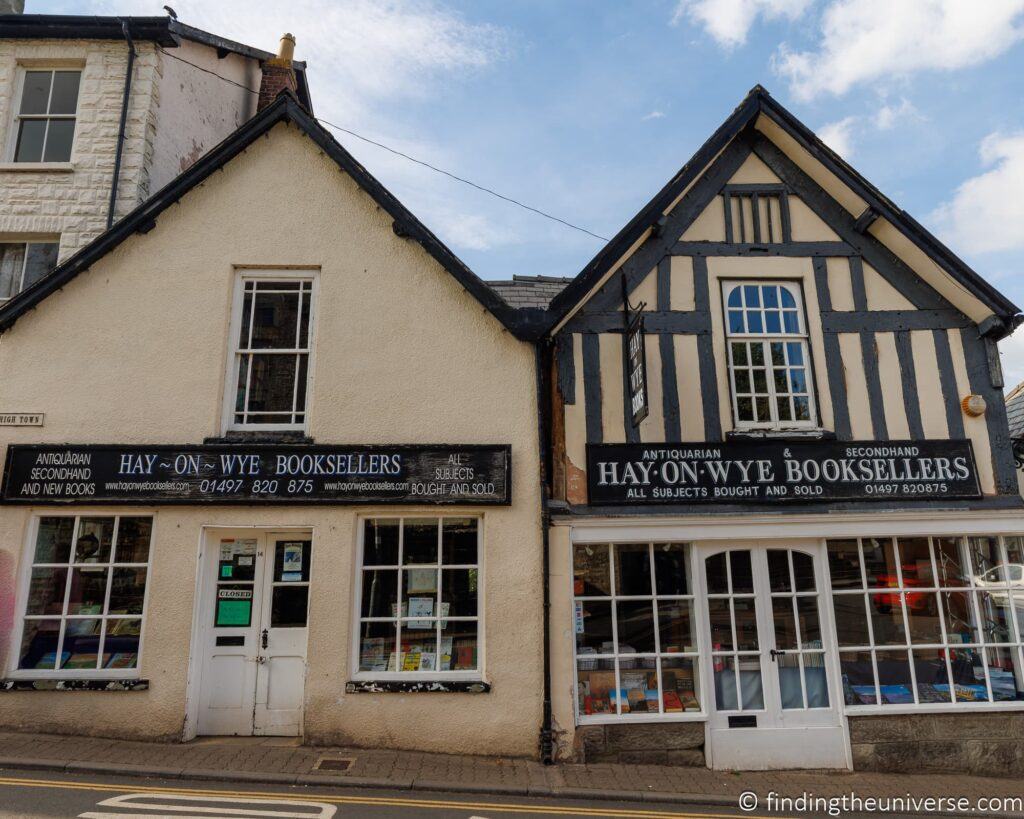
Day 9 Highlights: Merion Mill, Bryntail Lead Mining buildings, Elan Valley, Hay-on-Wye
Day 9 Driving Distance: ~ 140 miles
Day 9 Driving Time: ~ 3 – 3.5 hours depending on route
Day 9 Accommodation: Overnight at (or near) Hay-on-Wye. There are a few options to choose from in and around the village. We recommend the following:
- The Old Black Lion – voted best pub in the county, this beautiful 17th century inn has an excellent on-site restaurant and comfortable en-suite rooms. We had a lovely meal here and a good night’s rest. Breakfast is available.
- Seven Stars – this guesthouse is found in a 16th century building and now features eight lovely en-suite rooms. There’s also an indoor swimming pool and sauna. Breakfast is included.
- The Swan At Hay – this former Georgian coaching inn is now a 19 room hotel with 2 bars and a dining room. Breakfast is available.
- Baskerville House – found a few minutes drive outside Hay on Wye, this guesthouse offers comfortable en-suite rooms with breakfast included.
Day 10 – Hay-on-Wye to Cardiff
We have reached the final day of your Welsh road trip! Today you’re heading back to Cardiff where you can drop off your rental car (if needed) and then travel onwards.
How your day today looks will of course depend on your schedule. If you have an early train or flight, then you will want to head straight back to Cardiff, which is around a 90 minute drive away.
However, if you have time to spare then there are some good options for stops along the way.
First, head directly south along tiny country lanes from Hay on Wye to Llanthony Priory. This spectacular Grade I listed 900 year old ruin was once one of the greatest medieval buildings in Wales, and it flourished until Henry VIII put an end to the monasteries. Today the site is free to visit.
Continuing on to Cardiff, you have a couple of options. First, you may opt to visit the former coal mining village of Aberfan. This was the site of the tragic Aberfan disaster in 1966, when a spoil tip collapsed into the village, killing 116 children and 28 adults. There is a moving memorial you can visit if you wish to pay your respects.
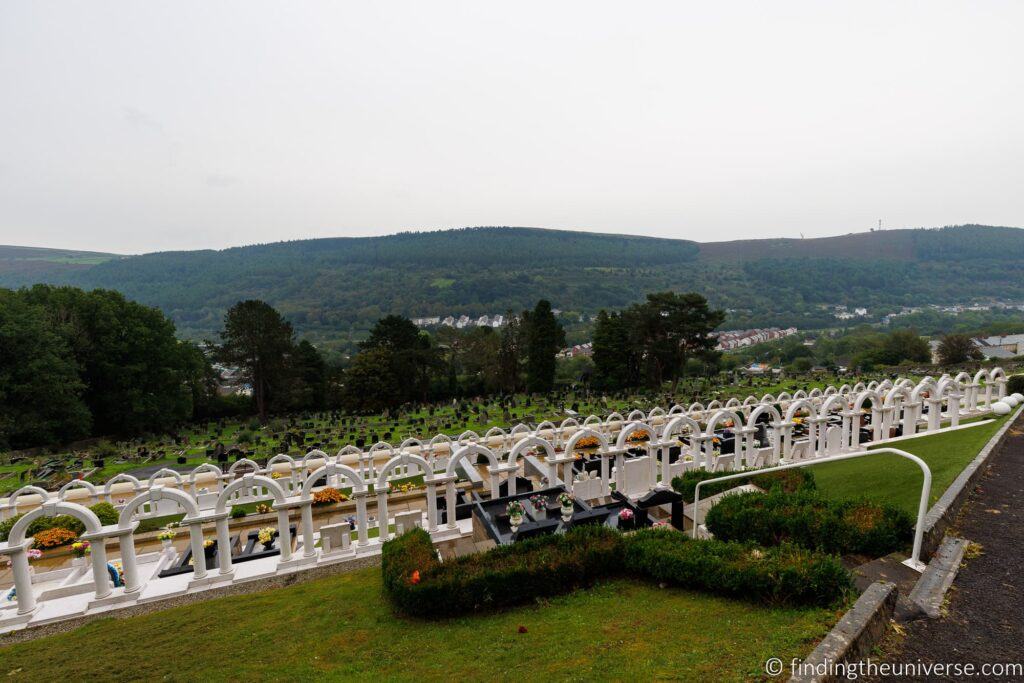
Finally, if you would like to see another castle, we can highly recommend dropping by Caerphilly Castle as you return to Cardiff. This 13th century medieval fortress was the largest in Wales, and in fact is the second largest in the UK, second only to Windsor Castle.
Covering 30 acres, the site features huge defensive walls, towers, gatehouses and a range of water defenses. It is truly a site to behold, and an excellent way to finish off your Welsh road trip. There’s a fee to visit, and it’s free for CADW members.
Now, on to Cardiff where this road trip wraps up! If you have more time in Cardiff, you can go and visit any of the attractions you didn’t have time to visit at the beginning of your trip.
Day 10 Highlights: Llanthony Priory, Aberfan memorial, Caerphilly Castle
Day 10 Driving Distance: ~ 65 miles
Day 10 Driving Time: ~ 2 hours
Day 10 Accommodation: You can stay another night in Cardiff if you wish, or in your onward destination.
Map of Wales Road Trip Itinerary
Here’s a map of the route to help you visualise where you’ll be going. You can see a full version of this map on Google Maps here, which includes all the highlights as well as accommodation listings.
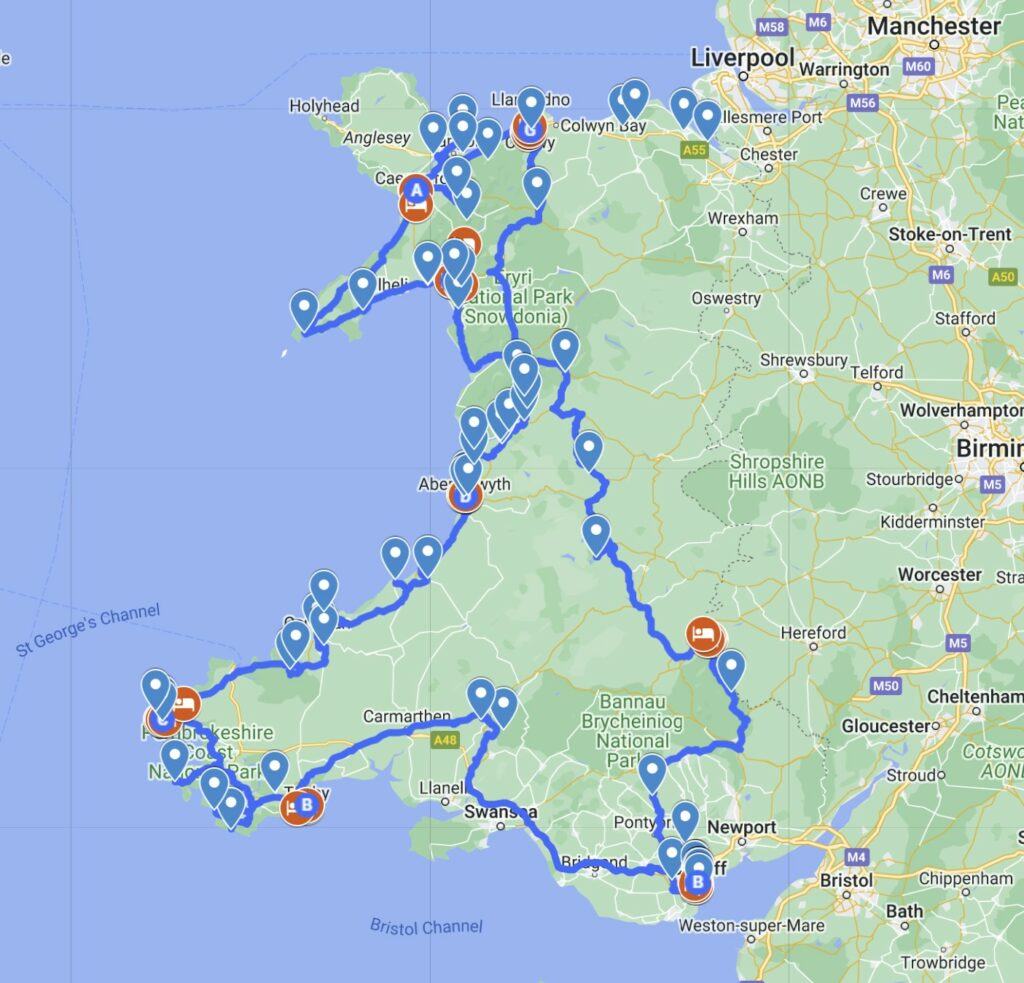
Wales Road Trip Itinerary Overview
Here’s an overview of the itinerary for reference.
- Day 1: Cardiff
- Day 2: Cardiff
- Day 3: Cardiff to Tenby
- Day 4: Tenby to St. David’s
- Day 5: St. David’s to Aberystwyth
- Day 6: Aberystwyth to Porthmadog
- Day 7: Porthmadog to Caernarfon
- Day 8: Caernarfon to Conwy
- Day 9: Conwy to Hay-on-Wye
- Day 10: Hay on Wye to Cardiff
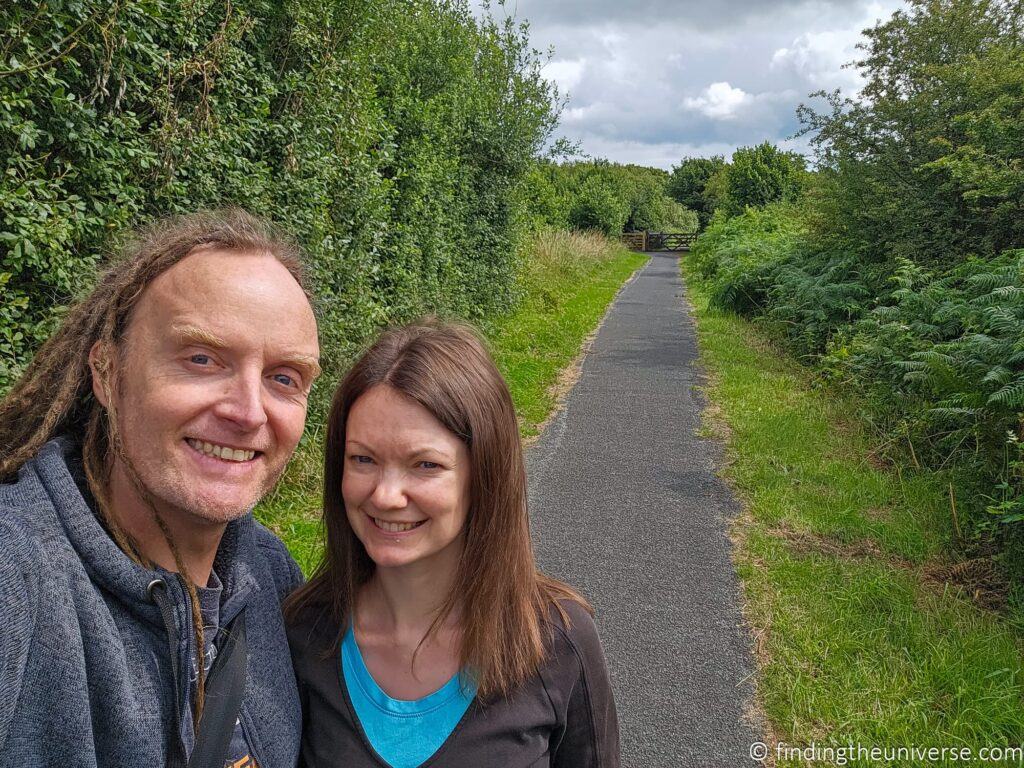
Further Reading
And that’s it for our detailed Wales road trip itinerary! We hope you found this guide useful. We also wanted to share some more resources we think might help you with planning this and future trips in the UK.
- If you’re looking for more road trip inspiration in the UK, check out our North Coast 500 planning guide and North Coast 500 seven day itinerary
- If you’re heading to Scotland, check out our 2 day Edinburgh itinerary, our Glasgow and Loch Lomond itinerary, our guide to the best day trips from Glasgow, our guide to things to do in Edinburgh, our itinerary for Skye and the Highlands, our guide to the best day trips from Aberdeen, and our guide to the best day trips from Edinburgh to get you started.
- We have a two week UK road trip itinerary and a one week UK road trip itinerary
- We also have a one week Cornwall itinerary
- If you’re not familiar with driving in the UK, see my guide to driving in the UK for helpful tips.
- We have guides to many cities in the UK you can check out! See our guides to things to do in Manchester, things to do in Stratford upon Avon, things to do in Bristol, things to do in Portsmouth, tips on a weekend in York, tips on Visiting Oxford on a Day Trip, and things to do in Cambridge to get started
- If you’re looking for a guidebook for your trip, check out the Rough Guide to Wales
And that’s it! Have you ever visited Wales? Do you have anything you’d add to the above? Just let us know in the comments below, and safe travels!
